#actors playing a character in the process of acting in a situation full of conflict displaying that conflict so well
Explore tagged Tumblr posts
Text






















They think we're fools. So that's what we'll be. Just pretend you're crazy about him.
First Kanaphan as KANT, Khaotung Thanawat as BISON, Joong Archen as FADEL and Dunk Natachai as STYLE THE HEART KILLERS | EP. 7
#the heart killers#the heart killers the series#first kanaphan#khaotung thanawat#joong archen#dunk natachai#kantbison#fadelstyle#lana.gifs#thk.gifs#extremely fascinated by khaotung's acting in this scene#actors playing a character in the process of acting in a situation full of conflict displaying that conflict so well#despite the act being convincing enough for the other characters to buy it... i like it here#edited subs a bit with style's line bc i felt like it worked better said like that#asianlgbtdrama#esmetracks#userrlaura#rinblr#forfive#userbon#usersasa#useragatha#userrzey#tuseryoo#tusermona#tusersilence#tuserhidden#tuserjovana#userspicy#ninisdarlings
283 notes
·
View notes
Text
Episode 10: P-P-P-Chan! He's Good For Nothin'

Hey there everyone, sorry for the one week delay between posts. We are now up to the tenth episode in the first season of Ranma 1/2, and with it the last episode of Ryoga’s introductory arc. Once again, this is an episode that I’m not entirely sure about how it will play out, so I’ll see you all in the next paragraph once I’ve finished the rewatch.

You know, I hadn’t expected the ending to this Ryoga-centric arc would end with a nothing little story about him being kidnapped by a rich family. It’s not necessarily a bad thing, it’s just...underwhelming?
So, what exactly happened? Well, the episode starts right where the last one left off, with the revelation that the tiny black piglet Akane had found is in fact Ryoga under a curse. He tells Ranma how it happened. In chasing Ranma and his dad to China, Ryoga was lost for ages, searching the enormous country for his quarry. He’d almost caught up by getting to Jusenkyo, only to be hit by a red-haired girl running after a panda. The blow knocked him off a cliff and into a spring, cursing him.
To make things worse, the panda later found him and took him to the guide of the springs, who tried to cook Ryoga into dinner. Since then, traveling has become even worse, since his curse frequently embarrasses him or makes his journey more dangerous. Ranma gets indignant, though. Ryoga only blames him for this because he’d gotten there because he was chasing Ranma, but clearly whoever knocked him into the water deserves far more blame, along with the panda that tried to cook him.
Those words barely left Ranma’s mouth when the door to the baths opened and Ranma’s dad, in panda form, entered before noticing there were people there, and left. Ryoga, looking at Ranma’s cursed form, puts two and two together, realizing that Ranma was in fact also the one who cursed him. His rage flares up once again, but to avoid a naked fight Ranma uses cold water to activate Ryoga’s curse, making him a cute and harmless piglet.
Well, maybe not harmless. They fight anyway, and Ryoga runs out to Akane, who defends the tiny animal against the angry Ranma. To Akane, it just looks like Ranma is being a colossal jerk. Oh, and she kisses Ryoga on the snout, because she just thinks it’s a cute animal, unaware she’s kissing a hormone-laden teenage boy. She even takes him to bed with her, cuddling up with him like he’s a stuffed animal. She wonders why Ranma was so angry with this piglet, only coming to the conclusion that maybe he was jealous.
Whether it’s jealousy or not, Ranma is not having any of this nonsense. He sneaks into Akane’s room at night with hot water, ready to force Ryoga to change back and get out of there. But Ryoga avoids that and fights back, leading to Ranma falling onto Akane face-first, almost making it look like he tried to hug her in her sleep. This wakes her up, and after a moment of them just staring into each other's eyes really cutely, she goes ballistic on him for sneaking into her room and night and trying to get in bed with her. Ranma tries to defend himself, but doesn’t do a good job of it, and she sends him flying out the window.
At breakfast the next morning, it turns out everyone heard the ruckus, and assumed it was Ranma sneaking into Akane’s room to, uh, get busy. Nabiki doesn’t seem to have too much of a problem, aside from the noise level, while Kasumi disapproves of them doing that kind of thing while still underage. Their father, however, thinks Ranma doing something like that is a good idea, and gives him encouragement. Ranma is mortified, hating that everyone thinks he was trying to do something that he absolutely wasn’t.
Akane has nicknamed Ryoga in his cursed form P-Chan and basically adopted him as her pet, even taking him to school to show her friends. Ranma tries taking him to get him uncursed so they can talk, but Ryoga runs away leading to shenanigans. Eventually, with Hiroshi’s help, Ranma gets the piglet and hot water’s him, and they talk at the place where their fight had started before. Ranma points out that Ryoga has been so desperate to fight him, but now he’s running away.
Ryoga’s response is pretty simple. This curse has ruined his life, hence his intense anger for Ranma. But with Akane’s affection, and maybe even love, Ryoga is actually happy. He wants to just be P-Chan and stay with her, thinking they have some mutual affection for each other. Ranma tries to disabuse him of this notion, but that just makes Ryoga think Ranma loves her too. This doesn’t get a ‘No’ from Ranma, but instead a “Shut up, fight me!”
Too bad Akane shows up just as the sprinklers come on and turn Ryoga back into a piglet, leading to her once again thinking that Ranma was bullying her pet. In the ensuing chaos, Ryoga runs away and ends up getting picked up by a rich couple, who basically abduct him. They pamper him, but he just misses Akane, who is searching desperately for him. Even though he still doesn’t like the situation, Ranma tries to cheer Akane up. Oh, and the rich couple find out Ryoga is really a teenage boy, but they don’t mind and want him to be their heir.
As Ranma and Akane are walking home from school, Ryoga is trying to escape just as they pass by. Ranma jumps in to stop the servants of the estate from taking the pig back, but they turn out to be quite strong and they have weapons. Ranma struggles a little in the fight, but Akane helps and they win, taking P-Chan back. The rich couple accept this, walking away as they think that they’ll find some cute thing to replace him. In doing so, they pass Ranma’s dad in panda form, who is trying desperately to catch their attention by being adorable, but it doesn’t work.
That night, Ranma wonders why he even got Ryoga back for Akane, considering he doesn’t want him staying there with them. Then he tries sneaking into her room again, but this time she’s awake and alert, quickly knocking Ranma out again. The next morning, everyone is talking about Ranma doing it two nights in a row, and he is still embarrassed. The end.
This feels like a very patchwork episode. It resolved the cliffhanger from last week, introduced a dynamic that will be seen for basically the entire rest of the series (P-Chan and Akane), and then did a small story of him being kidnapped by rich people. There were definitely things I liked about it, but for the ending of Ryoga’s introductory arc, it definitely felt weaker than it should have.
Uh, let’s see...stuff to talk about...Well, I guess the big thing to tackle is something we’ll have going forward. P-Chan is both Akane’s pet and Ryoga Hibiki, and she doesn’t know that. To her, he is just an adorable little pig. Thing is, this feeds into Ryoga’s need for affection which is desperately unfulfilled, and causes him to fall in love with her. Which must be weird for her, because she barely knows him.
Then you’ve got Ranma, who is actually aware of what’s going on. It must be galling for him to have to watch Ryoga, who is normally the unluckiest person in the universe, stumble into what is kind of the perfect set-up. It makes sense that Ranma’s immediate reaction is to reveal Ryoga’s inadvertent deception so everyone knows what is happening. The fact that keeps failing means that he looks more and more like a creep, which just makes it worse for him.
The ethics of all of this are honestly kind of interesting. Is Ranma doing the right thing? After all, he’s going to big lengths to try and unmask Ryoga, breaking into Akane’s room at night, and even if he succeeds it will hurt both Ryoga and Akane in the process. But shouldn’t Ryoga be stopped? Sure, being Akane’s pet is very fulfilling for him, but she doesn’t have full knowing consent for everything going on with that. There is, after all, a good reason he doesn’t want her to ever know who he really is: she could possibly find that breach of her trust unforgivable. It’s messy stuff, and while I don’t necessarily love it, I am seeing more to it than I have before.
That being said, I am not really a fan of some of the conflict this subplot generates. I do not really enjoy Akane and others getting angry at Ranma and calling him a pervert, not believing any of his attempts to explain what’s really going on. I understand why, but as the viewer I know he’s actually right, and that creates a kind of uncomfortability that I’m not really here for.
Part of me likes both the scenes where the family has drawn the completely wrong conclusions to the sounds coming from Akane’s room. It’s funny, and I didn’t expect it. That said, there is some ambiguity to how they talk around what they mean. Do they think Ranma sneaked into Akane’s room so they could consensually bang? Do they think Ranma went up for a secret midnight rendezvous where he tried to talk her into doing sexy stuff? Do they think Ranma was trying to do certain things to Akane, whether she wanted him to or not? I genuinely don’t know, and some of those options are something I find hard to just wave off, especially when Akane’s dad is so supportive.

Hey, first time in a few weeks with a new character getting the focus! Well, not a ‘new’ character per se, but someone I haven’t done a spotlight on before: Akane’s father Soun Tendo. The head of the Anything Goes Martial Arts Dojo is definitely the most tertiary character I’ve covered so far. He hasn’t gotten a lot of development, and while the occasional episode with give him more to do later on, in general Soun is definitely a background character, far more than his friend Genma Saotome.
For voice-acting, both of his actors do a very similar thing, and they do it well. They give Soun this baritone, serious, kind of traditionally masculine and fatherly voice, which they make more humorous by going over the top with how sentimental and affectionate he is. In Japanese he’s played by Ryusuke Obayashi, who hasn’t done a lot of other voice acting work, while in English he’s played by David Kaye, who apparently has played Megatron (I don’t really watch Transformers) and is the announcer on Last Week Tonight with John Oliver, which is crazy to wrap my head around.
I don’t actually know how much blood I can get out of this stone. Soun loves his daughters dearly, though he can still annoy them by making decisions without consulting them first. His wife is dead, though how much that contributes to his current nature we don’t really know. He trained with Genma, becoming such good friends to the point where they made the promise to join their families together one day, and doesn’t seem to have any problem hosting Genma and Ranma for free.
Speaking of, he’s really well off, especially compared to his old friend Genma. The guy owns a pretty large chunk of the block, and while there are occasional comments about the freeloaders from Nabiki, it doesn’t seem as though taking two extra mouths on to feed has really affected his finances. I’ve got no clue where his money comes from. Inheritance? Something marital arts related?
Speaking of, presumably he’s a pretty good martial artist himself. Perhaps not as good as Genma, since he doesn’t train as much these days, but you’d think Soun is a pretty strong dude. As far as I can recall, he never enters any fights, which feels like a bit of a waste. In general, I feel like Soun is a bit of missed potential. I enjoy how he’s so comfortable being emotional, especially compared to some of his friend’s toxic masculinity, and there are occasionally moments where it seems like he tries to help mentor Ranma that I like. But on the whole, Soun is mostly a background character. He has been so far, and I don’t remember him really stepping outside of that too much. I can only help my memory is once again mistaken.

Okay, so, where do I rank this episode? Aside from the parts I liked, on the whole this was a bit of a slog. It wasn’t bad necessarily, but the back half especially was so dull for me that I kept mentally checking out, it was difficult to pay attention. That’s why I’d honestly put it at the bottom of what I’ve covered so far.
Episode 7: Enter Ryoga, the Eternal ‘Lost Boy’
Episode 9: True Confessions! A Girl's Hair is Her Life!
Episode 2: School is No Place for Horsing Around
Episode 6: Akane's Lost Love... These Things Happen, You Know
Episode 8: School is a Battlefield! Ranma vs. Ryoga
Episode 4: Ranma and...Ranma? If It’s Not One Thing, It��s Another
Episode 5: Love Me to the Bone! The Compound Fracture of Akane's Heart
Episode 1: Here’s Ranma
Episode 3: A Sudden Storm of Love
Episode 10: P-P-P-Chan! He's Good For Nothin'
Hopefully, next week we get something better as we move on to a new arc, which introduces a character I didn’t think appeared until quite a while later in the series. Come back next time when I’ll be talking about “Ranma Meets Love Head-On! Enter the Delinquent Juvenile Gymnast!” See you then!
#episode 10#P-P-P-Chan! He's Good For Nothin'#ranma 1/2#ranma saotome#ryoga hibiki#akane tendo#p-chan#soun tendo#anime analysis#anime rewatch
6 notes
·
View notes
Photo


On the Season 2 finale of The CW series Roswell, New Mexico, while most of the attendees of CrashCon survived unscathed, many of the beloved characters were faced with choices in their own lives that forced them to make decisions that could set them on very different life paths in Season 3. How any of it will ultimately play out, only time will tell, but for now, there’s plenty of time to speculate while waiting for new episodes.
And in the meantime, we got on the phone to chat 1-on-1 with showrunner Carina Adly MacKenzie about tying up all of the family threads this season, shooting the last two episodes at a carnival, the scene that had to be cut, digging deeper into Max’s alien side, which character is most content with who they are, the importance of the abortion storyline in Season 2, how the plan for Season 3 will evolve, and what fans should make of that shocking final moment.
Collider: A lot of threads get tied up in this season finale, and you really pulled together a lot of the family storylines this season, from the Ortecho family, to the aliens and their family history, to Maria (Heather Hemmens) and her mother, to the Manes men, and even Cameron (Riley Voelkel) and Charlie (Jamie Clayton). Was that something that was always a really apparent theme for this season, or was that something that just happened, along the way?
CARINA ADLY MacKENZIE: That just happened. My only experience, other than working on Roswell, was working on The Originals, which was a show about family, so I think that my storytelling inclination is always in that direction. I also think that the age of the characters, when everybody’s coming into their 30s, that’s when you start to build your family, and you start to examine where you came from and decide where you want to go, as far as the people that you surround yourself with. And so, it just came about organically. I like telling family stories. I think that there’s a complicated nature to the people that you’re stuck with and who you were put here with, and figuring out how they fit in your life and whether they fit in your life is an ongoing process.
These last episodes have a lot going on, between a carnival, a fire, and all of these big things happening. What was it like to set these last two episodes in a carnival, and what were the biggest production challenges in pulling all of that off?
MacKENZIE: Well, I’m glad that we did it when we did it because I don’t think we’d be able to do it in a post-COVID world. Honestly, it was easier than I thought it was gonna be. We had a real carnival team come in and set up the carnival. The cotton candy truck was working and you could go get a fried Oreo in the middle of work. [Michael] Vlamis and I rode the rides, during a break. It was not as hard as it seems. We did have to cut one scene that we shot on the Ferris wheel because it turns out that it’s not that easy to shoot on a Ferris wheel in the daytime. I was like, “But I’ve got so many favorite shows that have Ferris wheel scenes,” and I realized that most of those are in the night because you don’t have to worry about these massive shadows getting cast over your actors, while you’re trying to shoot. But really, it was pretty seamless. Our crew worked really hard. Everyone was in really good spirits and really good moods. We shot all night, on weekends, trying to get that done, but everybody was very happy to be there. It was cool. It was fun. It was a little detour into childhood, riding the Sizzler.
Did you have to entirely cut that Ferris wheel scene that you mentioned, or did you just have to move it to a different setting?
MacKENZIE: No, we had to cut it entirely. After it was shot, we looked at it and it didn’t look like our show. It was a scene between Kyle (Michael Trevino) and Steph (Justina Adorno), so I was sad to see it on the cutting room floor, but it’s hard to strap a camera to a Ferris wheel and send it on its way.
Having CrashCon does pay homage to the original series and their UFO Convention. Was that something that you intentionally wanted to acknowledge?
MacKENZIE: Yeah. UFO Con is a huge part of the culture in the real Roswell, so we definitely wanted to get there, eventually. It was a fun journey, deciding how to tell that story. Comic Cons tend to be inside with a lot of people standing in lines, and they’re not that pretty. So, we wanted to figure out a way to tell the story of this convention, but make it look cool and make it pretty. The carnival idea came up, as a closing night carnival, and it was super fun to film. We had a couple of very, very long, very, very late, and very, very cold nights at the fair, but it was fun for the crew. I think everyone was in super good spirits, and it was a fun way to end our run for the season.
Just when Max (Nathan Parsons) really does have everything that he’s wanted, he seemed as though he was willing to risk it all, in order to keep pushing for answers about his alien side. Why did you want to dig deeper into that, and why is he willing to put everything else on the line, right now, in order to get those answers?
MacKENZIE: When we meet with Max in Season 1, he has very much rejected his alien side. He’s got this whole never be extraordinary rule in his life. Knowing Liz (Jeanine Mason), and being in a relationship with Liz and seeing how inquisitive she is and how much she strives to solve the mysteries of the universe, has really affected him. I also think that, for a long time, he was willing to settle for a life that he was only half living, and seeing Isobel (Lily Cowles), in particular, really come into her own this season, and learn about her background and who she is and who she wants to be, has really influenced him. He’s got a curiosity that he just can’t satiate. Ironically Liz does, too, but their interests are not aligning.
By the end of this season, who would you say is most content in knowing what they need to do next?
MacKENZIE: I think a person who is most content, at the end of the season, is Alex. Losing his father, his renewed relationship with his brother, and the ongoing coming out process that he’s been experiencing, has brought him to a place where he’s figured out a way to be who he is. I think that we’re gonna see him really blossom next season.
I love that you also were able to not only have him find his voice figuratively, but literally, as well, with the song that he sang (called “Would You Come Home”).
MacKENZIE: Thank you. I’m really proud of that song. I wrote it with Leslie Powell and Charlie Snyder, who are really phenomenal songwriters. I’ve been writing songs for a long time, and this is the first time anyone’s ever actually heard one. It was really cool to put ourselves into Alex’s shoes and to direct Tyler in the performance of that, when we were in the studio. I love the way that the montage came together, and I’m very proud of it. I’m really excited for it to be out there. We’re going to release it on all of the various platforms, and all of my royalties are gonna go to the Trevor Project. Hopefully, it’ll do some good for the character and some good for the world, ultimately.
I also have to commend you on the whole abortion storyline this season. Abortion is clearly a topic that TV shows tend to avoid, and when shows do take that risk, they also tend to never say the word. Do you think that this being a sci-fi show and the character being an alien helped, in being able to explore that, or do you think that you would have been able to do that anyway?
MacKENZIE: I think I would have been able to do it anyway. I actually think that it was really important to tell that story in a very human way. The big conflict that came up was the amount of blood that we saw in the episode. There was a suggestion from the network, at one point, where they said, “Can you make the blood iridescent? Can you make it look alien and put the same effect on it that you put on the pods and on the glass?” And I dug my heels in really hard and said, “No, it needs to look bloody. It needs to look ugly. It needs to look like an act of violence. Forcing a woman to essentially perform an un-medically supervised abortion is an act of violence.” And ultimately, I’m really grateful for the studio and the network’s support in that. It was important that it felt very much like a human moment because that’s how we told it. We wanted to say, “Okay, what does this really look like? What does it really feel like, to be a woman in a desperate situation without access to the care that she needs?” I’m very, very proud of that storyline. It was hard and it was scary, but I think that we told it with a lot of love. I was very, very proud of Lily and very proud of Nathan. It was tough, but it was definitely worth it.
I’m guessing that you had a plan for Season 3, before you knew how the world would be changing. Will you be able to hold onto what you wanted to do for the third season, or are you thinking about and re-evaluating everything that you had planned to do?
MacKENZIE: Well, interestingly enough, the writers’ room took a break before George Floyd’s death. When we took a break, we had sketched out an entire season that was built around racism in the police department in this small town. And so, we are looking at that story with new eyes. We’re still gonna tell the story, but the pressure is on, more than ever, to get it right because it feels like the world is tuned into that station right now. So, we’re re-evaluating that, on our storytelling side, and obviously, we are also paying a lot of attention to how things evolve, as far as how we can tell our stories safely. We have a lot of contingency plans for how to sketch out a romance, if characters can’t be touching and kissing, as much as normal. And if we can’t pack our diner and our bar set full of extras, how do we tell stories in those spaces? One of the things that I learned, working on The Originals, from Michael Narducci, who was the showrunner over there for awhile, was that no matter what happens on set, when you’re the showrunner, even if it’s not your fault, it is your problem, and that’s how we’re approaching storytelling. The virus is frustrating. It’s not our fault and it’s annoying to have to re-evaluate the way that we tell stories, but our cast and crew’s safety is really, really important. And so, we are trying to creatively write our way out of a difficult situation, as every writer in town is trying to do right now. As an industry, we’re just gonna have to have to evolve and our audience is gonna have to evolve a little bit. We’ll manage.
Obviously, the end of the finale has a shocking moment, in regard to the aliens. What should we make of that? Is that something that will also be a big part of the next season?
MacKENZIE: Yeah, we’ve got a new character, and he’s around for the long haul, Farmer Jones. He’s gonna have some answers, and he’s gonna really take what the characters think they know about where they came from, why they’re here, and who their families were, and challenge those ideas. Jones’ story of what happened in 1948 is very different from Nora and Louise’s take on the story. We dug into Michael and Isobel’s family in Season 2, and I think it’s time that we do a little exploring with Max and make up for all of that work that Nathan was not doing, at the beginning of Season 2, and put him to work twice in Season 3.
~ CoIIider
20 notes
·
View notes
Photo

“Designated Driver” | Directed by Michael Offer, Cinematography by David Klein
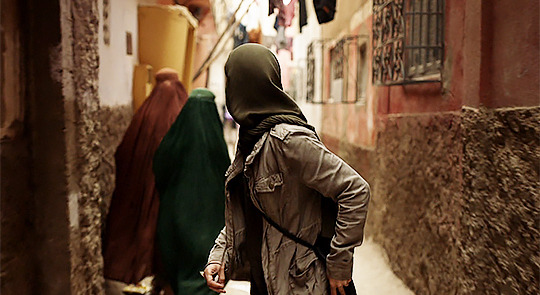
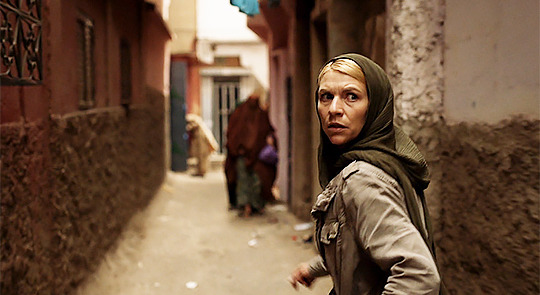
Sara: If I had a dollar for every Homeland episode that opens with Carrie speed-walking while looking over her shoulder every four seconds… I would have about ten dollars.
Gail: The imagery of Carrie looking over her shoulder is very reminiscent of the pilot episode. The closer we get to the end of the show, the more it feels like we have come full circle.
Ashley: Hi everybody, I’m joining Director’s Chair for the very first time because I’m feeling left out. I have no idea what I’m talking about. Anyway, Carrie’s paranoid, and rightly so, but it’s not paranoia if the guy you’re in love with just stuck a needle in your neck.
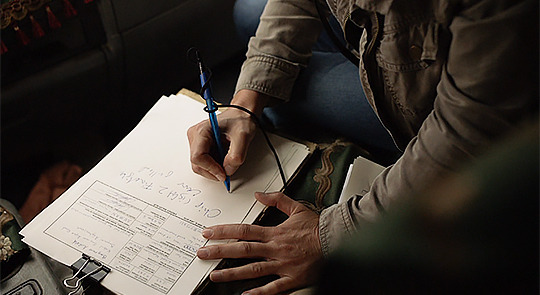
Sara: I had to take a screenshot of this because this is Claire’s actual handwriting, and long-time readers of this website will know that it seriously bugs me when they try to pass off someone else’s handwriting as Carrie’s. Anyway, this is the real deal, people.
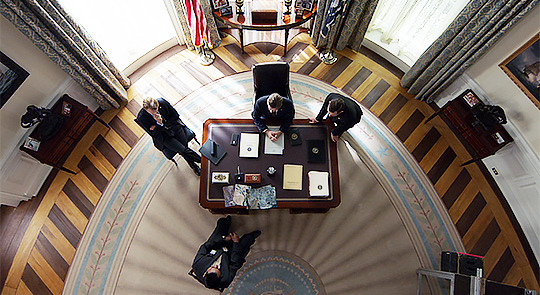
Gail: Another scene that shows a character versus a gang of three. Here the Pakistan Ambassador is up against Hayes, Zabel and Wellington... or is he? Wellington has inched closer to the inner circle of trust, but hasn’t quite made it behind the desk yet. If Hayes represents the center, only Zabel is on his side, while the both the American flag and Wellington are not.
Ashley: This shot, from above, has the same feeling of watching a bomb about to drop. The desk is the target. Will anybody in this room survive the fallout of what’s coming? (Please let it be Wellington.) (What even is coming?)
Sara: I love this shot because of the body language of the four men. Hayes and Zabel are both leaning forward in aggressive stances. Linus has his legs crossed, hand to his chin, thinking of new ways he’d like to be swallowed whole. The ambassador leans back, sort of resigned to this entire clusterfuck.
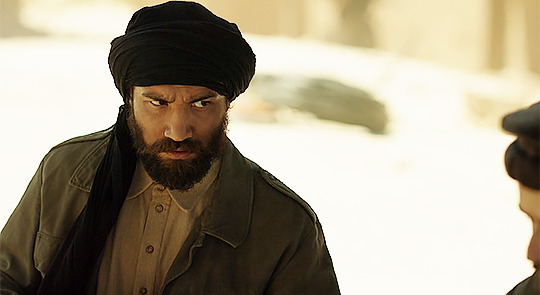
Ashley: The look on Balach’s face is so… everything. The furrowed brow, clenched jaw, and the intensity of his eyes — he’s barely holding it together, and his expression is pure murder.
Sara: I love this actor who plays Balach (Seear Kohi). He has been so great all season. I finally figured out this week that he looks surprisingly similar to Donald Glover. It’s been bugging me for weeks.
Gail: Balach is not faring as well as advisor to his new boss, (ugh) Jalal, as Wellington is to Hayes. I love the angle they chose for this scene. We see Balach from above and it gives the impression that he is looking down at Jalal, which based on his point of view, he most certainly is.
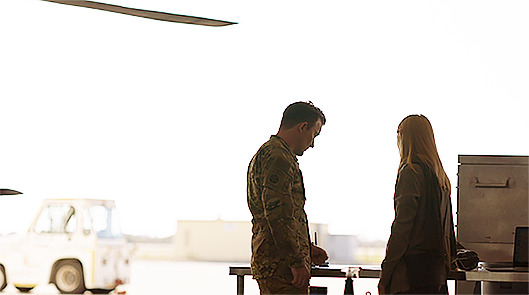
Gail: Carrie is back in the same place where President Warner thanked her and recognized her for all that she has done. Feels poignant that she shares this moment with Worley back at Bagram. He put President Warner in that helicopter and indirectly, so did she.
Sara: IJLTP.
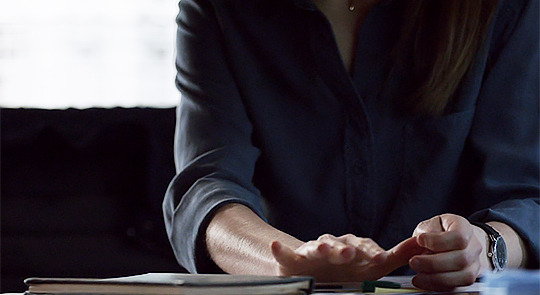
Sara: I feel like Jenna’s entire storyline really paid off this episode. I loved this detail of her hand shaking when Mike mentions the ops team in the Pakistani jail.
Ashley: Jenna’s been a wildcard all season and this episode humanized her in a very real way. I don’t want more Homeland, but I would be interested in Jenna’s story moving forward. So she’s probably gonna die.
Gail: Jenna’s got a long way to go in her training at the Carrie Mathison Spy School if a little treason gets her this nervous.
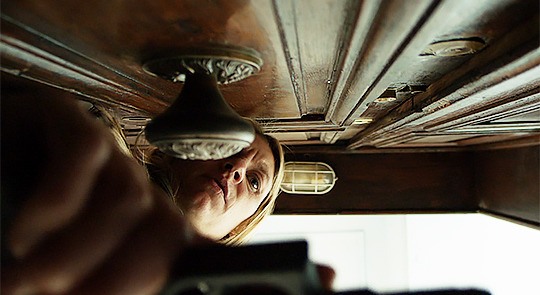
Sara: This is such a cool shot. There is an identical one of Quinn in “Iron in the Fire,” which was also directed by Michael Offer.

Sara: This shot reminds me of two things:
that moment in the cartoon How the Grinch Stole Christmas when everyone wakes up and their houses are completely bare.
that moment in “Super Powers” when Carrie paces back and forth, weighing her next move and hesitating, after Jonas leaves.
Everything this season is reminding me of something else, not in a bad way!
Gail: It reminds me of a surveillance shot with the camera mounted up high, giving a full view of the room. We don’t know it at the time, but maybe this is a subtle nod to Carrie being under surveillance while looking for Yevgeny, who finds her with Arman, her designated driver, a short time later.
Ashley: This reminds me of “A False Glimmer,” actually. Carrie returning home to her apartment, mostly expecting Jonas to be gone, but calling his name anyway — ultimately opening a closet to find his things still there; and she’s reassured of his presence. She didn’t expect to find Yevgeny here, but he’s left nothing. The disappointment, to me, reflects her relief at finding that Jonas hadn’t left.
Gail: Ugh, Jonas.
Sara: Yay, Jonas.
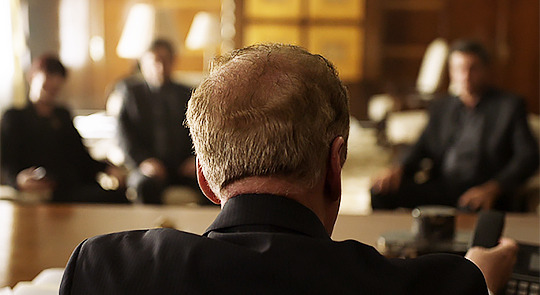
Sara: I love the reveal of the other Russian officials seated around the ambassador, watching his phone call with Saul. It’s such an ominous setup.
Gail: Such a great reveal! Very interesting choice to keep the people in the background, out of focus, in this shot. Feels symbolic--the audience can’t see what’s coming, and neither can Saul.
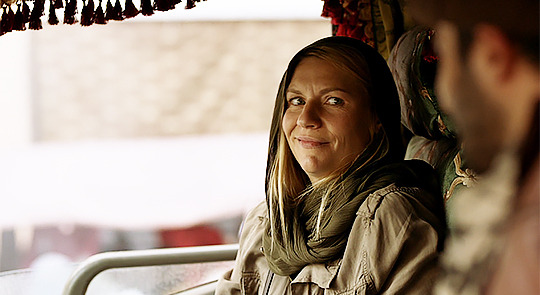
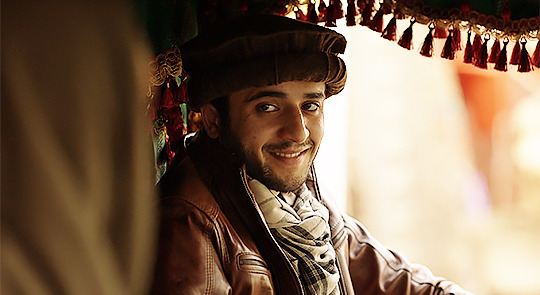
Sara: I stan this friendship.
Gail: My theory that everything goes to hell every time someone smiles still holds.
Ashley: It’s amazing to me that Carrie still has people who are so loyal to her. Don’t they know better?
Gail: Well, Arman is still alive, so, no.
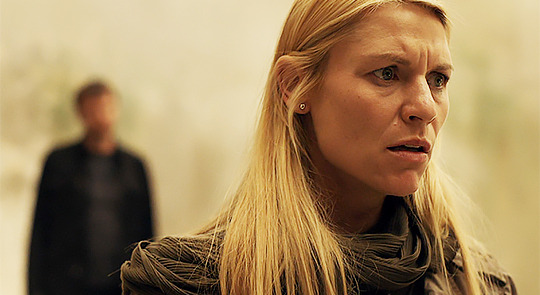
Sara: This Carrie/Yevgeny scene is so great. I love the way it shifts as Carrie processes what Yevgeny is asking for her--as she says later, making an offer she has no choice but to accept. You can see her cycle through the stages of grief: denial that the asset exists, anger that Yevgeny is asking her to do this, bargaining with him (she’ll do anything else), depression when she realizes she has to do it, and finally acceptance.
Gail: Interesting that they had her cycle through the stages of grief. It must mean something is gone that she’ll never get back. The choreography of Carrie walking away from Yevgeny and turning her back on him as she processes what he’s just said is telling too. Not only is he not on her side, he just became her Russian handler.
Ashley: It’s a dreamy shot too, everything blurred behind her, but we’ve really found ourselves in Carrie’s worst nightmare.
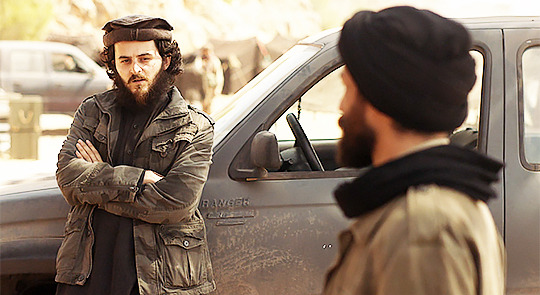
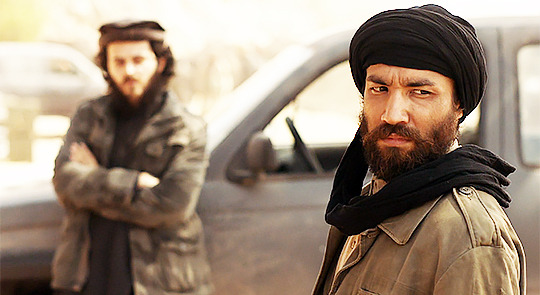
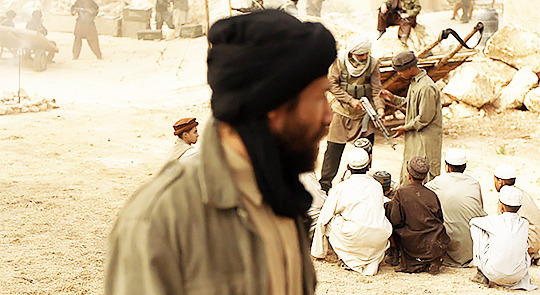
Gail: Sorry, Jalal. Yevgeny has already trademarked that lean.
Sara: There was a lot of imagery involving children this episode, which I find very interesting. Here Jalal is literally training young boys to shoot and kill. It gives a new sense of hopelessness to the entire situation. As Balach says, they’re inviting more endless war, and they’re lining up their next generation of soldiers.

Gail: Saul’s body language has continued to morph into a submissive and defeated posture. The stress this man is under makes me worried for his health. A person can only take so much before they break and it seems like Saul is almost there.
Sara: Me watching this damn show.
Ashley: I second.
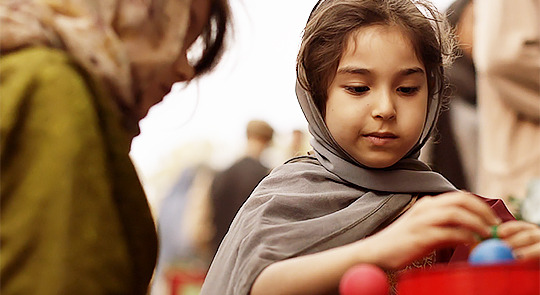

Sara: I found this moment where Carrie observes the two young girls playing to be especially poignant and a very Homelandian detail. It immediately calls to mind Franny, or, as Gail said on the podcast, the various little girls we see in the opening credits each week, versions of Carrie who have grown up watching war and conflict play out on her television screen.
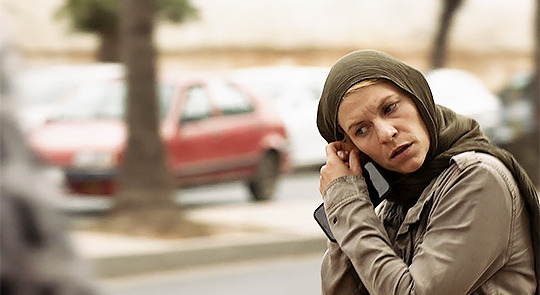
Sara: Carrie using her earring to remove the SIM card in her phone is such a Carrie thing to do and I have to stan on that one.
Gail: I love the detail because it’s also a callback to Allison in season five when she “tears down her comms” while going into full flight.

Sara: The expression in Carrie’s face here, as she turns herself in, also strikes me as one of grief. To be patted down by soldiers, to have to utter the words “I’m Carrie Mathison. I’m wanted by the FBI”... for a patriot like Carrie, we know this is her absolute worst nightmare.
Gail: I agree. I think Carrie is devastated that it’s all come to this but she also looks resolute. Her gaze is determined and steady, and her movements are calculated. Her line to Saul keeps echoing in my ears: “I did what had to be done.”
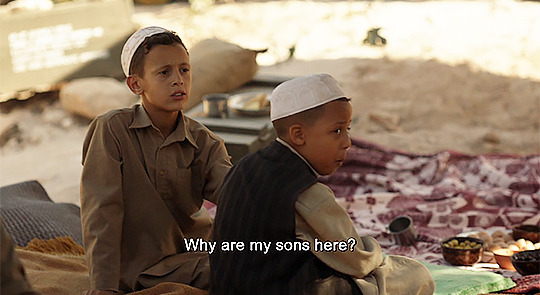

Sara: I found a lot of parallels between Carrie’s and Balach’s situations in this episode. Maybe Balach finding his two sons was meant to mirror Carrie seeing those two girls earlier. They act ultimately for those children.
Ashley: The horror at finding his children on-site — I find it hard to believe that Balach didn’t know what this meant at the very second he saw it. He, too, goes through the stages of grief at record speed.
Gail: Ashley’s right, Balach goes through the same stages of grief as Carrie. It’s clearer what Balach is losing in this moment and never getting back: his life. Is that true of Carrie as well?
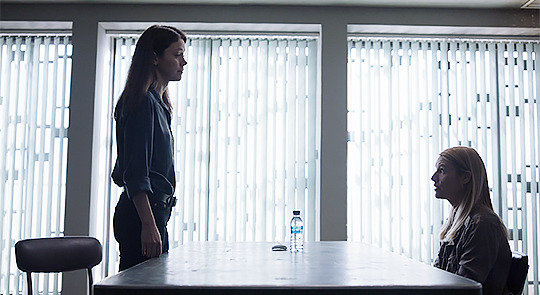
Gail: Carrie’s cool demeanor versus Jenna’s anxiousness sets up such a powerful scene between them. The coloring of the room is cool, too, done in trademark Homeland blue and gray.
Sara: This is quite a role reversal. Now Jenna towers over Carrie; still, Carrie ends up maintaining the upper hand. I loved this scene and how it paid off the season-long quasi-mentorship between them. Carrie has been teaching her lessons all season, just teaching them the hard way.
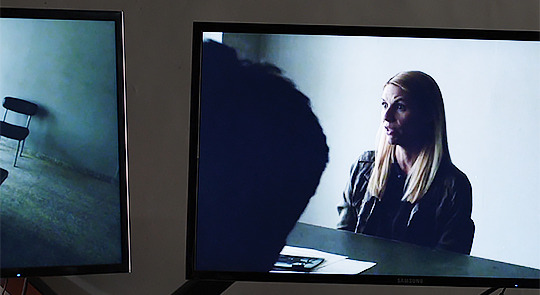
Sara: Carrie being on the other side of the interrogation table is not something I ever thought I’d see on this show.
Gail: Carrie’s posture is confident. She is sitting upright, head tilted slightly forward. Her hands are under the desk, revealing nothing. Carrie has probably been in a million interrogations and knows how to play the game.
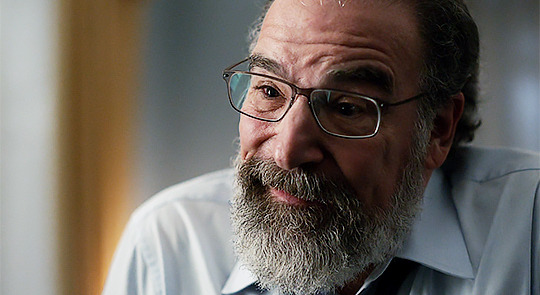
Gail: So many emotions play across Saul’s face here. We’ve seen Carrie and Balach cycle through the five stages of grief this episode, both of them having their cycles shown within one scene. Saul on the other hand has cycled through his stages over the course of the episode, ending with acceptance in this conversation with Wellington.
Sara: It’s ironic that in the episode where Saul finally steps up to acknowledge the ways in which he’s used Carrie over the years but can’t turn on her now, she makes the crucial decision to potentially betray him. There is a great contrast between Linus’ motives--about optics and politics--and Saul’s--which ultimately boil down to loyalty.
Ashley: I never thought I’d see Sara talking about how Saul’s motives boil down to loyalty, but 2020 is a helluva year.
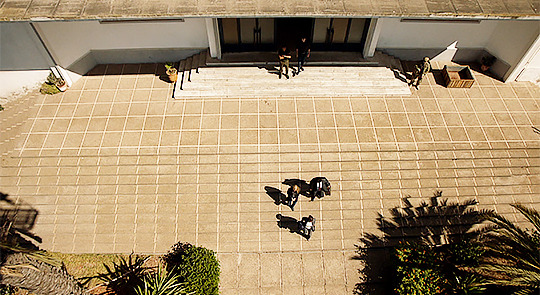
Sara: IJLTP.
Gail: It looks like a chess board. If Mike thinks he put the Queen in check, he’s got another thing coming.
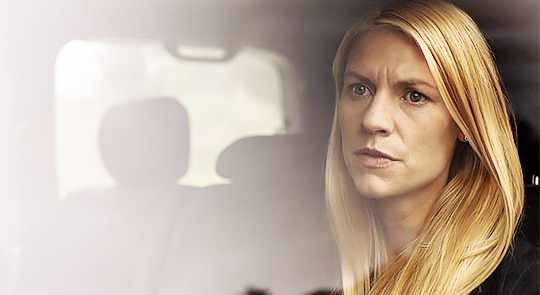
Sara: Carrie looks stun-ning here. (Requisite acknowledgement of yet another scene where Carrie is filmed from outside a car window.)
Gail: I love this storytelling device the show uses to give us a window into Carrie’s current emotional state. What’s great about this shot specifically for me is the familiar jazz music from Homeland’s opening credits that softly plays in the background as Carrie is being brought home almost a full year later. It’s the first time we’ve heard jazz music in a scene with Carrie all season long. We can see reflections in the window, but over Carrie, the glass is crystal clear. Earlier in the episode Carrie says she can’t see a way out of the hole she’s dug for herself. But just as the glass here is crystal clear, so is Carrie. She knows what she must do.
Sara: Gail, a “window into Carrie’s current emotional state”... literally!
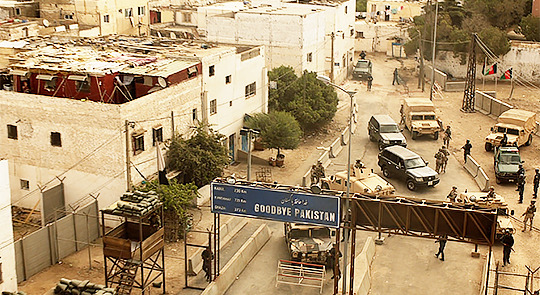
Sara: Love the “GOODBYE PAKISTAN” sign as we’re leaving this setting and returning to America the homeland for the final two episodes.
Ashley: The “GOODBYE PAKISTAN” is interesting because it is in English. Obviously this is for the viewers, but it comes off like a warning.
Gail: It is most definitely a warning. Look at what awaits them on the other side.
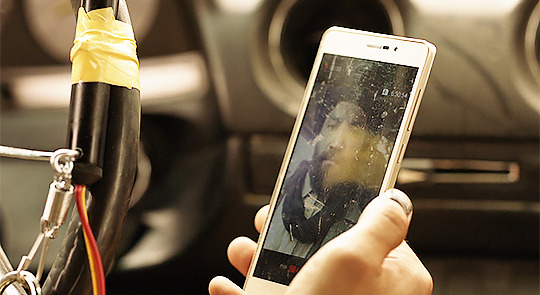
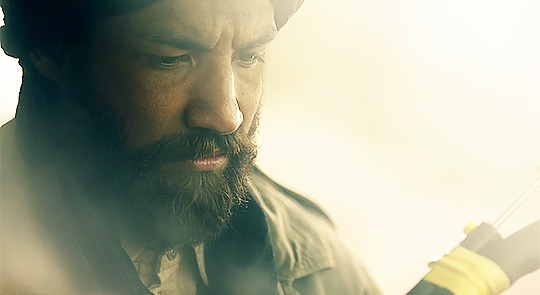
Sara: This scene was so stunningly shot. It reminded me a lot of Brody’s tape from “Marine One” and Carrie’s from “Why Is This Night Different?”
Gail: The details were all crafted so well too. From the prop department and set designers, to the moving score from Sean Callery, to the beautiful writing, to the performance from Seear Kohi. Balach accepted his fate in the earlier scene with Jalal, and now he is resolved to do what needs to be done.

Gail: I mentioned this on the podcast, but good Lord does this woman give great side eye. This is the exact same look I give my kids when they say they don’t have homework. I stan.
Sara: Gail, you’re so right. Vanessa Kroll gives excellent side eye.
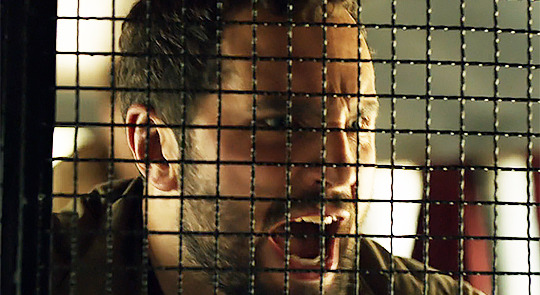
Gail: Parker, the character shown here, also cycles through the five stages of grief.
Sara: It’s not just Carrie who’s been trapped. The special ops team being literally trapped inside the bus, desperately yelling to be let out, was especially heartbreaking. This season, the show has portrayed multiple characters--major and minor--who are trapped in an endless cycle of war, prisoners of their own ideas and the system in which they operate.
Ashley: There is also just the fact that people are physically entrapped consistently — but they can still see what’s outside. Being able to see things and not stop them or escape them… it’s kind of a motif in this show, amped up to 1000 this season.
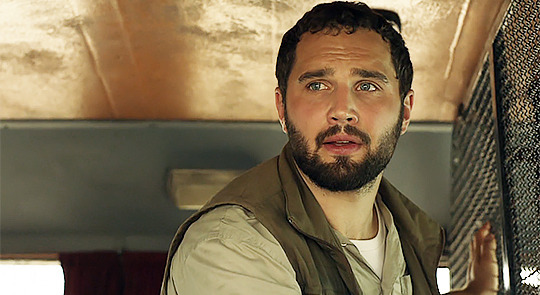
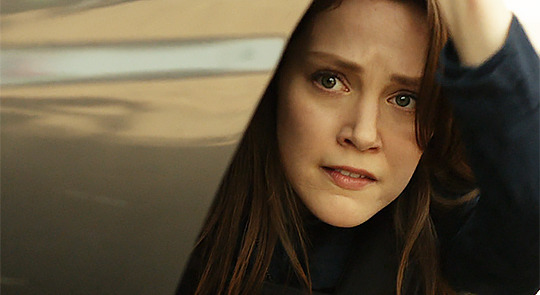
Gail: And now, acceptance of a fate he can’t escape.
Sara: This entire sequence was expertly edited, the shouts and commotion drowned out by Sean Callery’s excellent score. Weirdly there is a sense of quiet to it all.
I appreciate the contrast between these two reactions. Parker looks at the bomb barreling toward him and seems to have a sense of acceptance about his fate. Jenna, meanwhile, mostly out of harm’s way, ducks behind a car and her expression is one of fear.
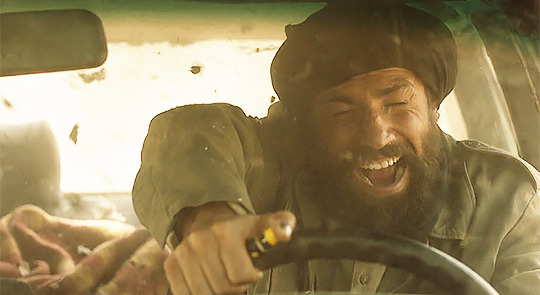

Sara: This final moment where Balach lets out an excruciating scream as flashes of his crying sons play across the scene is heartbreaking. He dies so that they can live. I thought it was--ironically-quite beautiful.
Ashley: Agree that it was beautiful, but it’s terrible insofar as his children are going to grow up under Jalal’s rule. They will never see the peace that their father wanted; they will never even know that’s what he wanted. Balach didn’t have a choice, but his legacy is now embedded in terrorism — not peace.
Gail: Balach had a choice, he chose his family. From their perspective, he’s a hero.

Gail: The symbols on the side of the bus are symbols on the Pakistani flag. The star symbolizes light and knowledge, the crescent moon symbolizes progress. Quite a contrast to the people being held prisoner within.
Sara: The split second before it happens -- the palms pressed against the bus windows is a breathtaking image.
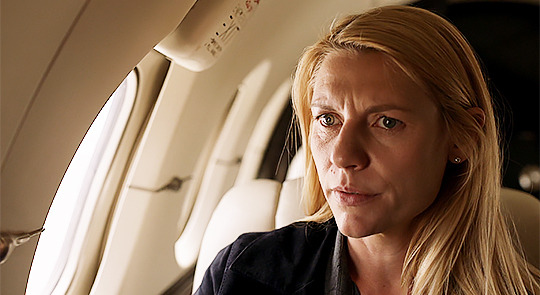
Gail: We don’t need a car window to locate Carrie emotionally now. She’s looking straight ahead, and like Balach in the car, begins her journey to the end.
Sara: The parallel to Carrie in the airplane is an unexpected one, but it fits. She has the same look of resolve in her eyes as Balach. She knows what she must do. She’s blowing up her life in her own way, setting a match to it all. Is she a martyr, or is she a traitor? This scene fits between a cut to white and a cut to black, and that’s where Carrie has always been: in the grey, searching.
Ashley: God help me.
#homeland#homelandedit#designated driver#*#michael offer#in the director's chair#by: sara#by: gail#by: ashley
4 notes
·
View notes
Text
WHY R U? THE SERIES FULL REVIEW

So now that the series has come to an end, I feel like I should summarize my feelings about WHY R U? the series, because honestly there are a lot of them.
When I heard the initial premise, I was very excited, a series about the fantasy story of a BL fan girl! It seemed like an original idea with a lot of potential for different narratives. A new way for fan girls to be satisfied; seeing their imaginations played out on screen as part of the script, and not just as fan service or in a fan fiction.
When the cast was announced I'll be the first to admit I didn't know any of the other actors apart from Saint. However, the lure of Saint in another BL role was more than enough to persuade me to anticipate the series. His previous role in LBC was carried out superbly. In fact, I learnt that the accent he put used for that series (which annoyed me greatly as a viewer initially) was an artistic choice for that character specifically, which makes me respect him as an actor even more.
By the end of the first episode, I was left with some rather conflicting opinions. Nevertheless, I continued to watch, episode by episode and have finally come to some sort of conclusion. It's a rather messy and confusing thought process but hopefully you can bear with me.
At first, I was off put by the jumpy plot, the narrative follows the characters along at the pace of a fan fiction, with little to no filler to explain how characters go from to enemies to friends in a single leap. The argument I've heard raised against this is that it's -meant- to be like that. Which I can appreciate, and I applaud the writers for their work, but I also think there's a reason that rarely if ever books are directly translated to screen in that manner.
However, I will say that once the relationships between characters- mostly Saifah and Zon - had settled that this style of plot development bothered me less and less and instead I found myself egging on the romantic tropes the two encountered.
As I've said I previously hadn't encountered any of the other actors before but now that I've watched the whole series, I have to say that they put together a really great cast. It's actually also a rather large cast I think, so I'll try to mention the actors that really stood out for me, but I don't think I can write about everyone.
Starting with the main cast:

Tommy Sittichok Pueakpoolpol plays Zon, and although this was not his first professional work it is arguably his biggest project to date. I think he plays the character very well. There is a sudden change in his character from stubborn to endearing; but this comes with the change in equilibrium of his relationship with Saifah and is therefore understandable. Overall, I really enjoyed this character's journey and especially fell in love with his soft boi persona that he has adapted to by the end of the series.

For his first ever professional works Jimmy Karn Kritsanaphan did a really well to undertake such a big role as Saifah. That being said, the characters integrality within the plot was not reflected equally to his time on the screen. It could be due to the point of view that the series is shot from - predominantly Zon and Tutor's- that we don't get to see this character’s development in greater detail.
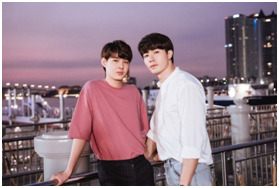
Zee Pruk Panich and Saint Suppapong Udomkaewkanjana play Fighter and Tutor respectively. I mention these two actors together because putting the more adult scenes aside, these two actors show such great chemistry and tension between their characters, there's a real push-and- pull between them which I think really draws you into their storyline. Also, I think they really deserve recognition for the "hard carry" they did of the series' last few episodes after the corona virus outbreak.
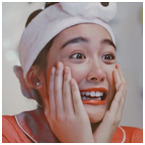
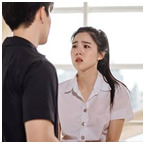
As is typical of Thai BL series due to their nature, I feel that female actresses in these series have to work especially hard to gain recognition for their roles beyond being hated for keeping a male couple apart. Refreshingly in this series Zol played by Perth Veerinsara Tangkitsuvanich has a rather neutral yet involved role in the narrative. She particularly shines in giving a comical and expressive performance whilst maintaining verisimilitude. The other stand out female actress from this series for me is Janistar Phomphadungcheep who plays Hwahwa, is obviously gorgeous, and part of her role is dependent on that. More than that though she executes Hwahwa's brand of "dumb" comedy hilariously well, so well in fact that she easily defies the typical reaction that a female love interest ensues.


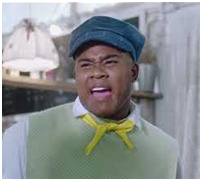
And finally, without going into too much detail I also have to give special mentions to Nat Natasitt Uareksit who plays Blue, Poppy Ratchapong Anomakiti playing Junior and James Rusameekae Fagerlund as Kae. Throughout the series these three actors all had what have to be considered scene stealing moments.
Maybe it's just me but all I found myself wanting to do was to protect Blue from his older love interests, as his sweet demeanour is revealed. Junior's "waterfall" moment upon seeing the engineer gang in the cafeteria in episode one really set the president for his comedic moments throughout the series, as rare as they were. P'Kae is the boss we all wish we had, and his protective streak when it comes to Tutor has definitely earned him a place as a fan favourite from the series.
One of the biggest talking points of the series has got to be its method of shooting and how that has affected the entire production. The production was shot live, meaning that each episode was shot and edited before it was released for broadcast each week, with the exception of some scenes. To shoot live requires quite the commitment from both cast and crew, it's also an incredibly risky method of shooting as any number of unforeseen circumstances can occur and interrupt shooting which has a direct effect on the entire production. Hence why live shooting is less common nowadays. However, the team definitely deserves credit for this decision as without the corona virus outbreak I think that this method would have benefitted the production overall.
That being said unfortunately the outbreak has forced many productions to shut down, and of course this has negatively affected the production of this series too, possibly more so than others that are in production stages currently. As such more casual fans of the series that may be unaware of the situation, and therefore not understand the reasoning behind the shift of focus from around episode eight and nine when the virus began to affect production. When in actuality the team should really be applauded for managing to still broadcast such coherent episodes under the circumstances.
Is it a perfect ending to the series; with a broad oversight of each character, couple and relationship that the viewer may desire? No, I would regretfully say that it doesn't manage to reach these criteria, but it makes a damn good effort to try, and this valiant effort is spearheaded by what should be categorized as a FighTor fan's dream. Endless scenes of the two characters exploring the more intimate side of their relationship. Which is actually a rather fitting filler for the series considering it is meant to be a fan girl dream story. So without these scenes I'm not sure that the series stands up with the storyline as it is. However, this doesn't and shouldn't distract at all from the stellar acting performances that we've seen from this series.
So, congratulations if you've managed to make it this far and read the whole review, my thoughts on the series were decipherable enough through the review, I hope.
2 notes
·
View notes
Photo
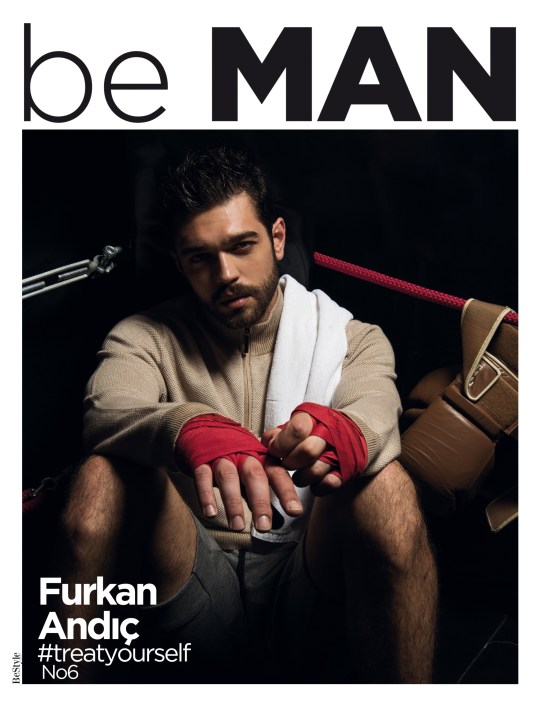
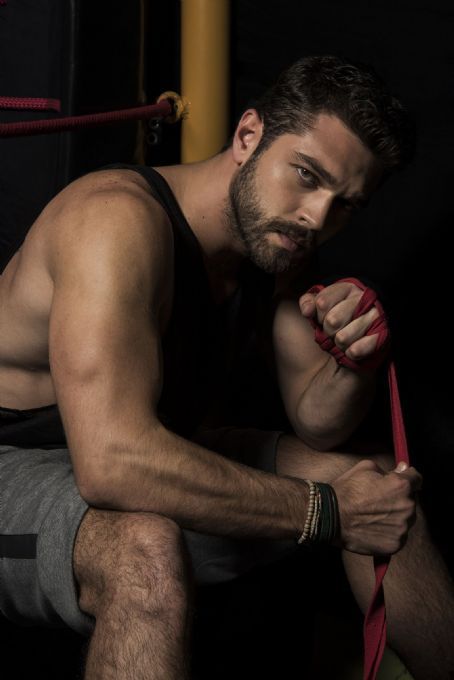

FURKAN ANDIÇ BEMAN MAGAZINE (OCTOBER 2017) INTERVIEW TRANSLATION
You are on our screens with a very different role in Kanal D’s TV series “Meryem”. How is it going?
We’re very busy, to be honest. Just like every work in this sector, we film the episodes within a very limited time, which requires working at quite a busy pace. But I can say that, for us actors, the most important criteria of satisfaction is the quality of the final product. Because the feeling of satisfaction we get as a result of the effort we put in is indescribable. Then you think that it is worth the effort. What we do in Meryem really satisfies me, which in turn motivates me to keep up with this busy schedule.
Do you understand the situation Savaş is in? Do you communicate with the characters you play?
Before building a relationship with the characters I play, I create them. In this way, I know everything about the characters I play in the light of all the knowledge I have gained through my acting experiences so far. We form an opinion (about the character) with the help of the information in the script and character analysis. After that, you ask whatever questions you wish about that character into the space and help that character have a physical form, be something living. It may be a traumatic reflex from his past, or the reactions he gives to different emotions. Then, with our directors, we try to create the character by making all the connections between the total of these and his past given in the script.
Savaş’s situation is really interesing. Life has wounded him from somewhere other than daily problems such as money, love or work. He is a man who lost his mother at an early age and had to grow up separate from his house because of the conflicts he had with his father. And this has always made him emotionally incomplete. After he loses his fiancée who was filling this void and helping him hold onto life in an accident, everything becomes even more difficult for Savaş. The void created in his life after Sevinç’s death pushes him to avenge his emotional breakdown and to start a search of the criminal.
Can you control your anger? What makes you angry the most?
Anger is a very interesting emotion. A very natural, humane reaction when someone is assaulted or deprived of something. To be honest, I used to have a quick temper and show my anger to the other person. But as I got more mature, I have come to realize how tired the other person becomes as a result of such reactions. So in recent years, I can control my anger pretty well. I don’t make an extra effort for this either. What makes me angry the most is when someone takes me for a fool. We people are social beings; we have a tendency to live together in a community. And communication is the most valuable social tool we use to understand each other. We can resolve everything through communication, but the fact that people try to fool others is, in my opinion, like fraud. Because I think like this, I can say that I dislike when people take me for a fool.
You’ve had your first movie experience with “Damat Takımı”. It is going to be in theaters soon, are you excited?
Damat Takımı is very valuable to me. First of all, the script was good and I felt that the friendship of the characters was very similar to the friendship I have with my friends. This is very valuable. Secondly, both my Volkswagen Beetle car and my best friend and manager have minor roles in it, which I believe will bring good luck. And most importantly, Damat Takımı is my first movie.
I had always filmed TV series before this and was very picky about movies, and this had both advantages and disadvantages. Its bright side is that my first movie is like how I imagined. Such a movie that I will keep a copy throughout my life and watch it proudly whenever I wish. The downside is that I met the magical world of cinema late. Cinema is a very different field from TV. Since we don’t have time problem, every scene can be structured more finely, both by the actor and the director. The beginning and the end (of the script) is there, so you can build the character in more detail. And this made me feel as free as I had never felt before, which in turn was reflected directly in my acting. I am going to watch it for the first time on October 16th in the premiere, to be honest. So I can say that I’m very excited. I hope people who take time and watch it enjoy themselves too.
Is there a specific movie genre or character that you want to play in the future?
I want to work in projects that have good scripts and well-written characters that I believe I can portray well. And of course, I want to do all of these with an innovative team. In other words, like everything else, cinema changes rapidly so I want to work in projects that I think will catch up with this speed.
Frankly speaking, rather than being an actor limited to one genre, I want to play characters with diverse emotions and motivations, so I want to be not only in romantic comedies but also in different categories of movies such as drama, horror and action. I think, as an actor, my job is to wear the shoes of the character I will play and present the paths he walks and the choices he makes to the viewers.
Have you learnt anything from the characters you play?
The script’s uniqueness, the actor’s imagination and curiousity altogether can make the actor feel intense and real feelings that he’s never experienced before. The actor can even collect memories, so to speak, while experiencing those feelings. I learnt a lot of things from each of the characters I created. And I believe that made me a more mature person in life. Having different experiences and adding something to yourself while playing different characters are great opportunities for actors.
Among the countries you traveled to, where did you feel like you belonged?
Bali, Indonesia. The attractive disorderliness of the location... A lot of people travel from Europe to Bali. And many people who come bring along their cultures. But, on the other hand, the local people preserve their own religious beliefs and cultural values and this kind of creates a very orderly disorderliness in the island. The island’s unique and attractive natural beauties also made me feel like I belonged there. Beside this fascination, I can say that Bali is an ideal place for me considering my personality. I’m a person of warm climates. I like water and water sports. I like to observe different cultures and talk to people from those cultures. I can communicate with them easily and learn something from them. The local people in Bali also have the same sentiments and motivation toward the foreigners. This is why I love that place.
Have you ever had to break up with someone? If it’s not very personal, why?
Breaking up with someone is something dramatic for me, and I may have never told someone to break up in my life. But I may have played a significant part in the ending of some of my relationships, because at the end of the day, breaking up is a destruction. At work or in friendships, it is the end of a relationship in its general sense. We can say that it is destruction for both sides. That’s why I prefer keeping this destruction at minimum. Even if I’m the one destroying it, I try not to hurt the other person. That’s why I don’t want to say that I’ve broken up with someone. I probably managed to explain myself and my reasons, so I can’t give you any examples since I haven’t broken up with anyone.
When did you suffer because of love for the first time; are you in love right now?
I was 11 in 5th grade, and it was because I couldn’t confess to her. It was a very painful feeling. Loving someone romantically isn’t something we experience every day. That’s why we definitely have to protect our love. We may often be afraid to confess it to the other person, but I believe that nothing that may happen when we share our feelings can be worse than not sharing them at all. Nowadays, I’m not in love with anyone. You never know what future will bring but I can say that there’s no time for it in this tempo of my life.
Do you get help when you shop?
Yes. I make sure to ask the opinion of the person with me.
Is there anything that makes you say “I don’t want to die before I do it”?
I don’t want to die before filming a full-length movie that I’ve written. I hope I will have the chance to do it.
What is the book that had the biggest impact on you?
“Aşkın Gözyaşları” (Tears of Love) by Sinan Yağmur. Shams Tabrizi and Mevlana are two figures whose wisdom was admired not only during their days but even today. In the book, we see both their divine love and eternal values like loyalty, dedication, belief and reality. I also think that the book doesn’t take any sides and everyone can find sincere values about life in it.
Have you ever had a moment when you thought you grew mature?
Toward the end of 2000s, after high school, I went to Kiev, Ukraine. Going there made a big difference in my maturity level. Life was too difficult there. It wasn’t like a normal university life. I can say that it was more like a “fight for survival”. There was a huge difference between the living standards I had before I went to Kiev and after I went to Kiev. It taught me to live with less and to create something out of nothing. What made me mature was that I normalized the process and moved on with my life. I learnt a lot. It may also be because I was at an age when my personality was being set. So, in short, the time when I believe I grew mature was when I returned from Kiev.
Is there an attire that you wear all the time? What kind of style do you have?
My black and white t-shirts. As a style, I like getting dressed casually. Wearing simple and plain clothes is an aesthetic appearance, in my opinion. That’s why I don’t prefer very complicated pieces of clothing. Comfortable pants and a plain t-shirt can make me feel good. That’s when I think what I wear looks good on me. Also, I think what we call a style is the choices that make one feel good.
Who do you look up to the most in life?
I actually look up to a lot of people. Artists, athletes, scientists... I look up to every person who makes efforts to add value to the world rather than to achieve something when they are alive. I can say Keanu Reeves, for example. His humility, helpfulness and spiritual world is really admirable. He’s someone who weighs his work only in terms of the value it adds to the world. I believe that he has a focus like “How can the world become a better place with my performance or the money I earn?”. I think that his tragic background didn’t stop him from achieving his goal but even helped him have this vision. This is a level of patience and calmness that I can look up to greatly.
Why did you choose martial arts?
I did sports throughout my life. I was interested in many sports, particularly basketball. But they were all team sports. I learned different kinds of disciplines and skills, of course. But in this tempo of my life now, it’s really hard to form a team and dedicate myself to the team. So I started doing individual performance sports. The reason why I’ve chosen martial arts is the adrenaline and philosophy. You have different kinds of experiences due to adrenaline hormone. It teaches you to think reactively, know the opponent within a short time, foresee what’s coming, weigh the defense and attack at the same time and most importantly, to focus on that moment independently from everything else. They also have humble philosophies like respecting the opponent, preserving the body’s agility, not hurting the opponent, using intelligence more than excitement and achieving a mental tranquility. This is why I’m interested in martial arts.
Do you have a weakness for anything?
I can actually say that I have a weakness for fun. I noticed this through the observations of the people close to me. Like everyone else, I try to be with the people I love and spend fun time with them while enjoying life. And I can sometimes lose the track of time while doing it. Making the most of now is, in my opinion, life itself. So I may be trying to keep that fun time longer.
What does acting mean to you?
An achieved goal. But after achieving this goal, I’ve realized that it is a very deep and long journey. I know I still have a very long road ahead; it makes me very excited. In some scenes, actors can get too immersed in the depth of a moment. We may experience very exciting feelings in such moments. It is like you are given the chance to live a moment of someone else’s life in your own life. If an actor has really tasted this, he will probably want to collect such moments during the rest of his life as much as he can.
Are you happy with where you are?
Yes. I’m at a point where I feel I’m very open to learning. It had never been so fun to learn something. I’m satisfied with the point I have arrived by improving myself in my work life too.
Our motto is “BeStyle”. What’s yours?
“Know yourself.”
(English Sub) Q&A: https://www.youtube.com/watch?v=RmLBamZc-Vc
Backstage: https://www.youtube.com/watch?v=BozrkARyLL4
6 notes
·
View notes
Text
Supernatural TippiTV Recap: 14-13 “Lebanon”
Okay before we get started. This is a long one and while I think it's pretty funny if I do say so myself, there's also a lot of me just... frickin ranting about John Winchester and rushed plots. If you loved this episode and don't want to see someone snarking about it, this might not be the recap for you.
On the other hand if you're like me and come from the TWoP tradition of snarking about the things we love most, then come on in!
THEN!
Two children talk about how their dad is on a hunting trip and hasn't been home in a while.
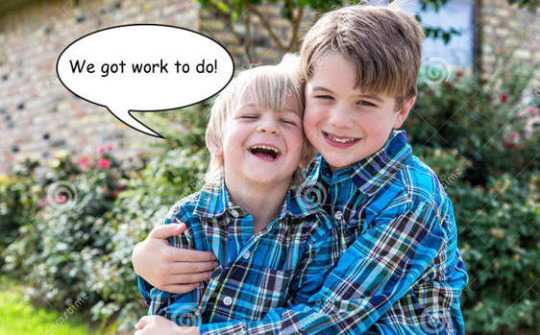
Oh wait... holy crap it's Sam and Dean. It took a sec to recognize them without the gravelly voices and almost 14 years of soul-crushing despair.
We also get a reminder of very recent episodes, including the one where Mary learns about the time John threw young Dean's food away because it reminded him of her. It's important to remember what an abusive, hardened asshole John Winchester was... so that we can forget it! Forget it all!
[insert video of recapper letting out a Klingon scream]
NOW!
Sam and Dean mosey on into a pawn shop that I'm positive is in the US because they never leave the US but there's a sign that says the shop buys "jewellery" which is how they spell it in places that also spell "flavor" with a u. Dean flashes a big wad of cash to get the broker to show them "the good stuff."
By this, he means the magical goods, although the secret room looks like a high school drama department prop closet.
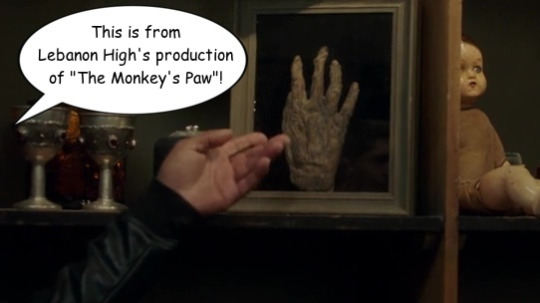
Dean says they're looking for the skull of a woman who was executed during the Salem witch trials. While the broker goes looking for it, Sam picks up a teddy bear from, you know, a shelf full of cursed and magical items because it's not as if stuffed animals have ever been dangerous. <cue ironic flashback>
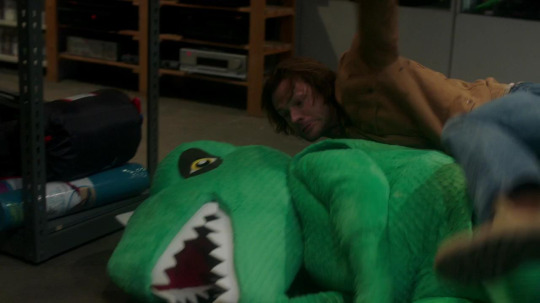
Luckily he's warned away from it before he can unleash some kind of... Pooh demon... probably.
Anyway, it turns out having the skull proves that the broker killed a friend of theirs or something... Honestly, very little of this is going to have any bearing on anything. Long story short, fisticuffs ensue and Dean shoots the broker while he's expositing to Sam. "They always talk too much," Dean says.
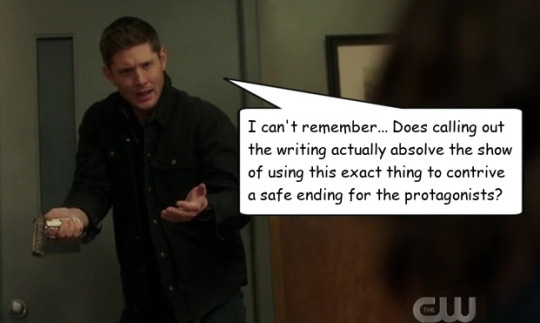
Sam and Dean decide to take a bunch of magical items home with them. Although... what if they rightfully belong to other peop---ah screw it.
Okay now... here comes a long, boring subplot about teenagers back in Lebanon, Kansas. The main thing that's pertinent to the show is that Sam and Dean have a certain reputation around town. And no wonder! They park right in front these teenagers and start talking about shit they would never want anyone to hear.
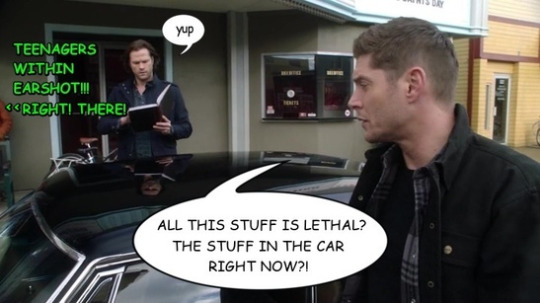
They head into the world's skimpiest liquor store and the owner addresses them as "the Campbell brothers." Say whaaaat? Have they been using their mom's maiden name for a while and I just missed it? I mean, I guess it makes sense because... Actually, I don't remember how much stuff is still in their world about the infamous Winchesters. Like I legit can't remember if Charlie or someone erased their FBI/police records or if it was just some fanon someone told me about.
Also, nothing says "real liquor store" like shelves of bottles turned so that their name brands don't show.

Anyway, Sam stage-whispers to Dean about an ancient Chinese pearl that grants "what your heart desires."

The plan is to get Michael out of his head, but they notice someone is driving off with the Impala. They run out to confront one of the teenagers about it. He confesses that a girl named Max is the culprit, so that we can spend several minutes on this subplot instead of the much more emotional and important main plot.
I mean, we go from the post office to a pizza joint to an old house on the edge of town to catch up to the Impala. Max has apparently brought all that lethal “secret” stuff inside for a party. The camera lingers on that teddy bear again as if it's going to be important to the plot later.
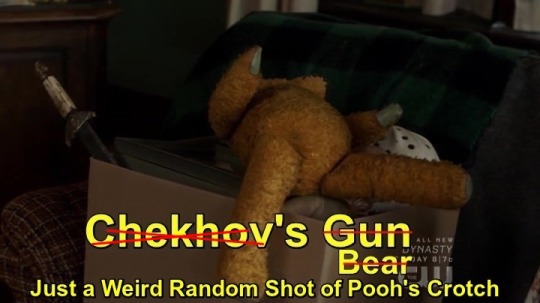
Max, the car thief, has a crush on a girl and ISTG I was prepared to be mad if she died. Like I don't even want this whole subplot at all but I'd be puh-hissed if they had queer characters on just to kill one. Luckily I was wrong and neither of them die. However, the dialog is killing me. "I'm sooo excited for pizza." Tell me you can't imagine Lumpy Space Princess saying that.
Apparently the ghost of John Wayne Gacy (sigh) was waiting for the kids to go in search of pizza before oozing out of a cigar box the Winchesters brought from the pawn shop.
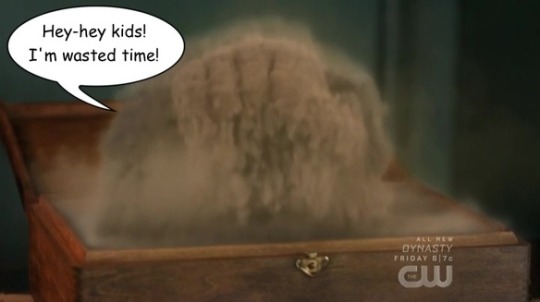
Why is his ghost dressed as a clown? I mean yes I know Gacy was a children's party clown, but it's not like he died in that outfit. Aren't ghosts supposed to be wearing what they died in? OH GOD WHY DO I CARE.
The Winchesters show up and scoot everyone out of the house, but not before at least one kid sees the ghost. Sam zeroes in on the cigar box and Dean points out how Sam's love of serial killers and hatred of clowns are in conflict.

Of course, some of the kids come back in just as the ghost goes up in flames. Sam and Dean decide to just... tell them the whole truth instead of just lying. Like..."Yo, one of the things you stole was secret holographic tech and you could face prison time if you talk about it." See? Easy peasy. Instead, they just trust the kids to never talk about ghosts being real and meeting actual ghost hunters.
I briefly wondered if this was some kind of back door pilot for teen hunters, but I haven't heard anything about that. Granted I didn't actually look that hard.
Once back at the bunker, Sam finds the magic pearl but it's kinda... chalky and medicinal looking. It looks like something Goop would sell to stick up your hoohaw.

Dean decides there's no time to wait because we've already spent too long on teenagers playing hooky. Like, even Sam doesn't really know how to use it. "I guess you just concentrate on what your heart desires," he says, scrunching his face uncertainly. I mean what if this had happened
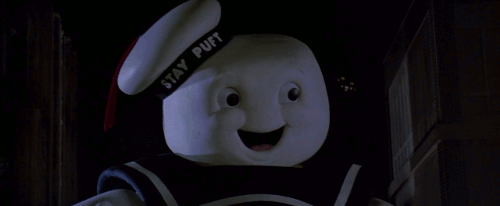
The music swells dramatically. The lights flicker off dramatically. A shadowy figure approaches... dramatically. Fisticuffs ensue! It's a nice callback to Dean and Sam fighting in the dark in the pilot episode because ta da! It's actually John Winchester! Which we all knew because this was foretold in promotions.
The lights come up, showing... just a whole lot of things for me to process.
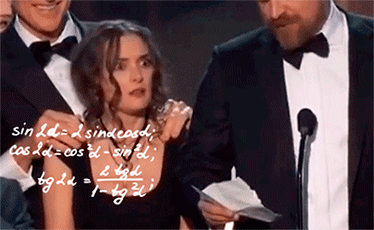
Now, at first, things don't seem that weird. We've seen people come back from the dead so many times, it's basically as surprising as buying socks at this point. Except! John isn't back from the dead at all! He's traveled through time! He eventually tells us he's from the year TWO THOUSAND AND THREE. TWO ZERO ZERO THREE.
He's both three years younger than the last time the bros saw him AND 13 years older, because for Jeffrey Dean Morgan, and all the rest of us mortals, time has marched on. Consequently, John Winchester looks like he got stuck in a wormhole for a good while.

Now, kudos to John for recognizing his sons, especially Sam, who looked a little something like this the last time they saw each other.
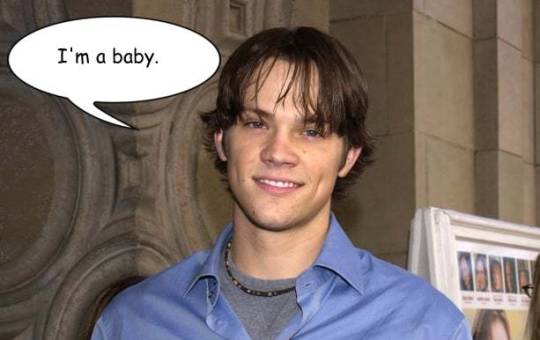
"Aren't you supposed to be in Palo Alto?" he asks Sam. "And also not a middle-aged man?" he doesn't ask, but I bet he was thinkin' it.
It's just... sigh. I might as well get it all out now. I get what they were going for here. It's the 300th episode and they wanted to have John show up. But because everything is so rushed, they just gloss over anything remotely realistic to the characters. John is all softness and awe the instant the lights go up, instead of bristling and suspicious. Why wouldn't he think it was a djinn or some other creature's doing? "Well we don't have time for him to be as flinty and wary as John would have been in 2003, because we need to get to the part where he spends quality time with his family!" YES EXACTLY. The show is three hundred episodes old now and it deserves more than this speedy treatment put together seemingly for the concomitant promotional opportunity.
Anyway they have a Sit-n-Chat to catch John up on what they've been doing, including the living situation there at the bunker which includes an angel and the son of Lucifer. Goodness only knows what John is picturing.

Now that I think about it, the brothers should be hella wary too. I mean, what if the pearl is cursed? What if John is actually some shambling interdimensional beast masquerading as John? What if the whole thing is just a hallucination brought on by nefarious moon herbs in Paltrow's pookie pearl? They just uncharacteristically seem to rely on the pawn broker's ledger.

Fine! Fine! I’ll drop it.
They talk about how they met John's dad via time travel, too, but don't mention that's why John never saw him again after childhood. They talk about the Men of Letters, finally killing old Yellow Eyes, saving the world... Then just when they're about to tell him that Mary's back from the dead, she actually shows up and starts calling to her sons. What a coincidence! John is pained.
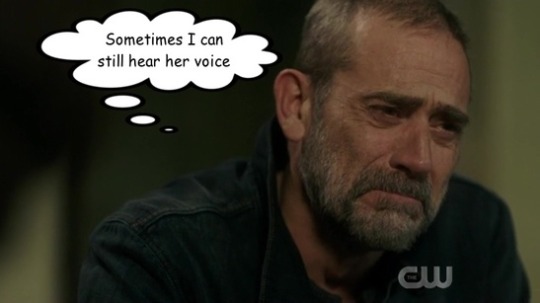
It seems like they didn't tell her, either? Did they just tell her to come over for a surprise or did she just happen to be on her way there anyway? Anyway John and Mary start in on a smoochy reunion so Sam and Dean quietly leave the room.
Sam's like, "How'd this happen?" And Dean's like, "We spent too much time on the teenager subplot instead of looking into this potentially dangerous thing, is how!"
For some reason, John is perusing the library alone instead of... um... making up for lost time with his hot wife. Sam goes to talk to him and finds out Mary's off writing a shopping list for Dean so she can make that emotionally important casserole again. This leads John to admit he fucked up with his kids. Sam is reluctant to blame John because he's had almost 13 years to get over it.
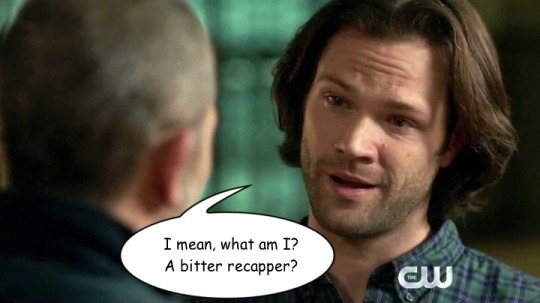
I hate that everyone's acting their little hearts out and all I can think is how painfully contrived the episode is. Whatever problems I have with the writing and the premise, I don't have a problem with the job the actors are doing. Okay, okay, I'm really letting go of it this time.
John rubs Sam's shoulder and tearfully says, "Son, I am so sorry." The cellos of sadness play sadly. "I'm sorry, too," says Sam. "You did your best, Dad. You fought for us, you loved us... that's enough."
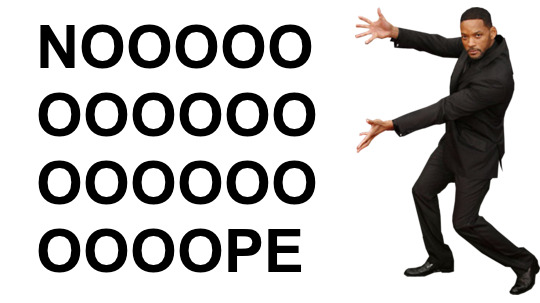
It's one thing to decide you're going to move past the shitty, shitty things someone did because you're in the midst of the enormity of what's going on RIGHT NOW. But it's another thing for the show to minimize the past. John did NOT do his best. For fuck's sake, he left a little boy in charge of an even littler boy! Dean knew his Dad was possessed because his REAL dad would never be proud of him! When Dean stole food to feed Sam, John abandoned him to face the consequences!
God damn it I guess I'm not going to let it go, after all!
Anyway, Sam and Dean head into town for groceries and time paradoxes. The liquor store owner no longer recognizes Dean, which is the surest sign that something is Very Wrong. Dean is flabbergasted. "It's me! Dean Campbell! I come in here like... always!"
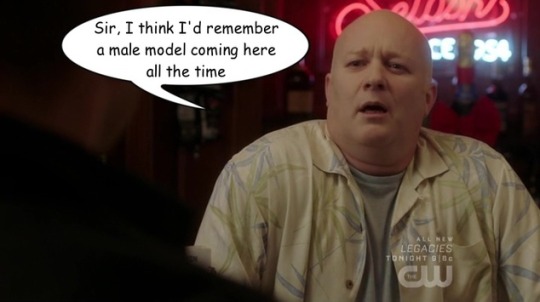
As Sam heads back to the car, he sees a wanted poster for his bro. It's the old Blue Steel one except I think Sam used to be on it too? He's not anymore. He heads back to the car to tell Dean, but Dean's already been a-googlin' on his phone.
He plays back a video of Sam as a turtleneck-wearing lawyer espousing a raw food diet with plenty of kale. Good lord how much raw food does someone the size of Sam have to eat to fulfill his daily caloric needs?
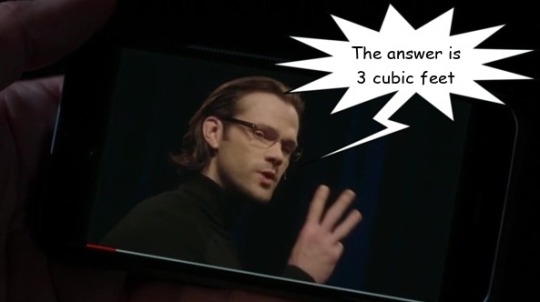
They kind of hand-wave how these new versions of themselves exist at the same time as the OG versions. "Our timeline is changing to this new one!" Sam says. He says they need to put things back the way they were or they'll be stuck. It's nice of the timeline to work slowly enough that they can figure this out.
Somewhere nearby, the angel Zachariah appears. Castiel moseys up beside him and he's brought some old friends.

They decide to head into the nearest pizza place. The teenagers are there because not even a paradox will get rid of this subplot. "Can I help you?" asks the waitress. I think the usual question would be, "Can I get you a table for two?" but whatever. Zachariah asks her who's been messing with time. "We sensed a disturbance in the, well, let's call it the Force," he says. Naturally, she's very confused, and even more confused when he says they're from Heaven.
He says he'll have Castiel murder everyone if they don't tell him what's going on. To emphasize this, Castiel whips out his angel mojo.

Sam and Dean see the bright light from across the street and come running in. Sam's like, "Zachariah?!" and Dean's like, "Cas?!" and Cas is like, "Is that with one S or two, and also who are you?"
Zachariah exposits that Heaven had big plans for the Winchesters but then their dad suddenly disappeared in 2003. Why wouldn't the angels assume the disappearance and the time event are connected? Why'd they have to just start asking questions in a random pizzeria? Fisticuffs ensue!
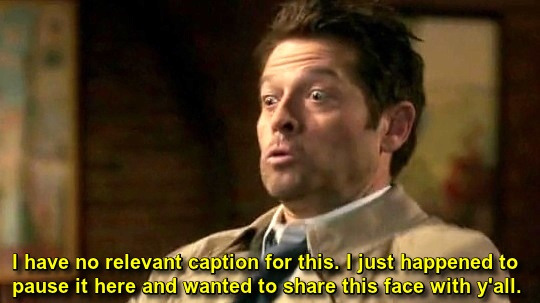
Zachariah force-chokes Sam while asking him for an explanation. Why do villains always try to make people talk while they're choking? Pick one or the other! But this gives Sam a chance to surprise Zachariah with an angel blade in the heart. Oh, Zachariah. Destined to die by Winchester in every version.
Meanwhile, Dean and Castiel are still tussling even though I'm pretty sure Castiel could kill them both pretty quick. Sam joins in for a bit, but gets flung into a table. If there's a table around, someone's getting flung into it. Then he goes back to strangling Dean instead of finishing off Sam, giving Sam a chance to make one of those angel-vanquishing sigils with his own blood.
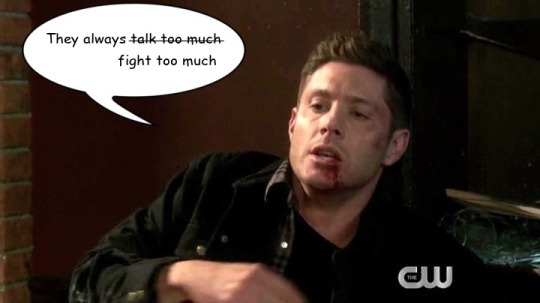
They go back home. Dean explains the whole paradox thing to John. If he doesn't return to 2003, Dean will live the same life but alone, Mary will never have come back to life, and Sam will devastate kale crops like a moose-sized locust.
John agrees to go back. "Me versus your mom, that's not even a choice." That's... a weird way to phrase that dilemma. At the same time, Sam is delivering the news to Mary. He says "the lore is pretty clear" that if they destroy the pearl, everything goes back the way it was. What lore? They knew jack squat about it before they used it. Mary has some questions.
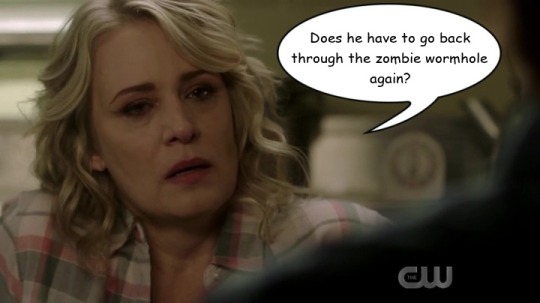
John tells Dean he's proud of him and I slightly expect Dean to whip a gun out on him. "I never meant for this.... I guess I hoped that eventually you get yourself a normal life..a family..."
WHAT.
WHAAAAAT.
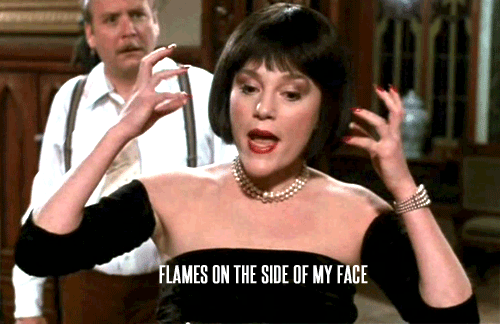
He did nothing to prepare them for a normal life! Leaving your kids in motel rooms, never letting them settle down in one school, issuing ultimatums when Sam wanted to go to college? Man, Dean should've been like, "Nah, that was your other son, Adam, who got to live a normal life... at least until a ghoul ate him and his body was used by an archangel." But Dean is nicer than me, I guess. "I have a family," he says.
They decide to eat dinner even though who knows when the timeline is going to snap into place permanently. Oh my God they even take the time to wash the dishes after. They have a nice chat and again, everyone's acting their little hearts out and I'm trying not to be distracted. Dean tells Sam he doesn't want to change the past. "I'm good with who I am. I'm good with who you are." Please let that stick with no reversions to self-loathing and I'll retroactively like this episode more.
They cut to this shot and for a second I thought it was Sam and Dean holding hands at the sink.

Of course it's John and Mary. Sad piano plays sadly. John's not going to remember anything, but the rest of them will. Oh man what if John got Mary pregnant during his visit. Sam and Dean were out shopping for a while. I wish I hadn't thought that, but now that I have, you all have to be witness to my horrible brain's meanderings.
John reiterates that he's proud of them. So this time Sam pulls a gun on him! No, he doesn't. They all hug and cry genuine tears before John goes back to holding hands with Mary. Sam reluctantly smashes the pearl to bits. Seems like Dean would have to be the one to smash it since he's the one who made the wish, but it works and John slowly fades out of the present.
Everything goes back to normal, including the teenagers remembering and loudly discussing the existence of monsters in public.

Castiel returns to the bunker in his newer, homelier coat and less erotically tousled hair. "What happened?" he asks. The response in my brain:
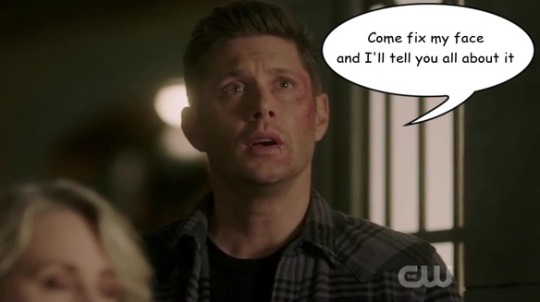
Back in 2003, John wakes up in the Impala to the sound of his flip phone ringing. Smart phones are great and all but man I miss the battery life of my flip. It's the Dean of the day calling to check on him. John, although he's not supposed to remember anything from the future, seems to have experienced it as some kind of dream. He seems nicer, too. This will probably have no bearing on the timeline, though... right?
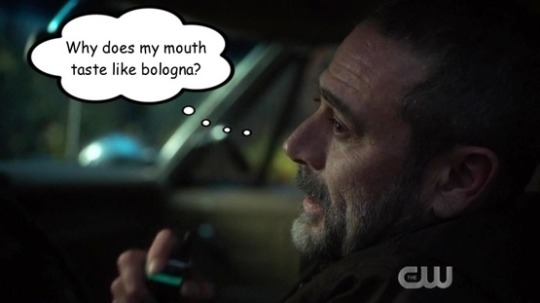
I mean, is that 2019 casserole still in his stomach? Did the wine turn back into grapes? Probably not but these are the kinds of things I think about.
Sigh.
I feel the episode does a disservice to its main characters. I've already ranted more than enough so I'll just pick one example:
If Sam had gone on to live a normal life, he would've become a cold-hearted douchebag who tells people that hobbies and families are a waste of time. Like, ha ha yes it's amusing that Sam is the leaf-munching Steve Jobs of law, but what's the meaning here? Are we saying that wanting to get an education for himself means he's a selfish asshole? Like this is the alternative to the codependent relationship with Dean that formed because of their father? Argh.
The John apologia is just so clunky and unnecessary. John could've said, "I should've done more than teach you to hunt monsters... prepared you for a normal life so you could have a family." Then Dean ccould say, "Being able to kill monsters kept us alive long enough so that we figured out things for ourselves. And we do have a family." Bam! It lets John be rueful without rewriting the past or having Dean swallow all the years of hurt and it even acknowledges that knowing how to hunt isn't a bad thing.
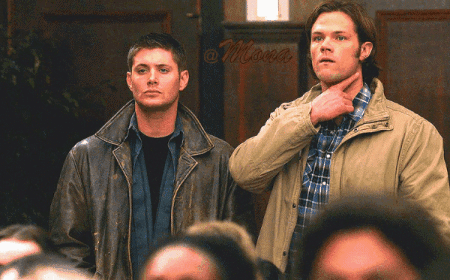
Thank you for sticking with the recap to the end! I do still intend to recap past episodes but things have been kind of stressful. Just staying afloat has been a chore some days.
For updates and info you can check here: https://www.gofundme.com/winter-rent-and-dog-care
I also have a virtual tip jar of sorts here: https://www.paypal.me/tippiblevins
104 notes
·
View notes
Photo

Jungleland.
“You’re in the most beautiful place you’ve ever seen, but it’s hell.” Colombian filmmaker Alejandro Landes takes us deep inside the extreme filming conditions of his acclaimed jungle thriller Monos, and the art of letting life come onto the page.
Alejandro Landes’ second fictional film Monos follows a ragtag group of Colombian teen soldiers enlisted to care for an American hostage known as Doctora (played by Julianne Nicholson) and a conscripted milk cow, but struggling to function under power-trips and adolescent recklessness.
The film has been gathering awards all year, including Sundance’s World Cinema Dramatic Special Jury Award, and praise for Mica Levi’s score. Monos is Colombia’s submission for the Best International Feature Film Oscar (the Academy Award category that, until last year, was known as Best Foreign Language Film). Hot on the heels of last year’s Birds of Passage, Monos is a fresh source of pride for Colombian movie lovers.
With Landes’ raw approach, Monos belongs in the same club of gritty war films as Apocalypse Now, Full Metal Jacket and Come and See. Letterboxd members dig its “captivating, alluring atmosphere” and “the immensely physical performances”; it’s “a brutal, unflinching fever dream that takes you hostage for 102 minutes.”
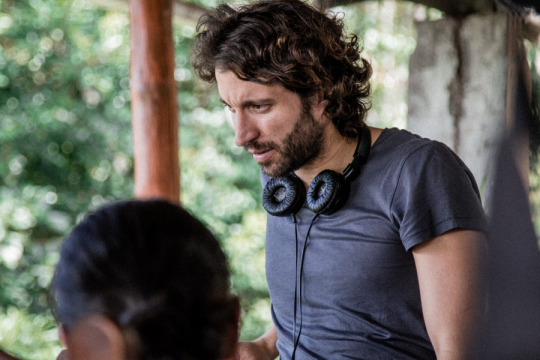
‘Monos’ director Alejandro Landes.
We caught up with director Alejandro Landes, a journalist-turned-documentarian who has made his way to dramatic cinema, and asked him to take us into his experience of making the film.
What inspired this jungle thriller? Alejandro Landes: Coming from Colombia—a country that’s had six years of civil war—inspired the idea of making a film that is in part a war film. The nature of that conflict that’s in the shadows is very similar with what’s happening with war today. It doesn’t have those epic front lines that maybe our great-grandparents or grandparents experienced in WWI or WWII. Most operations are done by special forces or drones in Syria, Iraq or Afghanistan.
The idea of creating a film from the backlines is something that speaks to my generation, and creating a mirror to the conflict of adolescence when you’re between a child and being an adult. You want to belong but also be alone, hair comes out of places, your voice changes—and so the film is this exploration of this borderline.
You’re in the most beautiful place you’ve ever seen, but it’s hell. You don’t know if they’re fighting for left-wing guerilla forces or the right-wing paramilitary force. I wanted to create this allegory where you’re forced to latch onto the humanity and presence of the characters instead of a big ideology. That was very much what drew me into the film.
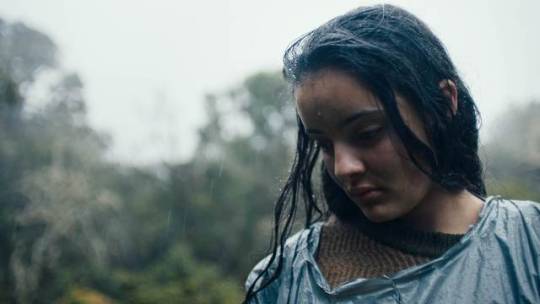
When it comes to the back-stories of the characters, and even the time and place where it’s set, you leave a deliberate ambiguity. What motivated that decision? Many times we latch onto first names and last names, ages, dates, names of places, because they make us feel safe. They’re kind of stickers. Like when you fill out a sheet at a job application or at a doctor’s office. But these hard facts can feed into your prejudices. I thought it was interesting because the world is so polarized today.
You don’t know if Doctora is a CIA operative or an NGO officer. You can’t look at the character through the lens of their occupation, or their last name even. That’s why the characters have a nom de guerre and I think that for me was key for the metaphor to act subversively and kind of just work against any prejudices you might have.
We always want back-stories to justify and explain actions and a lot of the time it ends up being expository or a filmmaker’s psychoanalysis. Here, I wanted to enforce something very radical which made people feel uncomfortable in war. I wanted you to experience it from the humanity of a group which is basically the lowest rung of the ladder—and many times they are kids.
As fantastical as it sounds, it’s actually very common. I read a lot of first-hand accounts of people who had been kidnapped by well-known organizations and although the high command had been the one negotiating—be it for political leverage or money—the day-to-day custodianship ended up being the youngest soldiers. The people that were kidnapped experienced being in the hands of kids going through their adolescence and it was a peculiar situation.
The film relies on its ensemble, so you really depended on efficient casting. What do you think it was that pulled these young actors through the brutal challenge to be a part of this film? I think it was the time that we spent together before we even started to shoot. I looked at over 800 kids all over Colombia and ended up bringing that down to about 25. We did a mock training camp and had them do acting improv exercises in the morning. They were doing pieces of the screenplay without knowing they were scenes from the same script. They thought they were random exercises.
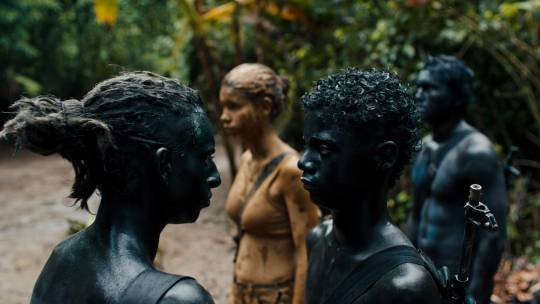
In the afternoon they would do military drills; not classic military boot stomping, but sometimes dancing, barefoot drills, carrying a weapon. We were trying to create this clandestine army and by seeing them live together I was able to see who flirted with who, who fought with who, what chemistries there were, and that way we were able to build the group who would be the final eight.
During this process of the boot camp we wrote the screenplay, trying to bring the lives of each one of them [into it]. I knew that Boom Boom was a big hip-hop dancer. I knew that Rambo’s most important thing in her life is her brother. Certain things helped the screenplay and the emotional states that the actor would later go into during the shoot.
What were you looking for when recruiting the Doctora role, and why did Julianne Nicholson fit the part for you? I thought [Julianne] had this very loveable sweetness to her, and I thought it would be a challenge to take that sensitivity with the maternal instinct that she had with her captors and turn it violent. She was willing to bring that physicality to the screen and she’s got that iconic look to her that reminded me of Snow White and the Seven Dwarfs. I thought of the film as a sort of fairytale. I thought the way Julianne was able to portray that switch was something we haven’t seen on screen.
She was also willing to go down [to Colombia] and make it happen. That was a big thing. She spent time with the kids to really be there for weeks in these incredibly tough conditions. She was willing to go, not just when it was her scenes, but she spent time in [Doctora’s] cell. She drew all the charcoal paintings you see in her room, they were done by hand by her.
Much of the drama depended on your choice of shooting locations. How did you shape the narrative around these limitations and how did shooting in these remote places affect the cast and crew? Shooting 13,000 feet [above sea level], there was really very little oxygen up there. Going down to the jungle canyon where you have to take a donkey, take an off-road, take a raft, take a kayak all the way to reach base-camp. Everyone is at their limit. On the first day of shooting, we had to bring someone down from the camera department who had an epileptic fit. I needed to be carried out of the jungle [due to suspected appendicitis] on the shoulders on these gold miners that were there. They taught us how to live on the river.
Something the locations gave me that was really special was the narrative arc of the film. That highlands you see in the beginning, it’s a big reservoir of water which is a very delicate ecosystem called páramo. The water trickles down the mountain and gains more speed until it reaches the currents in the lowlands. That path of water was what we were following in the film. The idea of how a river moves in a winding way with different speeds and velocity was what we were trying to echo in the structure of the edit.
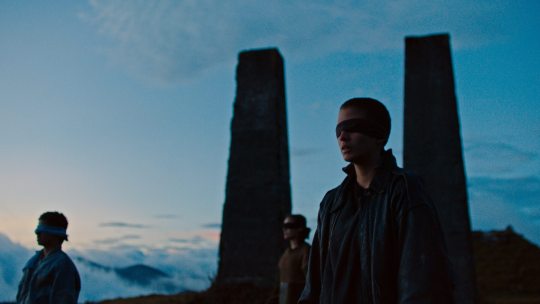
Remember too, that once the water reaches the lowlands, it condenses, goes up to the clouds and comes down again in the highlands. So in a way there’s something about the cyclical nature of violence and the circular movement of water that made sense to me. That all sounds great but it’s another thing to make it work in the edit, and we really worked hard so you never thought you were looking from the back of the river—you were always in the river.
The look of the film is remarkable. The clouds, the silhouettes, you have a literal ‘fog of war’. How did you set out to achieve this? The important thing is to look at what was in front of you. My first film was a documentary. I didn’t go to film school so making that film was my film school and a documentary forces you to look at what’s happening in front of you. As much as we had a very detailed screenplay and everything storyboarded, the locations change on a dime so we couldn’t count on luck every day.
We had to just to be there, be present, and have the confidence to move on, switch and let things come into the page. If a scene was under sun, and then on the day all you get is fog and rain, you discover a new way to come into the scene and let life come onto the page.
Mica Levi [also known as the musician Micachu] has already gained a strong reputation for film composing. How did you manage to wrangle her for Monos? Mica came on board after seeing a rough cut of the film. She connected immediately with it. I didn’t think it needed music but she was on it very quickly. She sent me a very epic whistle that reminded me of spaghetti westerns. The idea was to create something that was minimal but at the same time had that monumental, epic feel.
We wanted to juxtapose those very primal, basic sounds like blowing into a bottle with a quartet of strings, and later you have sounds that are a shot of adrenaline that sound like they could come out of a Berlin nightclub. That mash of sounds I felt was very important; it allowed you to give emotional cues to the characters, similar to [Sergei Prokofiev’s story-symphony] Peter and the Wolf. It was great working with her and my sound designer Javier Umpierrez because we were trying to make this soundscape that was specific but also otherworldly.
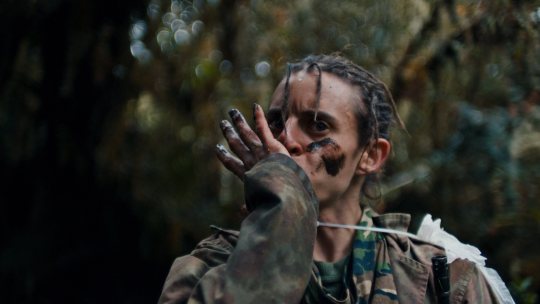
Monos has been submitted for Best International Feature Film at the Oscars. That must feel good. All these prizes help the film get seen and that’s an important thing. This is a film that started on a shoestring and we were trying to build something very radical. It’s a film that was done through absolute blood, sweat and tears of these people who believed in it so I’m just glad that it’s finding its public—and the fact that we’re distributing pretty big in the US for a Latin American film.
It’s going to open in more than 30 countries and it’s blowing up in the Colombian box office, which is really special because Colombia still hasn’t really seen their cinema. It’s a polarizing topic to have a war film after everything they’ve lived. Having more than 200,000 people go to see it in its first three weeks is a huge thing. For a point of comparison, it’s the same amount of people who went to see Tarantino’s film [in Colombia].
What film made you want to become a filmmaker? Wow. That’s your toughest question. I don’t know if I can point to one exactly. When I was young my dad wouldn’t let me watch TV. We had the apparatus but not cable so he had his own movies and I remember he had that German submarine film Das Boot. I watched it so many times I started to see the stitches of how it was made and that got me onto thinking “ah, okay I understand this, I like this”. I’ve never watched it in a movie theater, that would be cool.
Das Boot has a similar atmosphere to Monos so it’s an interesting choice for you. Yes, those were the films I was thinking for my second fiction film. I think it comes from that part of time when I watched those epics, including some David Lean films.
‘Monos’ is released by Neon and is screening in US theaters now. For more Colombian films, check out ‘Colombian Cinema: Six of the Best’, a list made for Letterboxd by ‘Birds of Passage’ directors Ciro Guerra and Cristina Gallego.
#monos#colombia#colombian cinema#paramo#julianne nicholson#alejandro landes#jungle thriller#letterboxd
2 notes
·
View notes
Note
Your biromantic ace Lance headcanon... I just? Love it so much?? I’ve noticed people never headcanon the flirty people as ace, so I love ace!Lance.
It was honestly inspired because... watching things like Lance talking about Allura in his vlog, it betrays that there’s a pretty harsh divide between how he really experiences attraction and how he thinks he should seem attracted. Him gushing about how cool Allura is and then hastily correcting it to how he’s sure that Allura thinks he’s cool.
With that, and how much he talks about what seem to be kinda old-school action movies, I think it’s pretty clear where Lance gets this attitude of he should be the passive ladykiller who draws people to him when it’s much more Lance’s nature to just... adore someone. He’s really, at his heart, this sweet, sentimental guy and that part of his personality is really adorable when it comes out.
The idea that he’s acting about sexual attraction is, and I touched on this a bit in the post, was that s4e4 gave all of the paladins very fake, shallow reads of them that are fundamentally untrue. Shiro as a generic beauty with nothing important to say, Hunk as a bumbling buffoon, Pidge as someone just blathering off meaningless nonsense science, Allura Keith as an arrogant lone wolf who’s only isolated because he’s too cool for this teamwork thing.
The main conflict in s4e4 is this schism between the acted personas and the real people, and even before we really get into those personas, we discover something interesting about the team: all of them, including the charismatic Shiro and the stated diplomats Hunk and Allura, are positively wooden actors.
The only person who acts well, without any instruction, and consistently does the best the entire episode?
Lance.
And Lance’s persona stands out- because he’s framed as the “loverboy”, mister romance, flirtatious, and- at an incredibly superficial read, that seems like that’s true to character, in contrast to everybody else’s.
But it’s not.
Lance is not a sexual lover- and, it’s very clear that his persona is. He practically does a pole dance hanging from the Red Lion. This is- hedged in a g-rated show- blatant sex appeal.
Which sends a very interestingly complicated message. It tells us that casanova Lance isn’t real- but also, that Lance, out of the team, is the best at playing something he’s not. Allura sort of manages Keith’s role by being literally too frustrated to participate, making her seem aloof and stoic. Hunk has his role externally manipulated onto him. Shiro and Pidge are just stewing in discomfort the entire time and arguing with Worm Coran about what he’s expecting of them.
Lance is the only one who isn’t uncomfortable the entire time. And his input? Whatever he’s doing, the audience loves it. He’s basking in the approval of his fans, signing autographs, listening to the cheering.
At this point- that’s more important to Lance than the fact that he’s pretending to be something he’s not. And again, of everything they could’ve chosen to be Lance’s fake persona, they chose casanova.
So I guess the headcanon sprouted out of that: if Lance is faking his relationship with sexuality, then is it possible he actually doesn’t feel sexual attraction at all? Again, that’d be hard if his main role models he’s looking up to are old-school male action movie heroes- pretty much every macho man action hero is frequently defined by having lots and lots of sex with lots and lots of beautiful women.
Assuming Lance was exposed to this young, and going off the implication that Lance doesn’t really have a strong relationship with his own orientation as much as an expected orientation- that would do a lot of damage. It’d be fundamentally alienating. But it’s also hard to articulate an absence of that sort of thing- and I’m drawing a bit from my own experiences as an asexual person here. For the longest time, I simply assumed that sex was something I’d inevitably want once I got to the Right Place and the Right Person. Suddenly this desire would just, unfold. Clearly.
(Spoiler: it didn’t.)
The vlog also further highlights a lot of what s4e4 implies about Lance- because while Lance isn’t the only one to share things he’d rather not, Lance is the only one we see actively discussing the possibility of doctoring the footage afterwards.
Lance is very concerned about his image. How he’s seen, how he presents himself, this is not an effortless thing. Hell, Lance’s personal grooming routine, introduced as early as s1e2, even tells us that out of the team he’s the one that puts the most thought and effort into his appearance. It isn’t a joke- it’s establishing characterization.
The reason why s4e4 doesn’t have Lance struggling with being saddled with this fake extra personality is “Loverboy Lance” is a piece of baggage he’s had since the first episode.
Like- let’s go over Allura, who Lance actually does have a full-blown crush on at this point, even if I don’t think it’s reciprocated or, really going anywhere.
We see three phases of Lance meeting Allura. The first two fit very cohesively with what we know are Lance’s virtues, and who Lance is as a person. Allura startles awake, calls out for her father, and then starts collapsing.

Before anybody else processes this sudden turn of events, Lance panics- he runs over to Allura and catches her so she doesn’t hit the ground. In that instant, he has no idea who this person is and hasn’t really processed what she looks like- all he cares about is that she’s going to get hurt. It’s a very knee-jerk, heart-on-sleeve moment of compassion.
And this is who Lance is! He feels things, right there, and obviously- he’s a good guy who does good just because it’s the most natural reflexive thing to him. This is the same Lance who shoves Coran, then a relative stranger, away from a bomb, and draws Iverson’s attention and lets him say some very hurtful things to protect Pidge, who’s been mostly just rebuffing Lance’s friendship and criticizing him at that point.
He helps because it just plain doesn’t occur to him not to.
And then Allura looks up- and Lance sees her face for the first time and it strikes him he’s holding a beautiful woman in his arms.
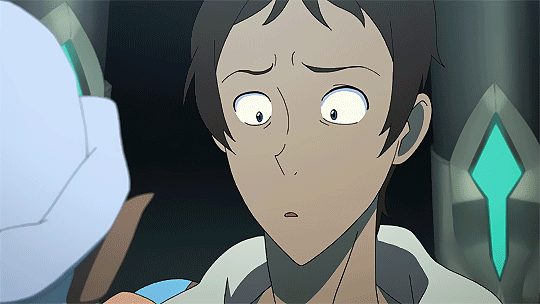
This is not the face of a casanova. It’s, again, that kind of immediate emotions-first response; he’s sweating, his expression is nervous. This is where a crush he’s continued to harbor for four seasons now first takes root, but immediately, he doesn’t want to mess this up- and that’s when we see a very marked shift:

Loverboy appears.
In contrast to his first two reactions, this is unsympathetic, and it’s very fake. This is the facet of Lance that Allura first insults and then immediately loses patience with because he’s flirting rather than answering her questions or taking her seriously. Because as soon as Lance decides he values Allura’s opinion of him, he whips out this fake personality and puts it on.
Because for Lance’s action hero idols, this kind of smarmy attitude works without a hitch. He’s trying to be James Bond. But in the real world that isn’t pretty much an outright power fantasy, that doesn’t work- and if Lance had kept being the sincere, mildly-smitten but mostly worried person he shows time and time again when surprised, stressed, and focused on everything other than how other people see him, he’d have been fine.
This, I think, way more than Lance fearing his lack of a role, is the underlying implication behind his insecurity and his never hearing the virtues or stated “identity” of the Blue Lion.
It’s not that Lance’s role is undefined or he needs to find it. Because remember- the reason why Lance doesn’t hear Blue’s virtues is he interrupts Allura to push his own fantasy.
I can’t think he didn’t do that on purpose. All of the other paladins have their Lions described and then given to them- Hunk is clearly not expecting to be paired with Yellow after Allura describes his temperament. But Lance already knows which Lion is his- and he cuts off Allura before she tells him what the Blue Lion is like.
Which frankly? Sounds like the behavior of someone who’s scared about what he’s going to hear- rather than desperately hanging on Allura’s words to tell him who he is. Lance at the start of the show just plain doesn’t think he’s good enough. And Loverboy is just his poison of choice to defend himself- taking the superbly-confident fictional men he’s watched and making that a defensive mask he can brandish at any situation that makes him uncomfortable or insecure.
Think about Lance calling himself the “cool ninja sharpshooter” when- even establishing himself as a sniper, Lance overwhelmingly uses his scope and range on the battlefield to check on all his friends, quip and joke with them, and play support rather than stoically sneaking out and precisely headshotting the most important target. He’s a friendly mother hen with a gun. Impressive marksman? Yes. Stoic assassin as implied by “cool ninja”? Well... there’s a reason Keith thought that was a joke and it’s not because he doesn’t think Lance is good with a gun.
So the rough tenets of Loverboy is: he is very sexual, he’s always composed and cool in every situation, and everyone is supposed to like him. He’s James Bond.
But the thing about Loverboy, as spotlighted by s4e4, is it’s not real. It’s fake. And the further Lance progresses as a character the more he’s letting this mask crumble away, in huge chunks.
Lance’s moments of strength as a character- s3e1 and his connection with Keith, the instance that makes Red decide he’s worthy of connecting with, and s4e6 supporting Allura- come from a point where Lance’s reflexive compassion surges forth not only with intensity, but a sense of complete calm. It’s Lance affecting a soft, serious, benevolent demeanor.
Because the Blue Lion is the ultimate nurturer. The lover, not as smoldering libido, but that softly takes their beloved’s hands and sees all the universe in their eyes. It’s the kind of love that looks at someone and understands, and accepts their faults, and sees all of their strengths, whether that’s a friend or a crush.
Insecure, vulnerable, uncertain Lance attempts to seduce, attempts to brag, attempts to posture, and it’s a very selfish kind of love- it’s a love that attempts to make everything about him. “Uh, I mean, I’m sure Allura thinks I’m strong and cool and pretty”. And he’s not very good at it.
Confident, certain Lance, at the height of his power doing what he does best- he supports, he understands, he reads right through people and responds with compassion and empathy and a sense of surrendering to a kind of higher flow. And that’s not always serious! I would argue that the Lance we see utterly smitten in the vlog, gushing about man have you seen Allura she’s so great and wonderful and pretty- is his true self acting out. Again, it’s his nature to adore and his nature to support. There’s a reason this kid is a leg pilot through and through, and arguably moved to Red because Keith needed him there.
Since love is such a big deal to Lance, it’s thus not surprising that romance is stated to be something significant in his arc. And I think this whole thing of transcending the immature casanova archetype that he tries to hide behind- of becoming more certain in himself and embracing his true virtues- could tie very nicely to an arc with Lance beginning a relationship based on what his actual needs and wants are, rather than the expectations tied to the Loverboy persona.
Because the real relationships that Lance flourishes with are supportive ones. He heavily connects with Plaxum as an intelligent rebel and someone whose cause he supports and situation he’s concerned by before he ever finds out she’s a beautiful mermaid and thus someone he’s attracted to and might want to pull out Loverboy to deal with.
Now- reading Lance as a biromantic ace who’s been struggling with trying to live up to what can only be called a violently heterosexual ideal isn’t necessarily essential to this arc, but, I think it would fit very nicely here- especially because there’s this thing of when women have seemed totally into Lance, he never once makes any motion towards pursuing sex or even expresses interest therein. He verbally espouses a great desire for intimacy, both romantic and platonic, and I think that’s sincere, but Lance made a raunchy joke only once over the course of four seasons.
#voltron legendary defender#vld#Lance#readmore#thirty-two paragraphs later......#whoops I've got some feelings about Lance and romance#Anonymous
317 notes
·
View notes
Text
Best New Horror Movies on Netflix: Winter 2018
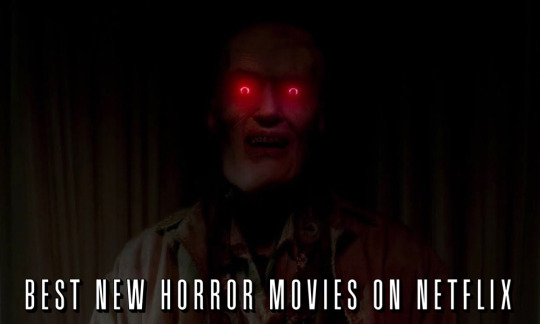
There's an overwhelming amount of horror movies to sift through on Netflix, so I've decided to take out some of the legwork by compiling a list of the season’s best new genre titles available on Netflix’s instant streaming service.
Please feel free to leave a comment with any I may have missed and share your thoughts on any of the films you watch. You can also peruse past installments of Best New Horror Moves on Netflix for more suggestions.
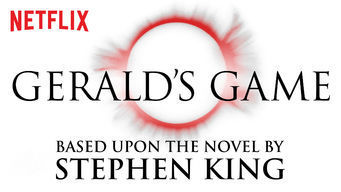
1. Gerald's Game
IT was undoubtedly the most entertaining Stephen King adaptation in recent memory, but Gerald's Game may be the most tense. The novel - which revolves around a middle-aged married couple's attempt to spice up their love life - was seemingly un-filmable, but director Mike Flanagan (Oculus, Ouija: Origin of Evil) takes a creative yet logical approach to successfully translate the story from the page to the screen. The direction is stylish, despite largely involving only two actors in a single bedroom. Carla Gugino (Watchmen) and Bruce Greenwood (Star Trek) star, both delivering brilliant performances, with Henry Thomas (E.T. the Extra-Terrestrial) and Carel Struycken (The Addams Family) in chilling supporting roles. Its left-field epilogue won't work for some, but the film remains a suspenseful, dead-filled experience that includes perhaps the most cringe-inducing sequence of the year.
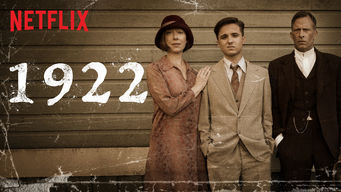
2. 1922
1922 is an adaptation of a little-known Stephen King novella, published in his 2010 collection, Full Dark, No Stars. Like much of King's work, it doesn't shy away from the supernatural, yet it's firmly grounded in reality. The always-reliable Thomas Jane delivers a transformative performance in his third King film (following Dreamcatcher and The Mist). He stars as Wilfred James, a conflicted man who confesses to murdering his wife (Molly Parker. Deadwood) with the aid of his son (Dylan Schmid, Once Upon a Time) in 1922. Akin to Edgar Allan Poe's "The Tell-Tale Heart," Wilfred's unbearable guilt manifests itself. Cinematographer Ben Richardson (The Fault in Our Stars) utilizes a lot of natural light, while Faith No More's Mike Patton composes an atonal score. Writer-director Zak Hilditch (whose previous film, These Final Hours, is also worth seeking out) delivers a brooding, character-driven slow burner.

3. Raw
Raw made waves on the festival circuit when it caused multiple viewers to faint. It is indeed a uniquely repulsive film in more ways than one might expect - depicting everything from animal dissecting to bikini waxing to eye licking in graphic detail - but it's much more than a mindless gorefest. The French film is a compelling, darkly humorous coming-of-age story... with cannibalism. The plot revolves around Justine (Garance Marillier), a young vegetarian, as she enters her first semester at veterinary school. She receives the full college experience: hazing, coed living, experimentation, partying, flesh eating. Marillier's fearless performance is matched by a strong vision from writer-director Julia Ducournau.
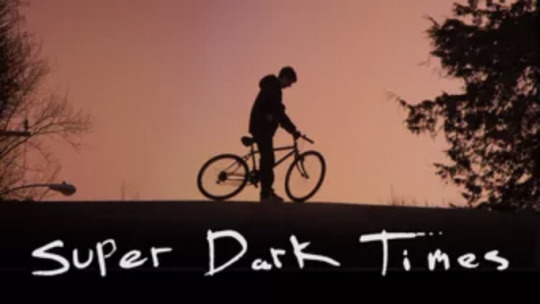
4. Super Dark Times
From the first act of Super Dark Times, you might expect it to be a coming-of-age genre tale in the vein of Stranger Things and IT, but by the end you will find a film that shares more in common with River's Edge and Stand By Me. It's set in the '90s, complete with scrambled "adult" channels, but it doesn't beat the viewer over the head with nostalgia. Owen Campbell (The Americans) and Charlie Tahan (Ozark) star as best friends with a secret that drives a wedge between them. Co-writers Ben Collins and Luke Piotrowski (Siren) capture the adolescent banter better than most films, while director Kevin Phillips makes an impressive feature debut. Living up to its title, Super Dark Times is a dark, tense experience.
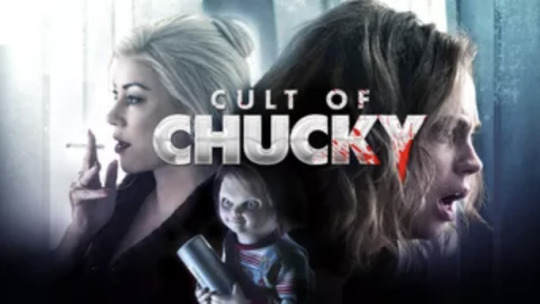
5. Cult of Chucky
Child’s Play is a rare horror franchise that has maintained its original continuity, thanks to having Don Mancini - who has written every installment and directed the latter three - as the driving creative force. Cult of Chucky, the seventh entry in the series, brings together the franchise’s three distinct story lines - Nica (Fiona Dourif) from Curse of Chucky, Andy Barclay (Alex Vincent) from Child’s Play 1-3, and Tiffany (Jennifer Tilly) from Bride/Seed of Chucky. Taking cues from A Nightmare on Elm Street 3: Dream Warrior, the film takes place in a mental institution, where Nica bonds with the members of her therapy group. When they start dying one by one, Nica struggles to convince anyone that a possessed doll named Chucky (voiced, as always, by Brad Dourif) is responsible. Mancini’s well-paced script is fearless in its exploration of delightfully weird ideas, in addition to balancing the more serious tone with lighthearted fun. The result is as close as you can get to pleasing fans of all eras of Chucky. Read my full review of the film here.
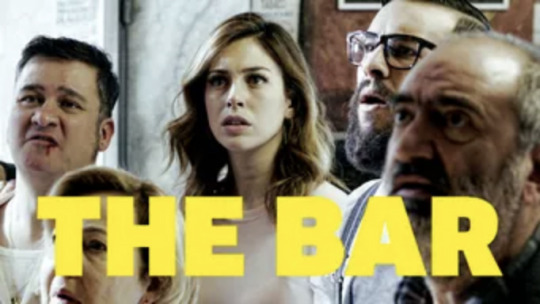
6. The Bar
The Bar is the latest effort from reliable Spanish filmmaker Álex de la Iglesia (The Oxford Murders). It finds a group of strangers trapped in a seedy bar in downtown Madrid. Anyone that tries to leave is killed by an unseen assailant, with their bodies disappearing - blood and all - when no one is looking. Reminiscent of an episode of The Twilight Zone, suspicion grows and intrigue builds as the group must come together to solve the mystery. Iglesia does a fine job establishing an ensemble of quirky characters in a short time and then maintaining that momentum throughout the duration. He also injects his signature dark humor into the plot, helping to further set it apart from other contained thrillers.

7. Creep 2
2014's Creep (which is also streaming on Netflix and should be viewed first) was perhaps the last good, original found footage movie, made on a shoestring budget with copious improvisation. Star/co-writer Mark Duplass (Safety Not Guaranteed), whose eerie performance as an idiosyncratic murderer anchored Creep, and director/co-writer Patrick Brice return for Creep 2, which slightly expands the mythology without sacrificing the intimacy that made the first film so effective. Duplass' character now goes by Aaron, assuming not only the name of Brice's character from the first Creep but also his interest in filmmaking. Sara (Desiree Akhavan) responds to Aaron's Craigslist ad looking for a videographer, and it’s not long after their meeting that he admits to being a serial killer. But Aaron is going through a bit of a midlife crisis, so he employs Sara to film a documentary about him. Much like the first Creep, not a whole lot happens before the climax, but Duplass' eccentric character and vulnerable performance keep you watching with bated breath.

8. Killing Ground
Killing Ground is an unapologetic Australian thriller in the vein of Eden Lake, Wolf Creek, Deliverance, and The Hills Have Eyes. In other words, it's an intense punch in the gut. In the film, a couple's romantic camping trip is interrupted by unhinged locals against whom they must fight for survival. The familiar set-up is elevated by intriguing flashbacks to events a few days prior to the main story, the context of which adds even more weight to the harrowing situation. Although not the most original story ever told, Killing Ground is an effective, realistic debut for writer-director Damien Power.

9. Veronica
Verónica is a Spanish-language psychological thriller from Mexico. Co-directors Carlos Algara and Alejandro Martinez-Beltran opted to shoot the film in black and white with gorgeous, precise cinematography, bringing to mind the recent The Eyes of My Mother. A psychologist (Arcelia Ramírez) is offered a substantial sum of money to take on the evasive yet intelligent Veronica de la Serna (Olga Segura) as a patient. It's a simple set-up, consisting of little more than dialogue between the two characters, but the intriguing therapy sessions slowly reveal Veronica's deep-seated issues. The plot takes an unexpected, exciting turn for the final act, but it ultimately leads to a twist that is trite and, frankly, unnecessary. But don't let that deter you; the rest of the film is positively riveting.
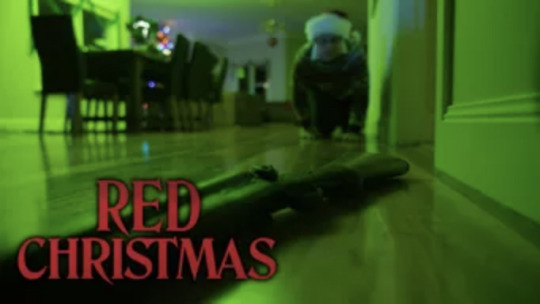
10. Red Christmas
Red Christmas is a holiday horror film that - despite hailing from Australia - captures the typical Christmas season quite well, complete with the family drama it often entails. It also addresses the topical subject of reproductive rights, employs both a genre legend (E.T. the Extra-Terrestrial's Dee Wallace, in one of her strongest performances in years) and an actor with Down syndrome (Gerard O'dwyer), and tells a decent horror story in the process. Similar to You're Next, the film features a killer interrupting a strained family gathering, blending home invasion and slasher influences. It won’t replace any of the classics, but Red Christmas is a fine addition to the Christmas horror pantheon. Read my full review of the film here.
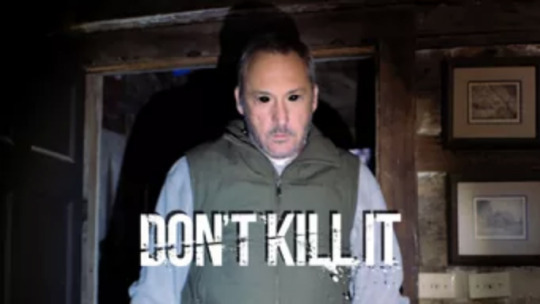
11. Don't Kill It
Don't Kill It is a fun amalgam of horror, action, comedy, and western from director Mike Mendez (Big Ass Spider). A rash of homicides - in which each killer murders the previous killer - lead FBI agent Evelyn Pierce (Kristina Klebe, Halloween) back to the podunk Mississippi town she once called home in order to investigate the case. She reluctantly teams with Jebediah Woodley (Dolph Lundgren, Rocky IV), a self-described demon hunter, to stop the body-hopping demon on the loose. There are a couple of big, bloody set pieces that make the abundance of exposition worthwhile. Clocking in at a lean 83 minutes, the film plays like a more charming and entertaining version of a Syfy original movie.
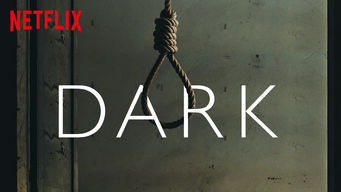
Bonus: Dark
Comparisons between Dark and Stranger Things are inevitable - both Netflix original series concern a mystery of a missing child in a small town in which supernatural elements are at play - but Dark approaches the material in am much more subtle, subversive manner. In addition to Stranger Things' coming-of-age through a genre lens, the German show has the mind-bending rhetoric of Donnie Darko and the mystique of Twin Peaks, with a touch of Back to the Future for good measure. There may be a few too many characters for its own good, but the story - in which a disappearance in the present is somehow tied to similar events that occurred in 1986 - is undeniably well told and well shot. I'm already eager to binge a second season.
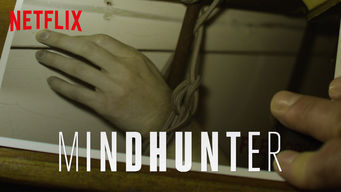
Bonus: Mindhunter
Mindhunter is an original series from executive producer David Fincher (Gone Girl, Seven), who also directs several episodes, with Joe Penhall (The Road) serving as showrunner. Based on the true crime book Mind Hunter: Inside the FBI’s Elite Serial Crime Unit, it follows FBI agents Holden Ford (Jonathan Groff. Glee) and Bill Tench (Holt McCallany, Alien 3) as they conduct interviews with convicted murderers in the late '70s for their groundbreaking work in behavioral science. After an attention-grabbing opening scene, the show takes a couple of episodes to gain momentum, but it's virtually impossible to look away after that. There's an abundance of heady dialogue, in typical Fincher fashion, though it's never short of enthralling.
#netflix#gerald's game#creep 2#super dark times#cult of chucky#mindhunter#1922#best of netflix#article#list
97 notes
·
View notes
Text
INTERVIEW: EX-ARM's Directer on Bringing His Live-Action Experience to Anime

While much of Yoshikatsu Kimura's credits are in live-action, he is nonetheless a big fan of anime. Inspired by Sci-Fi classics like GHOST IN THE SHELL (which he owns the key animation collection book), Kimura will be directing the upcoming anime adaptation of Shinya Komi and HiRock's manga EX-ARM. After directing such films as Karate Girl, as well as credits on the live-action adaptations of Laughing Under The Clouds and Ajin: Demi-Human, Kimura is hoping to bring a brand new perspective to the anime adaption of the Sci-Fi thriller slated to premiere ion January 2021. After stopping by V-CRX for a panel exclusively on EX-ARM, Crunchyroll had a chance to speak with Kimura about what he learned directing his first anime, how he's taking inspiration from Spiderman: Into the Spiderverse and GHOST IN THE SHELL for the project, and more!
First, could you explain the premise of EX-ARM?
The story takes place in Tokyo in the year 2030. It’s about a battle between the police and criminal organization over super-weapons called EX-ARM that have extraordinary powers.
The story begins in 2014. A high schooler named Natsume Akira, who’s scared of electronics, is involved in a traffic accident, and when he wakes up, it’s the year 2030. Not only that, all that remained was his brain, which was now part of an armored brain called “EX-ARM No-00α.” He now has extremely powerful hacking abilities and is told that he’s actually the ringleader behind the terrorist attack that occurred in 2020 that leveled Tokyo, but he has no memory of it. In order to recover his body and memories that were lost, he works with the MPD’s EX-ARM Countermeasures Section to stop crimes committed by the other EX-ARM weapons.
What do you think is most appealing about the EX-ARM project?
The fact that the story takes place in 2030 and that there’s a super-weapons battle in the near future. I spent a lot of time working out the battle scenes. I worked with an action director, an action team, and handled the storyboard for the action scenes as I would for a live-action film, even though this is an anime. And because of that, I think the action scenes will look incredibly exciting.
What is it about the original manga series that makes it a good vehicle for anime?
The fact that you can enjoy this series from the point of view from the protagonist, wondering what you’d do in his situation, and the fact that this is a science fiction story that doesn’t seem that far off into the future. Also, the fact that all of these characters have internal conflicts and we can show how they change throughout the course of the series.

Yoshikatsu Kimura at Virtual Crunchyroll Expo
How closely did you work with the manga author Shinya Komi on this project?
I asked him what he thought were the most important aspects in the original story. While respecting those points, I would ask him if certain ideas I had for the anime were okay as we went along. I wanted to show parts that were not clear in the manga in the anime.
How did you get involved with the EX-ARM project?
Since this project deals with a lot of 3D, they wanted someone who had experience with live-action films, so I was approached by the producers and I decided I’d come aboard.
What drove you to want to direct an anime?
I’m an anime fan myself, so I wanted to challenge myself in making an anime but using the directorial skills I’ve gained from working with live-action films. Also, I knew if we approached the battle and action scenes like we do in live-action films, we could create an anime that’s never been created before.

From the anime announcement promotional video
Is it common for a live-action director to direct anime?
It doesn’t usually happen. I think this is a pretty rare case. I think it’s more common for anime directors to direct live-action. But regardless, I have experience as a director, so I decided to give it a shot. I also think the fact that I’m a newcomer in the field means that I won’t be tied down to how things usually are done and I may be able to bring something new.
Did you have any expectations as to what directing an anime would be like? What did you learn most during this process?
Being released from gravity. All of the scenes I had in my head weren’t tied down by gravity for once and were freed. What I learned the most is to be able to give even more elaborate direction than what’s playing in my head. I want to make sure that all of the images move seamlessly. With live-action, I mold something that’s already there, but with anime, we have to make everything from scratch, so that was a huge difference.
What skills are you bringing from your live-action directing experience into directing EX-ARM?
I think my biggest contribution is my communication skills. I was used to talking to all of my staff at once, but with anime, since every part of the production is so fragmented into various teams, I was able to go around to each team and keep in close contact with them as we worked along. As for the direction itself, I’ll be using all the experience I have with camerawork and since my mind won’t be tied down by gravity like it is sometimes when working with real-life actors, I’ll be able to showcase a reality created with that freedom.

From the anime announcement promotional video
How did your past live-action experience help you to direct anime?
The first thing is that this project has a lot of 3D backgrounds, so it was easy to do some realistic camera work. The second thing is that since I’ve been moving actors in their acting, I can also move the characters as they need to be in the scenes, as well. And also, I’ve called upon the team handling the action to help me with the action sequence storyboards, since that’s how it’d be done on a live-action project, and since the action is going to be one of the highlights of this series. I think my experience will help me create some very impactful scenes.
Are you inspired by any famous movies?
There are too many to name. If we’re talking about this project in general, I think maybe Spiderman: Into the Spiderverse, and GHOST IN THE SHELL.
Are you inspired by any famous directors?
Christopher Nolan. I want to be able to pull off direction as elaborate as his.
I understand EX-ARM will be a 3DCG anime project. Why make it a 3D show instead of a 2D one?
I wanted the audience to actually feel like they’re in that world themselves, so to speak.
What do you think is most important when trying to make a 3D anime work?
Every single frame and cut of the camerawork are important. And because of that, I needed the camerawork itself to be one of the players in this world.

From the anime announcement promotional video
Are you an anime fan?
Of course. I’ve been watching anime ever since I was little.
What anime did you watch growing up?
When I was really little, I’d watch TV anime like Doraemon and Gundam. When I was a young boy, I watched Captain Tsubasa, Fist of the North Star, and other Jump anime series. Then eventually, the Studio Ghibli films. I would basically watch what was popular at the time. I think the piece that was the most impactful to me was GHOST IN THE SHELL, though. This is the only series I ever bothered to get the key animation collection book for.
Do you have any messages for fans looking forward to watching EX-ARM?
This anime is full of new endeavors and we’re waging war against the various sci-fi properties throughout the world. I hope that the audience is able to enjoy the battle scenes with the superweapons and be able to address the conflict of, “What does it actually mean to be human?” along with the protagonists.

0 notes
Note
Please write something about how to deal with the Naya Rivera situation. I'm so upset.
Hey Anon,
The first thing is to acknowledge your emotions for what they are: a grief response.
While some people may say that it doesn’t make sense to get worked up over something a celebrity has done—even one’s favorite celebrity—the truth is that a fan’s relationship with the media they consume and the people who produce that media is complex and deeply emotional.
Storytelling and representation can make deep impacts on the ways in which we perceive ourselves, so seeing someone who helped to tell one of your favorite stories or who in some way represented a crucial facet of your identity in media do something disgraceful or even pernicious can upset your sense of self and cause you to feel conflicted and hurt.
Based on your message, I’m guessing that Naya’s work and advocacy have probably meant a lot to you over the years. You may have looked up to her. You may have seen yourself in the characters she has played.
Seeing this situation unfold has probably challenged your notions of her and maybe even affected your perceptions about the media she has helped to create. You may feel uncomfortable thinking about her and her work and be unsure as to how to continue to engage with characters, music, and storylines you have long loved. It may be hard for you to look at Santana and/or Brittana and enjoy them anymore. Doing so may even be triggering for you, depending on your past history.
If so, then what you’re experiencing is a kind of loss, and it’s healthy for you to treat it that way. You have to allow yourself to process your thoughts and work through your feelings.
The tricky thing is is that there is no one right way to grieve, and everyone’s emotional journey is going to be different. I can’t offer you a “one size fits all” fix for your grief or tell you the way you ought to react. All I can do is offer suggestions.
I put them after the cut.
_______
So the first thing I suggest is to allow yourself to feel what you’re feeling and truly grieve.
It’s okay if you’re sad. It’s okay if you’re angry. It’s okay if you’re confused. It’s okay if you’re all those things at once.
You may see other people in fandom spaces reacting differently to this situation than you are, but don’t spend too much time comparing your reaction to theirs or trying to force your reaction to match anyone else’s.
Though the fandom is in many ways a collective, it is made up of individuals, and everyone comes to fandom with different experiences, meaning that while this situation may be hitting you hard, others may be less affected. Some people will need a lot of time to grieve. Others will need no time at all. While your primary emotional response may be sorrow, your best fandom friend may instead feel anger or incredulity. There isn’t one right way to feel about what’s happening or to respond to this news.
Just focus on what you feel and give yourself the time and emotional space that you need to work through your own reactions.
Remember that grief is seldom linear and that you may feel like you’re done mourning this loss one day only to suddenly feel bereaved again the next. You may be fine for a while but then hear a snippet of “Landslide” and all at once be right back where you started.
Sometimes it’s hard to be patient with the grief process because you just want it to be over so you can stop feeling upset, but you can’t rush it. You just have to ride the wave and allow yourself to react as much as you need to. There’s no single timescale and the five stages don’t always happen either in order or individually. Nothing about grief is neat and tidy.
Permit yourself to feel what you need to feel, and realize that your paradigm is probably going to shift.
—which brings me to my second suggestion, which is to carefully curate your media for the next while.
After everything is said and done, some people in the Santana/Brittana fandom are going to want to continue engaging with Naya’s past work, but others are not, and only you can decide where you stand on the issue and what makes you comfortable.
When certain media has meant a lot to you—and may have even bettered or saved your life—it can be really difficult to decide how to proceed when an actor involved with that media has done something you object to, particularly if you are a fan who is conscious of the facts that storytelling doesn’t happen in a vacuum and that continuing to support celebrities who are abusers can have serious implications for their victims.
I can’t tell you what you’re going to feel about Naya/Glee/Santana/Brittana once this situation plays out in full. I can only encourage you to be gentle with yourself over the next few days and weeks.
If seeing Naya, Santana, and/or Brittana is in any way upsetting or triggering to you, then blacklist those words and images using Tumblr Savior or even consider logging off your fan sites for the time being. You may need to avoid clicking links to the updated news stories. You may need to unfollow some blogs. You may need to stop watching old episodes or listening to old music.
It’s possible that you’ll eventually want to return to engaging with media involving Naya, but it’s also possible that you won’t.
In the event that you don’t want to return, tell yourself that what you’re doing is okay. I know that walking away from media you once loved can be a confusing and emotional process, and it may even feel like an act of disloyalty. But the important thing is to do what you need to so that you can feel safe and healthy and process your grief.
One of the hardest things about seeing someone we’ve once admired do something that we can’t condone is feeling that somehow the well has been poisoned—that all of the good that they may have done for us in the past has been undone by the bad thing they’ve done in the present.
If you do end up walking away from this aspect of your fandom life, please know that doing so in no way invalidates or changes the things that you have felt and learned to this point in your journey. If Naya’s portrayal of Santana helped you to understand and accept yourself and your sexuality, then that’s a good thing, and you don’t have to feel guilty or invalid.
Though the media itself may be tainted for you, the discoveries you’ve made, the healing you’ve experienced, the friendships you’ve forged, and the art you’ve created still count for good in your life.
If you need to express your feelings about this situation, then do so. Write a reaction post if you need to. Confide in a trusted fandom friend if you can. If you feel helpless or like you need to take action, consider doing something to support victims of domestic violence or raise awareness.
At the same time that you are curating your own media and figuring out your best course of action, allow others around you to do the same.
As stated above, everyone is going to process this situation differently, and you may have friends in the fandom who need different types of space and amounts of time to grieve than you do.
Be conscientious about your tags and reblogs. Be respectful of what your friends and mutuals may or may not want to talk about. So many people all over the world have personal experience with domestic violence situations, and it is important to be mindful of their trauma.
My final suggestion is to talk to someone if you need to.
If you’re struggling, reach out for help to a family member, friend, counselor, or hotline. Don’t feel like you have to process your grief alone because you don’t. There are people who are willing to listen and who want to help.
I’m thinking of you, Anon, and my ask box is open if you need it.
Be good to yourself.
15 notes
·
View notes
Text
Diary of a Bodyguard: Client Safety and ‘Care’
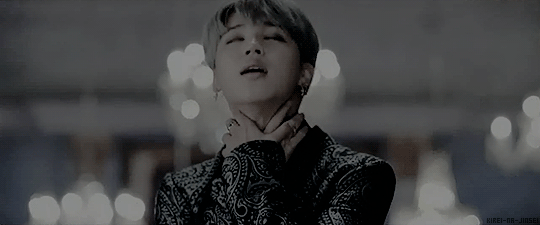
Fandom: BTS (K-pop)
Characters: Park Jimin, Reader/Insert
Warnings: smut, sub!Jimin, fem!dom
Rating: NSFW
Word count: 9k +
Summary: Being a bodyguard, and a female one at that, was never going to be the easiest career path of choice. But when hired to ensure the protection and security of a touring k-pop boy band, it all seems worth it for one peculiar and unforgettable encounter.
A/N: It’s my BTS debut! Despite initial mixed feelings about this one-shot, I’ve overcome my personal conflict and decided to share this. Tbh I’m not 100% satisfied with the final draft; too many reasons to list, but there ARE elements I’m proud of. If I’ve learned anything from this drawn out process, it would be to STORYBOARD! I’ve since discovered the talented jeonjagiya and her ‘tips’ for aspiring writers - check her out! I really hope you guys enjoy this <3
Disclaimer: This work of fiction is written for entertainment purposes and is not a report of true events or an attempt to libel the persons represented.
The air is cool tonight; a precursor for autumns coming. It's enough to warrant a light blanket about your shoulders but decidedly, the windows remain open, preferring the fresh air. The evening has unfolded without expectations nor objective, free to indulge in relaxation and calm. By your design, these moments are fleeting however appreciated. You can't tolerate idleness, thriving on purpose and commitment. Beep. The personalise tone of your smart phone draws you from contemplation. Unlocking the device, an alert identifies an email occupying your inbox. It's work, and more importantly, it's marked 'urgent'. Arousing your intrigue, you proceed to read the emails content without further delay and soon discover that you've been nominated for an assignment. As you continue to peruse, you note information of particular importance; a select few from the agency, yourself included, would be an addition to the security detail touring across the country. If accepted, you'd be contracted for a month which was an unusually long period in comparison to other assignments. The email concludes with an expression of your presence being required immediately.
Well that doesn't leave much time, does it. With a simple phone call, you confirm your acceptance and receive flight information. The prospect of steady work was exactly what you needed. Discarding the phone on the bed, you rummage through your wardrobe and withdraw a suitcase from the confinements, and proceed to organise the essentials for a month away from home while wondering what the future might entail. Being a professional bodyguard provided the occasional thrilling story to share at gatherings.
This assignment would be no different than any other job, clientele typically being public figures, rich and powerful or both; businessmen, politicians and celebrities alike. During routine introductions, you could pinpoint the exact moment of scepticism which was both expected and ignored. This was a male dominated profession after all, and being anything but was distinguished as being everything but capable. You might possess the stature and exceed the standard requirements of the profession, but it wasn't enough to convince some otherwise. Yet, however tempted, you made no deliberate act to showcase physical prowess or allow ego to influence your actions. You completed each job, ensured the safety of your clients, and that ultimately mattered above all else, even if they didn't express gratitude for your service.
Most jobs were uneventful but occasionally, physical but minor intervention was required to deter an unwanted admirer or, and most commonly, the media. Displays of force were rare and the stereotypical 'brawn over brains' ideology is ill favoured. This isn't a Hollywood feature. A bodyguard is expected to have confidence, common-sense and good communication skills with their client and those involved in maintaining security. It's a common misconception that defensive training was the one and only prerequisite for this career path, and you've lost count how many times the awe exhibited by those who inquired and discovered otherwise.
It was still early days, having been in the profession a couple of years and thereby considered a novice. Eventually, given enough experience and a superior list of credentials, you would go private and work as a personal contractor, but until then you had enlisted at an agency and bodyguards were hired on a 'need be' basis. Contracts were generally short, anywhere from a couple of hours to a full day and sometimes a week at most, but generally no longer. But occasionally there was the odd contract that was for an extended period of time, and one such assignment had been appointment to you.
That's about it, looking over the packed case one last time. It'd be an early start tomorrow, and with that in mind, you ready for bed. The final, fleeting thoughts before sleep consumes consciousness, is that there was nothing else to worry about. Living alone did come with its perks; you could come and go as you pleased.
The venue is vast and situated in the heart of the metropolis, commanding attention of the area. Peering through the window of the taxi, your eyes travel up the advancing brim of the stadium, marvelling at the architectural feat. Must be drawing quite the crowd tonight. Your warm breath, traced with two necessary coffees, mists the glass, obstructing your view. You fall back into the seat, attention diverting to snippets of radio conversation. The event is drawing media coverage.
The bulking figure of the second agency representative sits beside you. Blake. Of all people, you're thankful he was chosen. He's fifty-something, family orientated and had been in the profession for over twenty years now. Ex-military and that's all he'd ever mention. He had been the most welcoming and non-judgemental. He never underestimated your abilities, allowing you to make mistakes and acknowledge and learn from them. He reminded you of that Australian actor; the one who played the grisly superhero. Only Blake wasn't grisly, not in the least, but he utilised his appearance to his advantage. People think twice about fucking with a guy who looked like him, but he was the biggest softy. Though bilingual, his linguistic skill couldn't offer assistance for this assignment, but he offered experience gained from working with a variety of clients. This assignment was nothing he hadn't done before.
Besides the carer choice you shared with Blake, there was one other thing for certain that you had in common: a thrill and desire for power and control; to be of service to someone in this capacity is an awesome feeling. Not long after entering this line of work did you realise that it reflected your personal life. Others at the agency had learned early on that you weren't a 'piece of ass' who thought she'd try dress-up for fun. It took one incident and one idiot for everyone to realise you intended on maintaining a tight separation between you personal life and work life, and that no one was going to succeed wooing you with such alpha tactics. It was laughable. Imagine their surprise should they know your preferences delved into different territories.
The taxi eases to a stop and you abandoned the thought. As Blake settles the costs, fully redeemable by the agency, you exit the vehicle. The contrast of the artificially heated air and fresh breeze is felt immediately. It was colder here, the city experiencing full blown autumn, and unconsciously you tug the collar of your jacket up to shield your neck. As you're inspecting the area, you feel Blake presence at your side.
“The cavalry has arrived,” he boasts enthusiastically.
You roll your eyes in response. “Oh yes. Very fearsome.”
“When you've seen what I have, two people can make a hell of a difference.” His reflective response was a testament to his wealth of knowledge and experience, and served to highlight your naivety, but you respected him nonetheless. “Come on. Let's get inside before my nipples erect.” And then he said something like that.
Flanked at his side, you match his pace with steel resolve and the cold forgotten.
On entry, you're welcomed by the facility manager and introduced to the tour manager and the head of security whom would coordinate alongside Blake and yourself. Blake, being a natural born leader and surpassing you in experience, was the agencies chosen representative and primary liaison between the facility staff and those who have hired the agencies service. It had taken time and understanding of this business to accept that you wouldn’t command respect without first earning it, and made all the more difficult to do so because of your sex. During your transition into the workplace, Blake had offered advise on the matter.
“Don’t let anyone, especially your client, see when shit gets to you,” he’d said. “That's a disadvantage you can't afford.”
Like much of Blake’s advice, you had adopted it if it meant bettering your service. With that in mind, you’re attentive, listening keenly and never straying to distraction.
An identification lanyard now hangs about your neck in addition to the uniform. The dress code was optional within reason but personal preference was dictated by the nature of the job. Foreseeing the long hours, you decided comfortability is a sensible choice. You're dressed in the standard company shirt, tucked into fitted cargo pants and finished with a belt and boots - cushioned insoles included. You favoured a tight pony tail and light makeup to refine a natural appearance. Blake and yourself are equipped with a two-way radio receiver; no dark shades, no suit. It's about practicality and sensibility.
Introductions conclude and swiftly eventuate to the next task of importance: a tour of the stadium lead under the guidance of the event security coordinator. It allows for the opportunity to familiarise yourselves with the environment and learn the layout of the venue, noting key areas such as the main entry and exit points, stairwells and bathrooms, and public and private access. Some areas are a maze of passages that you aim to commit to memory.
Local law enforcement will police the parameter of venue and surrounding areas to appropriately navigate traffic, while facility security will monitor the entrance booths and patrol the corridors and seating area. Private security, being Blake, yourself and the Korean security detail, would operate backstage for that was where the clientele would be situated. For this venue alone there were two scheduled concerts over two nights. Proceeding, there would be an additional recoup day before setting off for the next city and there the routine would repeat again.
While knowing the environment was just one aspect of the job, knowing your client was another. Would they listen and respect your judgement? Were they prone to risk taking or attention seeking behaviours? If so, they were more likely to draw attention, often adverse attention and that's when security was a necessity. Certain clientele were more notorious for such behaviour. You didn't believe in first impressions, hell, you were all too familiar with the misconception, but meeting your client for the first time gave you a sense for what you might expect of them. Intuition was a skill that would be refined in time.
The train of thought keeps you occupied during lunch. It was one of the few but appreciated perks at large events such as this – free food. While the time allowed, you check your phone and send replies to inquisitive friends and concerned family. Before you become too comfortable, the radio crackles and Blake's distorted voice sounds from your hip.
“Up and at it. We've got incoming.”
Taking the receiver in hand, you mumble, “They're early.” Taking another bite of your sandwich.
“And you're still sitting on your ass.” You pout at the device. His intuition was kinda scary.“You're still on your ass. East entrance. Now.”
You resist a mock salute, instead stuffing the remnants of the sandwich into your mouth and brushing the crumbs on your pants. Without further hesitation, you're marching to the destination.
Outside, security gathers and awaits the expected arrival. This entry was strategically separate from civilian access and allowed for the discrete arrival and exit of high profile visitors. A reinforced, automated but staffed security gate was the first check point that filtered entry. Cement barriers shield either side of the road to minimise civilian contact but as Blake points out, the secret entry isn’t so secret. Amused, you observe the small gathering of fans lining the erected barriers - a thriving hive of excitement. Fangirls and fanboys. They never failed to know when and where to be. Their dedication and sources commendable.
The buzz intensifies and you adjust your gaze to the road and observe a sleek, black limo inbound. Passing through the first security check, the limo gains entry and passes through a second check, navigating the road to the venue entrance. Faces indent the fence, peering to claim an advantaged view of the limo. The vehicle parks and the Korean security detail stiffen in attention. One of the doors open and as if on cue, the distant but unison scream announces your client's arrival, and there were few reasons for this particular type of hysteria and loyalty.
A boy-band.
One by one, the idols emerge from the vehicle and silently you count, brows raising a fraction when the number continues to exceed your expectations. When all the members are gathered, you've counted seven in total. Seven surprisingly attractive young men. They could be no more than a few years younger than yourself. They assess their surroundings and you watch as a mixture of curiosity and reservation play upon their delicate features. They're ushered along and the crowd ensures to showcase their undeterred enthusiasm, and like a protective shield, Blake, yourself and the other members of security escort the musicians inside.
Settled inside, the idols are addressed by the tour manager. The conversation is lost on you but the interpreter kindly shares information of importance. Before long, the interpreter steps forward and joins the conversation, gesturing to Blake and yourself. There is a moment of awe and some exclamation which is quickly attributed to the attention directed at your person, and it didn't take a genius to summaries the cause. Their reaction and naivety is too comical to even feel a mild sense of irritation toward the group of guppy-faced musicians. But without fault, you maintain the practiced poker-face, staring long and hard at them.
“Oh! She's so serious.”
“And looks so strong! Do you think she could lift me?”
“With those chicken legs, anyone could lift you.”
“Naw! You're so mean!”
They break into laughter, two shoving each other playfully. You restrain a smile, finding their exuberance contagious though ignorant of what was said. Their manager hushes them and the group simmers to a contained titter, and the discussion continues further interruption. You offer Blake a sidelong glance who smiles with understanding. Remain impassive to provocation, he had once said. This was unlike typical circumstance, but it was important for clients to understand the seriousness of your role and that you weren't easily influence by emotion and a damaged ego.
Time allows you to study each idol, one by one. The email had proved minimal detail on each member, but as personally expected, you had memorised all seven, and was able to select a member at random and assign name to face, even if you weren't confident about pronunciation. They exuded boyish charm and energised charisma, and combined with their youthful attraction was the perfect components for successful entertainers. But what of their talent? You imagine they sung and perhaps danced, but there needed a special ingredient to the mix. Inevitably, you would see in time and as if on cue, the interpreter mentions that they would proceed for practise.
Construction of the stage is near completed with minor adjustments being carried out by stage technicians. A large LED screen extends the stage anterior, flickering with random colour as staff ensure the interconnectivity of every panel. Metal beams raise above and across the foreground, outfitted with spot lights to capture the performance. The stage itself features a large rectangular platform from which a thin path extends from its center, pathing far across the green lawn and to end at a smaller platform. A fence, somewhat flimsy in appearance, surrounds the parameter of the stage and its extension; a meter in width would separate the compacted bodies from the stage and allow security to patrol the barrier, and camera-techs to capture the performance.
With a wardrobe change, the idols are ready for practise, guided by their stage choreographer who motions at different areas of the stage. Blake and yourself roam about the foreground, familiarising yourselves with the area you would spend a better part of the two days. Minimising interference with the group, you follow Blake as he inspects the fenced barrier, pointing out access onto the field, voicing comments aloud, more-so to himself, but you listen. He was thorough, nothing not worth his attention.
“What do you see?”
You regard him briefly, not surprised by the question, then you survey the environment, formulating a response.
“Low risk gig in my opinion. It’s a large venue but considering the demographic, attention will be focused on the performance. Stage-crashers are always a possibility but a minimal one at that.” Blake nods in agreement and you feel like you’ve successfully passed an informal test. “What’s the estimation of sales?”
“Surprisingly, ninety-thousand for the two nights.”
Those were good numbers. They were more popular than you'd given them credit, having not heard of the pop group before this assignment.
Blake spies your contemplative expression and asks, “What of them?”
Sparing a glance at the idols, you summaries your impression of the seven members since introductions and casual observation.
“Babysitting.”
Blake laughs, the arena enhancing his booming voice, briefly drawing attention to yourselves. Perhaps it was harsh and perhaps you were right, but it honest. You predicted that the dressing room wouldn't be trashed nor would you and others have to monitor inebriated persons. They were well mannered but no less enthusiastic and potentially prone to some mischief.
“I can see why you think that.” He grins. “They might surprise you.”
You snort, “I doubt that.”
He chuckles in response, entertained, and with laughter still rumbling in his chest, he retraces the path of the stage, skirting the main platform until you’re both backstage. He then mentions something about having to see to matter and instructs you to remain, throwing “Keep watch, Nanny” as he leaves.
Asshole, you think fondly.
True to his word, your attention trails the idols while monitoring the immediate area. They venture about the platform and extension, getting a sense for the area on which they'll perform. It's not exactly a riveting spectacle but remember that you're not being paid to be entertained. As they make their way back to the main platform, the stage choreographer barks a command which is answered with blaring stereo. The slow introduction of music piques your interest, casually observing as each member claims a position of the stage as the music gathers momentum. Then the beat drops and idols break into dance.
The hip-hop composition is fast-paced and memorised flawlessly, and the longer you watch, you note subtle variations in each members expression of style. They're good, you admit, really good. Impressed by the skill and choreography. As they disperse across the stage, you wander out from the sidelines to spectate. It just needed a sell-out audience to complete the picture. The music begins to ease only to transition into another song and more choreography. You were no dancer, but it rivalled everything you’d seen. The stage choreographer monitors the performance critically but seemingly satisfied.
This continues for a another four songs until the music lulls to a stop. They relax, dropping the staged composure to break into conversation, laughing heartily. The performance has certainty alleviated your bored disposition. As you observe the scene, flitting from one idol to another, you're caught by surprise to match gazes with one member. It's purely accidental, you're sure of that, but he doesn't shy away, holding the connection long enough for you to question his attention. However, the brief moment is severed when he's addresses by another idol.
You think nothing of it.
Rehearsal recommences and you continue to watch, loitering at the sidelines, but ignorant of a habit you quickly develop. You’d never considered yourself prone to distraction, but unconsciously, your gaze frequently strays to one particular member. It’s when you catch yourself, suddenly aware your gaze lingered unusually long and potentially risked being exposed for unwarranted attentions, is the habit realised. You're perplexed for the reason alludes you.
This new found distraction goes by the name: Park Jimin.
Though the encounter had been uneventful and meaningless, since chancing a brief but mutual connection between yourself and silver haired idol, you can't expel a growing curiosity toward him. The exchange was enough to capture your interest, so you indulge in the curiosity with hopes it might explain your gravitating gaze. Before, your attentions were without cause but now with new-found focus. You study the way he moves and intensity of expression as he dances. Perhaps you contemplated unnecessarily and studied too long, fostering a growing attraction, yet your mind wanders to dark places as your eyes unconsciously track his movement.
Get a hold of yourself, you chastise. It wouldn't do you any favours to indulge in such thoughts, especially while on the job and about a current client. Banishing the images, focus returns to the stage where rehearsal has since concluded and you're unexpectedly caught by the mutual attentions of said person. You’re ensnared by his gaze, provoking alarm at the blatant regard and find yourself shying away with an irrational fear that your thoughts are projected for him to know. With mustered composure, you casually cast your eyes around to portray casual but purposeful intention in being there, and hoping to ward off inadvertent attentions. When you gauge enough time has passed, but against better judgement, you chance a glance toward the group with intent to single out Jimin only to be caught off guard. He's expectant, a sly smirk playful upon his lips and you wretch away as if burned, heat colouring your face. Shit, silently cursing the indiscreet conduct.
Hushed conversation and smothered giggles prickle your ears and too often do you suspect eyes to palpate your ridged form. They are, thankfully, more discreet than your previous behaviour. You look anywhere but at the group and try to maintain a low profile, remaining out of sight and beyond the reach of prying eyes, allowing the wordless interaction to dissolve – hoping it will.
Blake returns with five minutes to spare before practise concludes. He doesn't comment on your changed demeanour. If it didn't compromise the assignment, he wouldn't ask questions, but his silence is provoking, if not more so than verbal inquiry. Internally, you're frazzled at having been so careless and so easily provoked. It was unlike you and that is what concerned you most. You had allow personal indulgence to interfere with work. It was a set-back but you'd mask the damage while repairing your professional persona.
As the sweat soaked idols are escorted to their dressing room, your attention stares pointedly ahead, resolute and refusing to give consequence of those whose gaze might drift your way in want of something. When the dressing door closes, concealing them behind its confinements, you sigh with relief, stoicism dropping. Blake observes the immediate change and while ignorant of what transpired in his absence to necessitate the hardened demeanour, he offers comfort in one of few ways he knows you'll accept.
“Coffee?”
You needn't consider his offer long before nodding in agreement.
Sinking into the couch that you'd befriend earlier, steam rises from the styrofoam cup of cheap coffee cradled between your hands. The couch shifts, Blake following your motive. Only silence exists between you. That was another quality you admired about Blake, he re-framed from making unnecessary small talk. The silence is comfortable and welcomed, and you absorb the quiet atmosphere and allow it to clear your mind, reclaiming peace within yourself.
Sometime later you're being nudged awake by Blake, having apparently dozed off. The slightest movement jars the crick in your neck and you grimace at the pain, grumbling complaints.
“Come on, off your ass.” And he offers his hand. You resist shooting him an irritated look, instead taking his hand and allowing his strength to haul you up.
With a series of stretches and carefully testing the movement of your neck, you're satisfied with manoeuvrability and give Blake a thumbs up.
The seven manned group has since been escorted backstage. The collective chanting of thousands of fans is all anyone can hear. Watching the idols as they're equipped with ear-pieces and microphones, you observe a mixture of churning nervousness and adrenaline fuelled excitement. There must be something about performing before thousands of people, you contemplate, that no matter how many times, you'd never get used to it. The group comes together and embrace each other, and you find that it's not just yourself that witnesses the scene fondly, silently wishing them the best.
The lights dim, the crowds hysteria explodes and the idols claim the stage under the darkened disguise. The darkness doesn't subdued the crowd only encouraging their echoing need. The music commences and the stage is illuminated with brilliant light, revealing seven stationary pop-idols commanding the undivided attentions of everyone within the vicinity.
Then it starts.
It was what you'd seen at practise and so much more. Was it their stage presence? The sharply styled clothing? Or maybe they were just really fucking talented? Whatever the mysterious equation, you see for the first time the sum of all those components: a successful boy-band.
Blake was right, you realise. You were if not more than surprised.
Throughout the concert, the idols dash backstage for impressively quick wardrobe changes, and on the first occasion you automatically turn away. Blake's amused by the considerate if not innocent gesture, his laughter barely audible over the combination of cheering and music. You resist shoving him but he can discern your desire to do so and it only provokes him to laugh harder. On the second occasion, you stubbornly refuse to turn your back, instead choosing to avert your eyes. Blake appears if not more entertained with this development, a shit-eating grin plastered across his face. It proves challenging to purposefully ignore him while maintaining the privacy of the changing idols. Yet, try as you do, their frantic movement occupies your peripheral vision, and it takes just one slip.
Your gaze strays, like it had before, and the timing couldn't be worse. At least half the group is naked from the waist up, their sculpted torsos bear to the chilled night and wandering eyes. It wasn't on purpose, you swear, blaming a higher power for the unfortunate timing, but the damage is already done. Jimin is a vision of everything you never realised you desired. Though the lighting is poor, his lithe body is perfectly contoured, defining crafted muscle and holy shit those abs! Not only that, his pants appear insanely tight and you can only image it would take only a flex of muscle to reveal the toned thighs beneath. Sweat glistens upon his chest and neck, and your eyes follow the trail, even appreciating the damp locks. When your gaze meets his, you realise your repeated mistake. He knows your thoughts and you're afraid of what you've unconsciously let slip.
He disregards you so easily, resuming the task of changing clothes. You're acutely aware that he doesn't conduct himself with the same haste as his fellow band members, instead taking pleasure to leisurely indulge in dressing himself. As he pulls on a white singlet, unmistakably his hooded gaze shifts to you, as if to confirm your attention lingered still. Then with deliberately obvious intent, one hand grips the buckle of his belt, pulling at it suggestively to reveal more skin as the singlet is slowly lowered until his torso is eventually concealed.
In that moment, you're many things; perplexed, embarrassed, amused, and just a little turned on. Your mind is in a state of shutting down and rebooting that you can't possibility control your stunned, slack-jawed reaction. And Jimin, seemingly satisfied with the outcome, breaks a crooked smile, taunting you as he shrugs on the accompanying jacket to complete the outfit. It's enough to make you remember yourself, mouth snapping shut which causes him to snigger. How his little exhibition has transpired without notice is beyond you, quickly analysing the attentions of those nearby, yet miraculously it has. It remains a secret shared between yourselves. You return a steady gaze, a smile fighting to break free, so you cross your arms for good measure. He laughs again, the expression so delicate you don't know whether to hate it or love it. The moment is however, fleeting, his attention claimed by a member who clasps his shoulder and gestures to the stage.
With his ploy forgotten, Jimin jogs away along with the six other members. The elevated mood evaporates quickly but leaves a desire fostered by his actions. This was the first day for Christ sake!
The remainder of the night is uneventful, in one particular sense, but a success for the idols. The crowd roars with applause; thousands of fans crying simultaneously with joy and anguish at the concerts inevitable conclusion. The members provide one final bow, waving and throwing kisses to the audience as they withdraw backstage. Their manager intercepts them, gushing praise and the boys congratulate each other in a rowdy manner. Though what you thought matter, you're happy for them; they had earned it.
Jimin and yourself don't cross paths again that night. What's odd is that you take notice of that fact.
Minutes from midnight and comfortably settled into pyjamas, you sit cross-legged on the hotel bed, and it was a relatively nice hotel, you note appreciatively. Conveniently situated near the venue, it was but a five minute fare. The agency hadn't been too frugal with expenditures. The room divider, a pair of sliding doors, is open providing unrestricted view into the opposite room. Blake and yourself, like minded at times, are irrevocably attached to your phones. For the past ten minutes, you've persistently scrolled through Spotify in search of the familiar tones of the songs you've been repeatedly exposed to today. With each successful find, the song it added to your play-list and growing variety of music. All the while, you've unconsciously subjected Blake to the incessant skipping of music during your determined search.
“At least use your headphones.” He grumbles.
“You're welcome to close the door,” you reply dismissively. He glares but the non-verbal retaliation goes unnoticed as your attention never strays from the device in-hand.
“Do you want to coexist amicably these next few weeks?”
It's more so the tone than the question itself that successfully pries your eyes from their attachment to regard Blake. He stares dangerously with prospect of the repercussions should you not head his warning. The last thing you needed was to piss him off and warrant his wrath.
“Fine,” you drawl, muting the music. “I won't torture you unnecessarily with my music. So long as I get to smother you if I'm woken by your snoring.” You counter.
“Can't help that I snore,” he sniffs.
“Help it.”
He removes himself from the bed, all the while grumbling 'it's not my fault' and 'you started it' as he closes the sliding door.
“Goodnight!” you call, laughter colouring the expression.
With the negotiation concluded, you decided it best to follow suit and retire. The following morning, you take delight in goading Blake, reporting that you slept soundly and without disturbance. You cease his torture when he lunges for your phone.
You expected day two to play out much the same. Fully rested, you're prepared to bounce back into routine. Ahead of the bands arrival, Blake and yourself reviewed updates from the facility and tour manager. There were no issues reported from the night before. No security breached. All is well and was positively assured for the second and final night at this venue.
Blake wittingly assigns you to babysitting duty, payback for last night. Despite his best to rile you, and though you wouldn't admit it aloud, you can't deny the nervous flutter at the prospect of coming face to face with one particular idol in light of yesterdays incident. But such concerns are masked behind neutrality.
The stage had been substituted for a large rehearsal room. You overhear the commotion behind the door, the group expectantly enthusiastic. Really, there was no need for your presence within the room, but you needed to confirm they were all accounted. Perhaps overly formal but you choose to rap on the door before entering, the room quietening at the sound. You're meet with the inquisitive stares of all within.
“Hello!” One idol shouts, waving animatedly.
You’re taken back by the greeting. The idol in question possessed a sunny disposition, Hoseok, if you remembered correctly, and inwardly you warm to his friendly nature and offer a smile in return which serves to inspire to a winning grin, all cheeks and teeth that he boasts to his peers.
“See, she can smile.”
“Nobody said she couldn't smile.”
“Her eyes are expressive.”
“Yea, they express a special something for Jimin!”
The group explodes into laughter, evidently Jimin being the target of the fun as he’s affectionately jostled by the other members. The corner of his eyes pull in an attractive fashion, cheeks dimpling as he laughs along with them. You take caution during your observation, wanting to avoid a repeat of yesterday, but you acknowledge the difficulty of ignoring his person.
Without that thought occupying the back of your mind, you ascertain that all seven idols are accounted for.
Someone claps suddenly, jolting you from your fixed daze and quietening the rowdy group. He commands the attention of his peers, exhibiting leadership as he addresses the six youths. So he was the band front-man, you deduce, the smooth confidence of Namjoon radiating. His tone is affable, speaking with purpose but as their equal. When he concludes, he utilises a remote to commence the music. Everyone disperses, claiming formation across the buffed, wood floor to perceive themselves in the full length mirrors of the feature wall.
You needn't stay, reasonable that the room could - should - be guarded from outside, but gravity fastens you still, and you don't fight, compelled to remain by the unnameable force. Just five minutes, you lie.
The following hour consists of relentless rehearsing but the idols persevere with feats of stamina; their dedication unquestionable. They break twice, replenishing themselves with sports drinks while wiping away the accumulation of sweat. During the first interval, you observe with mild interest, as Jimin is cajoled by this friends, their influence obvious and insistent. He protests weakly, perhaps not overly opposed, but his demeanour expressing hesitance. The nature of the situation, you soon discover, is made apparent when under the influence of their incessant hands, he’s guided toward you. He swots at them impatiently but a smile never falters from his lips. He casts one last look back toward the group and they beckon him forward with words of encouragement and one final push. He utilises that momentum to carry him forward, and as he leaves the safeguard of the group, and all attention invests in the orchestrated union.
You sharpen as he approaches, guarded and critical. He's nervous, you perceive. Radically different to his conduct last night which was strategically hidden beneath stage confidence and an awareness of his physical attraction. He holds his chin defiantly, shoulders tight and square yet saunters with ease that might otherwise fool you. It's his eyes; they evoke innocent intrigue but nervousness. When he pauses before you, you can't help regard his actions with caution. He falters under the severity of your analysis, eyes retreating from your own, perhaps reconsidering the plot of his friends. But the momentary lapse is overcome when he presents to you a bottle of water, somehow concealed. You're shocked by his consideration, the gestured unexpected and sincere. The moment hinges on bated breath, all waiting in eager anticipation of what will happen. You move as if automated, accepting the offered drink, expression softening to betray a subtle smile and he swells with giddy happiness, ducking his head as he grins. He chances a final glance, catching your laughing eyes and flushes. He nods, a polite farewell, and retreats to the safety of the watchful six manned group, openly inquisitive of the exchange they instigated.
His return is met with cheers of triumph, as if he had achieved an incredible feat deserving praise and acknowledgement. It was comical and almost ridiculous, enough that you hide a chuckle before loosening the capped bottle. You take a generous gulp of the cool drink, ignorant of how thirsty you were until the liquid relieves the starvation of your throat, pooling coolly in the pit of your stomach. It was a satisfying sensation.
The heightened mood continues a minute longer and you observe as Jimin engages in whispered conversation, primarily with Namjoon. You can’t fathom the reasoning for their secrecy, but when they unanimously glance your way, you're expectant of another ploy in the making. Namjoon calls the other members to attention and they huddle together, heads lowered as they concoct their plan. Some giggle while others, they too, peek slyly from the sheltered cluster. When eventually they break apart, aligning themselves in preparation of what you perceive to continue rehearsal, what strikes you surprised is that instead of facing the mirrored wall, they face you. While you're acutely aware of the collective attention on your person, it's the attention of one that ultimately matters, and you can't fight the unnerving tickle of excitement and anticipation.
Namjoon holds the remote, poised to commence his shared plan and says, “He said this one is for you.”
You're struck surprised by his fluency, even more so by his meaning, but you don't question it, allowing them to show you. The introduction of a song begins to play and he pockets the remote. Jimin stars centre stage, eyes keen and pointed, a smirk playful upon his lips, resembling the cocky entertainer from last night.
With unison, they break into dance, immersed in the music and perfectly synced. Each movement of their bodies is influenced by emotion; a slave to the songs expression. You're mesmerised, unable to tear away from the performance. A private audience for one. You’re paralysed by their hypnotic movement and gyrating hips. What would presumably be a four minute routine seems longer and for that time, you've forgotten the purpose in being there, that anything existed beyond this realm of choreographed seduction. All that mattered was a growing and dangerous desire that darkened your eyes.
They simultaneously freeze, holding the struck positions. You blink, breaking the spell and finding yourself breathing again, and they too, drop the stance, overcome with exhaustion. It was deserving of an applause of thousands! Yet, in fear of yourself, you dare not move. But he waits, they all did, expectant of some expression or gesture of your approval. He need only a taste validation, enough for him to crave more. It need be something simple and not overly gratuitous. Then an idea strikes you and you must resist smirking.
Pushing from the wall, your heavy boots tread across the wooden floor. You're the epitome of composure and congratulate yourself on the mastered skill. With each step, Jimin's eyes marginally widen, the heighten thrill from his bold performance crumbling, and you saver his unravelling resolve. With precise imitation of his gesture, you present the water bottle, brow arching with silent challenge and perhaps a little condescension. He appears baffled, at a loss to your reasoning, yet still he accepts the presented gift, and it's not until you wink at him on turning away he realises you jest. The barest hint of a smile assures him of your appreciation and he’s left to ponder what has transpired as he's swarmed with eager question of the group.
Before a grin threatens to break from ear to ear, something motions by the door and on identifying Blake, you straighten in attentiveness. His gaze passes over you, interest resting on the clamouring idols. Almost obediently, you walk over to stand at his side, awaiting his acknowledgement.
“How things?” he asks.
You can't help regard him slyly, looking for a trace of the questions subtext, what ever it might be, but Blake hints to nothing, and you should've expected such. Deliberating an answer, you share Blake's regard of the chattering youths, summarising the events of the past hour. Jimin looks over, equipped with a dimpled grin and you find yourself biting you're cheek to suppress the betrayal of a smile.
Confident in you're ability to reply without fault, you reply, “Interesting.”
“Should I be concerned?”
Turning to him again, brows arching, you ask innocently, “About what?”
“That you and pretty boy were blatantly eye-fucking each other,” he replies, deadpanned.
“Harmless, I assure you.” Marking your heart with a cross, yet the sly smirk doesn't inspire confidence. Blake chuckles, a deep heart-felt sound, and shakes his head.
“Try to keep it in your pants.” And you feign injury at the connotation. But in honestly, he needn’t worry. It was all merely innocent fun.
It was time.
One by one the idols leave the confinements of the dressing room, exuding excitement and joviality. They're sharp and styled, a flare of make-up accentuating their fine features. High fashion models beware.
The manager leads the group, two security guards flanking the group, Blake and yourself leading the rear. The corridor is a congested highway of bodies; everyone rushing to ensure a flawless night, though they part to allow the group to pass without being detained. Your constantly on the lookout, a natural instinct; assessing and interpreting risks, not that you expected such but being cautious wasn't wasted effort.
It takes only a matter of minutes to get backstage, the area darkened and noisey. As the technicians are equipping concealable earpieces, you look from one member to another only to realise something.
Six? No, that can't be right, recounting the group. One, two, three...six. But the number adds up the same. Six idols minus one silver haired menace. You've got to be kidding me?! Nudging Blake, you draw his attention.
“We’re one short.” Jutting your chin toward the group. “Park Jimin is MIA.”
He frowns, seemingly sceptic until you watch the realised truth of your comment dawn on his face as he counts for himself.
“How the fuck did this happen?” his tone interrogating.
“I don’t fucking know,” you hiss. “There were all present when we left.”
“You sure of that?”
That you were, having done a head count before the group had been escorted. Something had gone awry between then and now. The corridors had been chaotic; too many bodies crammed together. Something wasn't right, and you spare a look toward the idols who appear awfully amused and shrewd.
“Shit.” You mutter.
“What?”
“ I - no, it's nothing.” Voicing your suspicion wouldn't aid issue
“Nothing is no use right now,” Blake quips irritably. “Find him and make it quick.”
Your lips part, a defense prepped on your tongue, but you let your ego take the hit. So you nod and exit the stage. Once clear of the darkened environment, you break into a jog, swerving between the stage crew who still busy the corridors.
You can't say where he'd separated from the group but make for the bathroom along the way. Bursting through the door, an anonymous man screeches with surprise, compromised by the urinal.
“Don't mind me,” you say distractedly, stalking into the bathroom. One by one, you push open each stall, waiting to meet the resistance of a locked door and hoping to find your missing idol, but your hand meets no such resistance, and the final door is swings open. Shit! That ruled out one area, and that questioned the next destination. Pivoting, you make for the exit, another apology thrown at the still shocked occupant who watches you leave with single-minded purpose.
Emotions coil in your stomach, threatening to expose themselves. You're pissed off, embarrassed, frustrated and concerned. Stalking to the destination, your pulse quickens, heightened by the building anticipation. You better be here! Throwing open the dressing room door, you march inside expecting the worse only to find the source your unnecessary stress, complacent and expecting.
Jimin sits before one of the mirrors, cast in the revealing light of the rectangular arranged globes, highlighting his flawless complexion. His attention diverts from the mobile in-hand, flickering to acknowledge the sudden interruption.
”Took you long enough.” He mumbles.
You're awash with sudden and unexpected relief. He's safe. But the emotion is fleeting, contested by confusion and growing irritation fostered by his lack of reactivity and indifference. He doesn't motion to move or attempt to express an explanation for why he's been found here when he's expected elsewhere. You're honestly confounded by the situation and it only serves to flame your simmering anger.
“Hey!” Aiming to command attention, but you're ignored and it furthers to dominate your surging irritation. “Jimin?” you press, but still nothing. Growling, you storm forward, patience exhausted. Grabbing the back of the chair, you swivel it around and it's occupant until you're face to face. He perceives you lazily and it succeeds to push you to breaking point. Fucking musicians.
Steadying your voice to a wavering calm, you do your best to speak reason.“You. Need. To. Go.” And gesture to the door, hoping he'll understand the improv. He regards the door and you again.
“No.”
You might not speak the language, but you're sure as hell know what a flat out refusal sounds like.
“That wasn't a suggestion.” Plucking the mobile from his hand and pocketing the device. You cross your arms, raised brows daring him to protest. “We're going. Now.” He maintains a leveled gaze and you meet is head-on, unyielding. This was one power-play he wouldn't win. He raises slowly, never wavering, but there is an immediate shift; attuned to an unspoken or gestured change in his character.
His shadowed eyes reflect an ambiguous intensity, and you're gripped by sudden transformation. Automatically, you assume the worst, that you've overstepped an undefined boundary and provoked him. But he doesn't lash out verbally and his physique doesn't suggest anger. Instead, his chin lifts, sudden like, as if to gesture a challenge.
Then, tentatively, his hand reaches out toward and you. Stunned, you watch the seemingly slow approaching hand, but at the last second grasp his wrist, halting further movement. You want to object to this, to whatever this game was, but words fail you, dying in your throat. And you know that your composure has since faltered, expressing perplexity, and Jimin preys on the vulnerability, persistent in his ploy. He steps closer, unbearably close, and your mind is screaming caution; the situations trajectory entering dangerous territory. Abort! Yet, he continues without expressed objection on account of yourself, his unrestrained hand plucking the seam of your collar with feigned interest. His fingers trace the seam, gliding up and down with sensual purpose, coyly watching the conflict play upon your face – gauging for the moment his victory is assured.
“Jimin,” you hiss in warning.
He feigns ignorance, head tilting marginally, teeth catching his bottom lip and god-damn, you're doomed for eternity. Those fucking eyes, wanton and heavy and beckoning - how could you resist? And it's in that moment that Jimin fastens his grip on you, and caught within his carnal spell, you allow him to pull you down, capturing your lips.
It's gentle and soft, barely a kiss, and it's for the briefest moment when he inclines to pull way – reeling in the bait. Such a simple yet profound gesture for your undoing. You act on instinct, claiming what had been taunted. You claim his lips with no intention for gentle gestures. It's raw and hungry; everything that had accumulated to this point. Teeth on teeth clash in the domineering attack, mercilessly claiming those full lips and mouth hot.
But it's not enough.
Your hands, insistent and undisputed, guide him backwards, stumbling blindly past the chair and until the bench hits the back of his legs. Still you persist, urging him back and he catches the hint, propping himself onto the bench-top. He stares, eyes alive and thrilled, and oh, how you want to make him regret it. You want - want everything he has to offer, and he'll do so. He'll beg. Your hands hasten upon his hips, and with a swift tug, pull your pelvises flush against one another. A grin shapes those full lips and you crave them again.
The onslaught of tongue, lips and heat recommences, and you bite into that bottom lip that he had so shamelessly teased earlier. Greedy hands snake beneath his top, mapping and groping everything within reach, all the while devouring him with another kiss. He is all the right components of soft and hard – simply perfect. He gasps into your mouth as a thumb brushes a nipple, and your voracious appetite demands more, pinching the small mound and you're not disappointed.
“Is this what you want?” You whisper, releasing his mouth so that he may exclaim again, and he does. Through gritted teeth he whines, eyes squeezed shut, and its enough to satisfy you, if momentarily.
Delicate kisses trail his jaw, his neck, a balm to the nails that rack across his abdomen with aim to imprint and leave mark of your possession. A souvenir for him to remember you by.
“Have you found Park?”
The radio crackles at the cessation of the transmission and you pause your attack, attempting to process the question through the lustful haze.
“(Y/L/N)?”
You breathe a sigh of frustration against Jimin's neck, growing irritated by the continual disturbance. Inclining away, you pin Jimin with your heated gaze, and reply into the receiver.
“(Y/L/N) here. I've located Park.”
“What's the situation?” His voice unquestionably testy.
“The situation is...under control.” It was so fucking cliché but you can't resist smirking at the double entendre. To prove the point, you angle your hips down and Jimin whimpers.
“Then hurry your ass up,” he growls, ending the transmission.
Impatient asshole, discarding the device on the bench, perhaps too carelessly. Jimin, having regained some composure, quirks a brow in question of the brief conversation. Blake was right and you hate that he was. The concert was scheduled to start at anytime! Jimin, as if sensing the internal battle, wraps his legs about your waist, securing you. He fastens his fingers into your shirt, and tugs incessantly. You level him with a look, rationalising. Events have long exceeded the point of no return, doomed by your actions, and you consider no point to stop now.
Your thumb brushes his bottom lip, admiring its fullness from the abuse of your mouth. Then tilting his chin, you lean in to kiss him gently and slow. While he's distracted, a hand slides between your bodies and grasps the mound of his pants, earning a gasp. You massage and kneed the area, sweet sounds escaping between the breath of space between your mouths. His grip moves to your arms but you're not having that. Distantly thanking your defence training, swiftly his wrists are secured and panted against the mirror. He protests with a whine, but he'll have real reason to protest soon enough. With effortless ease, your unencumbered hand works diligently to unfasten the belt and then the button of his pants. Then with devilishly slow movement, the zipper is drawn down, prolonging the tension. Commando, you note approvingly, and claim your prize, revealing his stifled cock from the oh so tight confinement of his tight pants.
Pretty thing it was, flushed and perfectly girthed to fit comfortably within the grasp of your hand. Testing Jimin's arousal, you thumb the head of his cock, massaging the slit with precum, and he mewls. His expression is agony and pleasure, contorted beautifully; an instrument willingly submitted and at your behest. And glutinous for his pleads, you stroke him with precision to earn such exclamations. Hot, searing kisses mark his neck and jaw, feeling the erratic pulse of his jugular. He resists the hold, arms struggling weakly to wiggle free of the iron-clad hold. You smirk into his neck, relishing in the futile attempt, but reprimand the behaviour with a series of trailing bites for his disobedience. He whimpers into your ear, oh, and what a sweet sound it is. All the while you pump at his cock, fast and dirty – time is of the essence.
You know he's close. He pants feverishly, arching into you, legs straining about your waist. Come on, you urge, eyes keen on his face as you drink in the writhing of expression; pink lips parted and face wrought with pleasure. It was everything. Fastening your hold, the pace slows to controlled, lengthy strokes. He bucks into your hand, so naughty and eager, and then he reaches his peak. He cries out and conscious of the volume, you kiss him, swallowing every moan and exclamation of his orgasm. He spills over your hand but it only serves to fuel the task of maintaining the pace.
When he's milked of everything he possesses, you pull back slightly to appreciate the view. His slack expression is reward enough and you fondly brush his bangs. Now what to do with you? There's a box of tissues on the counter, and plucking a few you proceed to remove his essence while inspecting yourself. There could be no evidence of your conduct. However, on regarding Jimin, you grimace, noting the stained shirt and glistening perspiration. He meets the look lazily, still drunk on his high.
There was a rack of clothes and thankfully they're named. Selecting another top from Jimin's section, not quite a replica of the damage goods, but hopefully no one will notice the sudden wardrobe change. Returning to him, you offer the clothing and he takes it without question. Standing, he tucks himself away, unabashed as you watch. Then stripping off the shirt, you're gifted the chance to look upon him once again; the lighting in your favour this time. He's all too aware of his captivated audience and doesn't cower under the scrutiny. Lastly, he regards his reflection, patting away the sweat and brushing a hand through his hair. Satisfied, he turns to you, offering a soft smile, unperturbed by the events.
It’s difficult to reciprocate his ease.
He strides past toward the exit, and with his hand upon the door handle, he inclines his head in question when you don’t follow. Daunting realisation threatens to ruin your resolve. Fuck. You release a deep, long breath as he opens the door. The first foot forward marks the hastened facade you’ve constructed to make it through the remainder of the night. You trail behind him all the way, and Jimin’s conscious of your presence, feeling your eyes bore into his back.
Backstage, your bodies are swallowed by darkness and the energetic crowd chants eagerly. As you near the expectant group, Jimin stops and turns to address you and your breath stalls.
He steps closer and want you back-away, fearing the intimate interaction will draw attention. Worry creases your brow, hands bawled at your sides and if he notices, he doesn’t show. He radiates an unfathomable calm yet still maintaining a hint of that shy personality you’ve witnessed; much unlike his forward and seductive counterpart. He smiles again and it almost inspires confidence that maybe everything will be alright.
“Don’t worry, it’s our secret,” he says, and what you wouldn’t give to know what he said. “Wish me good luck!” And with a wink, he leaves.
You don't have time to consider the possibly of his words nor the incident before Blake is breathing down your neck, and demanding an explanation. It's easily avoided, casually throwing in the reminder that you're dealing with musicians, and he accepts the comment though evidently doubtful it’s the whole truth. Your focus returns to guarding tonight’s show and your secret. But as the show commences and a screams roar from the crowd, an unmistakable fact shadows your thoughts: you’re not nearly as guilty as you’d expect yourself to be, nor of the consequences if you’re inappropriate conduct becomes known. And in addition to that, there was still four weeks left of the tour...
End.
#bts scenarios#park jimin#jimin x reader#fem!Dom#smut#fanfiction#jimin fanfiction#reader insert#bts#kernelmeows fanfiction#kernelmeow posts
447 notes
·
View notes
Text
13/01/2020 Table Read
Firstly, we found out what play we were performing for our Major Performance module of our Degree: ‘The Seven Acts of Mercy’ by Anders Lustgarten. We fortunately received the script prior to returning back to university therefore, we were able to dissect the play ourselves and have the chance to read the script, familiarise ourselves with the characters and potentially decide on what character we may want to audition for. I found that this was a very politically driven play to which I am not very politically inclined meaning that this would be a limitation for me. This provides a weakness meaning that I couldn’t audition for a politically minded characters, such as: Leon and Caravaggio, as I believe I wouldn’t provide justice to the role.

Once arriving back to University, we undertook a table read of the whole play looking at playing around with roles and what characters each actor would like to audition for and possibly play. The key to deciding what the best role for yourself is the suitability of the characters compared to you and what you can bring to the role. According to Masterclass (2019) there are seven main tips that an actors should always consider, to ensure of a successful table read. These include:
Come Prepared - make sure you have read the full script yourself as you are familiar with both story line and meaning of words.
Arrive Early - make sure that you make a good impression and you can calm nerves. 15 minutes early is On Time.
Don’t Just Read - if you just read it will become boring play with your voice or the way you deliver lines, make it fun. Lose your inhibitions.
Make Eye Contact - never completely have your eyes glued to the script make sure you make eye contact with everyone or the person you are speaking to.
Make The Most Of A Small Part - Make the most of everything and just put your all into the role provided and make sure that you make courageous choice to make a great piece of theatre.
Bring A Water Bottle - lack of water can cause problems with voice thus effect your performance.
Take Notes - Just in case you may want to ask questions at the end of the read about any character information or general questions you may have.
These are the basic yet most useful tips when approaching the professional industry, without these basic tips you may cause problems for the director and other cast members and crew (such as if you are late then you are wasting their precious time) therefore it may jeopardise the process and the potential of losing the role especially if you portray immaturity and unprofessionalism.
During the table read, we had a class discussion and broke down the script, working out:
Meaning of words/paragraphs
Relationships between characters
Morals of the show
Relationship between the two worlds
Purpose of the play
This was useful because it gave me the insight of the world that we have to create and also the ability to link it to the real world. Also, encouraging the use of real world events thus leading to a further understanding of the play.
Furthermore, we looked into the painting itself and distinguished what part of the painting related to each of the acts. As well as, looking at other paintings that are spoke about during the whole play. This was beneficial as it increased our knowledge of what the play is trying to portray through literature and art. however, it also opens up the fact that art can be interpreted in many different ways, it is whatever the audience believes the story is.
I looked at the painting (Caravaggio, 1607) and worked out what it meant to me. I felt that the painting revealed a true reflection of a constant evolving world, but still only really being the same, by having that constant hierarchy status system within society. Also portrayed the lengths that people would go to, to survive, conflict, protection, family and communion. We also discussed as a class what it meant to other people as well:
Truth = About what the world is.
Working Class = Bottom of the food chain and what they have to do in order to survive.
Organised Chaos = Everything has a place and meaning to be in that place.
Reality = Everything is very real and raw, displayed through each element of the painting.
Depravity = Barely clothed people, very dark and bleak.
Sadness = The emotion provided from the painting.
Community = Some people are working together.
Self Reflection = It relates to the world today.
Helplessness = Trying to help one another as best you can but you can’t always accomplish to the fullest extent.
Perversion = The clear portrayal of breast feeding a father and this is frowned upon in today’s world by some people.
Conflict = Angels fighting whether or not to help the world below or not
This was a very helpful exercise as this helped me with what feelings and themes we must portray within the performance, due to this being reflected by ‘The Seven Acts Of Mercy’ painting (Caravaggio, 1607).

After looking at the paintings we then looked at the holdout situation that had happened in Bootle and what the government were doing in the area. This included paying people off to get them out of their houses and if they didn't take the money they were forced out. This helps build certain characteristics needed for specific character such that of, Prime and Razor.
0 notes
Text
This is an academic work I did my senior year
It was written for my final, part of an independent study course with Dr. Colin Milburn. Other than removing the class header, I’ve left the work intact. My thoughts on the game have changed, to say nothing of the fact that I was dealing with other written finals at the time of writing. I’ll write a follow up to reflect how my thoughts have developed for another evening.
Full work under the cut
ENL 199 Final: Interpretation of Shadow of the Colossus
When one thinks of Shadow of the Colossus, perhaps the most prominent aspect of the game are the awe inspiring fights with the colossi. It is easy to forget, however, that the actual fights with the individual colossi are only one aspect of the gameplay. Much of Shadow of the Colossus’s content and play time is spent on long, atmospheric travel sequences. Their function shifts throughout the game: towards the beginning, the player is concerned with exploring and learning their way around the unfamiliar landscape. But as the game progresses and the player becomes more familiar with the landscape, the travel sequences served to allow for moments of almost serene reflection on the events of the game. This is very important, as this method of reflection invites the player to think critically about Shadow of the Colossus. In short, they serve as an invitation to interpretation.
But these travel sequences can also be interpreted as a mode of tension between operator and machine action within the game. Over the long stretches of these journeys the player actually interacts very little with the game. Due to the nature of the way Agro controls, long stretches of the journey will necessarily be characterized by the player simply holding down the run (default X) button. Although the player is technically affecting the game by doing this, the input and control asked of them is significantly minimal. In many cases the player will find themselves reflecting while traveling through the familiar terrain, disengaging the player will from the on-screen action. So this action, while technically a diegetic player action, actually blurs the lines of those definitions. The experience becomes much more akin to a non-diegetic player action, in that the player is disengaged with on-screen action both mentally and mechanically.
This blurring of boundaries between the diegetic player act and the non-diegetic machine act manifests itself elsewhere within Shadow of the Colossus as well. One of these instances is what one might call the “stagger” mechanic. When fighting a colossus, Wander may take a particularly crushing attack. When this happens, Wander will be knocked off his feet and temporarily unable to move. This phenomenon is not unique to Shadow of the Colossus, of course, but what makes the stagger mechanic stand out is the way in which is completely robs the player of agency. While Wander is staggered, the player is completely unable to affect him in any way. The game becomes completely machine-controlled. This differentiates the mechanic from other games, in that in other games with similar mechanics one can usually influence how quickly their character recovers. This usually will take the form of mashing an interactive button or wiggling a control stick. However, in Shadow of the Colossus this proves to be nonproductive. By appealing to this gameplay trope, however, an interesting moment is created where a new player will assume they have some influence over the game and continue behaving as such, when in reality the game has disengaged their control. What the player expects to be an operator-centric moment is in fact entirely machinated.
The function of the stagger mechanic is similar to another mechanic the player is likely to encounter when battling the colossi. Some colossi with exposed flesh can be damaged with Wander’s arrows, but the damage dealt this way is negligible and, most importantly, cannot be used to kill a colossus. The primary means by which Wander damages the colossi is by climbing them and locating their weak points, then stabbing them with his sword. In most cases, the colossi defend themselves by attempting to shake off Wander. Similar to the stagger mechanic, Wander cannot impact or otherwise resist the shaking. Nothing the player can mitigate it. This leads to a moment in gameplay when the player’s influence is narrowed to a single choice: continue holding the grip button or do not. If the grip is held, the player will not gain influence until the shaking ceases, when the machine again allows control. If the grip is relinquished, the player is able to choose when to retake control, albeit at the cost of their progress in defeating the colossus.
By choosing whether or not Wander lets go, the player has the potential to exert a measure of control over where Wander falls. The benefit of this is that players can ensure that Wander is thrown clear of the colossus’s reach into relative safety. If the player judges poorly and the stamina gauge to depletes, they risk losing all control and being thrown in a potentially dangerous direction. The trick to overcoming these situations is then to understand one’s own limitations within the game; how long until full control is once again passed over? Is it worth risking the loss of all control to keep hanging on, or is the better choice to try and control the fall?
As it turns out, this acknowledgement of individual limitation manifests itself similarly in the stagger mechanic and the travel sequences. In respects to the stagger mechanic, the player instinct to button mash in response to being staggered is actually a counterproductive action. Not only does it not at all influence how Wander recovers from the stagger, but in many cases button mashing will cause Wander to flail wildly when control returns to the player. This can potentially leave the player vulnerable to attack by wasting crucial seconds which would be better spent moving to a safer position. In order to be successful in light of the mechanic, the player must learn to reign in this flailing instinct, and instead economize their movement. The optimal strategy in that moment becomes a matter of acknowledging that in one moment the player has no control, and recognizing when the shift to player control occurs rather than simply trying to exert control via brute force, in this case button mashing. The disengaging nature of the reflection moment mimics this. The reflection moment is only possible when a player acknowledges their own minimal affect on the game by disengaging from the action, the aspect they have little control over, and instead engaging a reflective mental process which they necessarily control.
Shifting to a paratextual analysis, it is also worthwhile to note that Shadow of the Colossus not only invites the player to explore outside the text for answers, it almost requires them to. Much has been made of the beauty of the diegetic world, and the intriguing nature of the lore. Each colossus is an iconic image in and of itself, and each of the exceptionally limited number of characters has a unique and distinctive design. And in many respects the game is about the process of exploration and discovery, albeit punctuated by fierce conflict in fights with the colossi. The player is naturally inclined to want to know more about such an engaging world. But through this richness the game also leaves much information conspicuously absent. Shadow of the Colossus builds a beautiful, engaging, and mysterious world and then summarily refuses to provide its players with information about it within the text. It is no wonder, then, that
For instance, one is necessarily attracted to the issue of names in Shadow of the Colossus. To be clear, the developers and designers of Shadow of the Colossus have been extremely sparse in naming the figures within the game. There is Wander, whose name is known because of the Japanese title, “Wander and the Colossus.” There is Agro, whose name is revealed as part of the function of calling her within the game. There is Dormin, named when he escapes his imprisonment during the end sequence. And there are Mono and Emon, whose names are revealed in the credits for their voice actors. Conspicuously absent from this list are the names of the colossi. Despite their prominence and importance to the overall game, the colossi have no textual names, nor official names according to the creators.
As one might imagine, being unable to refer to any colossus by a particular name hinders conversation of the game greatly. One is reduced to describing mechanics or the colossus’s particular design, which can be confusing. Rather, fan communities have independently named the colossi. In order of encounter, they are: Valus, Quadratus, Gaius, Phaedra, Avion. Barba, Hydrus, Kuromori, Basaran, Dirge, Celosia, Pelagia, Phalanx, Cenobia, Argus, and Malus. It is worth noting that due to the nature of the game, the creation of these names was seemingly encouraged. Shadow of the Colossus is a game that invites players to discuss it with one another, and by denying its players the vocabulary to do so, Shadow of the Colossus invites its players to reach outside the bounds of the text and create that vocabulary.
But perhaps a better example of paratextual influence is one that is more accidental. During the tutorial near the beginning, the English translation made a mistake by referring to Agro as male. This mistranslation creates a small amount of visual dissonance, as Agro more closely resembles a mare than a stallion. Because of this mistranslation, the creators of the game have had to issue a statement confirming that Agro is indeed a female, but many players will never know this if they only experience the text of the game. Because of this, in order to understand the truth of the game, one must necessarily reach outside the game.
Both these instances of paratext mimic the function of the earlier discussed gameplay, in that they operate by asking players to recognize limitations and then work around them. To create the fan names of the colossi, fans had to recognize the holes in the game’s lexicon and elect to fill them outside of official means. In order to reconcile the conflicting description of Agro and the physical representation of her model, players must again recognize the limits of what the game can answer and look for answers elsewhere.
As it turns out, this recognition of limitation is present at every level of Shadow of the Colossus. From the gameplay standpoint, players are forced to acknowledge and work around their own limitations in order to succeed. Paratextually, the examples given illustrate how the act of looking outside the game for answers mimics this recognition of limitation. It even functions within the narrative: Wander’s attempts to resurrect Mono can be seen as an attempt to circumvent the limitations of both his culture and his mortality. What is at stake is Shadow of the Colossus becomes the nature of limitation, finding what one can influence and using it to create an opening through which one make change.
Works Cited:
Team Ico, Bluepoint Games. The Ico & Shadow of the Colossus Collection. Sony Computer Entertainment, 2011. Playstation 3.
Various. "The Colossi." Team Ico Wiki. Wikia, n.d. Web. 23 Mar. 2014. <http://teamico.wikia.com/wiki/The_Colossi>.
Various. "Agro." Team Ico Wiki. Wikia, n.d. Web. 23 Mar. 2014. <http://teamico.wikia.com/wiki/Agro>.
#team ico#sotc#shadow of the colossus#critical theory#video game analysis#wander#agro#Mono#Valus#Quadratus#Gaius#Phaedra#Avion#Barba#Hydrus#Kuromori#Basaran#Dirge#Celosia#Pelagia#Phalanx#Cenobia#Argus#Malus#colin milburn#text
7 notes
·
View notes
Text
Episode 55*: Shirt Club
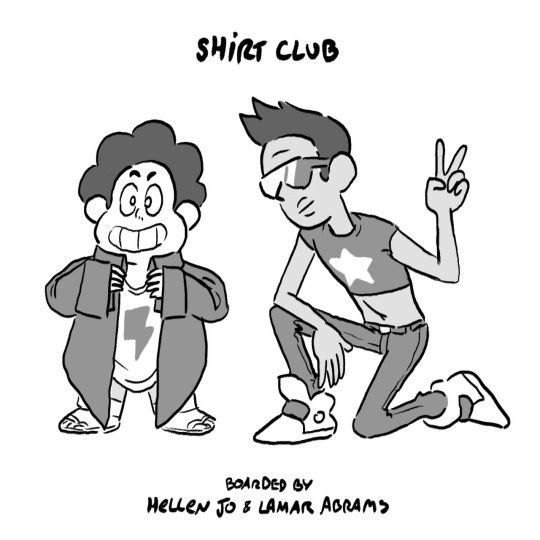
“This sounds like a very abstract problem.”
For fear of echoing Buck Dewey’s condescending assessment of Steven’s drawing, there’s just something endearing about a cartoon about making art. Animation as a medium is remarkable for how many types of artists are involved: for instance, Steven Universe exists as a collaboration between visual artists, writers, songwriters, actors, singers, composers, and instrumental musicians. It’s a crew that by necessity has a passion for art in many forms, and episodes like Shirt Club let this passion shine. (See also: James Baxter the Horse from Steven Universe’s big brother Adventure Time.)
Many of the artists behind Steven Universe have multiple roles: most famously, its storyboarders are also its scriptwriters. Some boarders even pull triple duty, like guitarist Jeff Liu and voice actor Lamar Abrams, who brings Buck to life. It’s fitting, then, that Shirt Club revolves around guitars and Buck as Steven navigates his way through the perils of publishing his art.
As sincere as this episode is, it’s also ridiculous. The final sequence of Steven as a faux assassin straight up shooting Mayor Dewey in the chest is absurd both as a situation within the show and as something that was allowed to be on the show itself, but sure enough, Steven Universe manages to give a lone gunman sniping spree an emotionally fulfilling resolution.
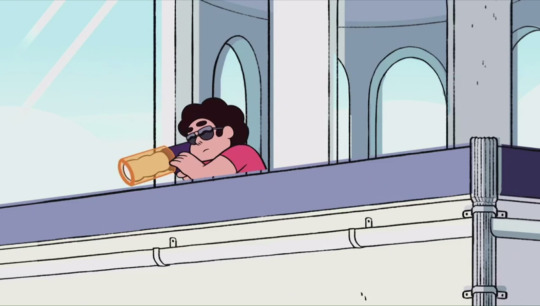
This scene proves a core lesson of the episode: just because something’s silly doesn’t mean it’s not art. Buck hits the nail on the head when praising Steven’s drawing for its sincerity and naïveté, even if he’s being a wad about it: the Guitar Dad shirt is awesome because it’s a pure expression of a kid looking up to a parent, even if that expression won’t win any medals for aesthetics (and because it won’t). Steven Universe doesn’t need to prove its artistic merits, and the episode is wise to avoid this path and devolving into meta defensiveness, but I appreciate how its structure demonstrates its message.
That Buck recognizes Guitar Dad’s merits but sees its meaning in a negative light speaks volumes about his own relationship with his father, as well as the general adolescent obsession with irony. And let’s face it, Buck is mean in this episode. The other teenagers laugh at the shirt, but don’t necessarily laugh at the subject: Sour Cream is a bit of a jerk to Greg, but Jenny seems to honestly appreciate him even if she thinks he’s funny. Lars is easily swayed, having no opinion on the shirt but seeing the value in at least pretending to appreciate it (which certainly lumps him in with real-life folks who feign an appreciation for art for impress people, if you’ll allow me an overanalysis). But Buck is cruel in a way that’s uncomfortable, but not totally out of character.
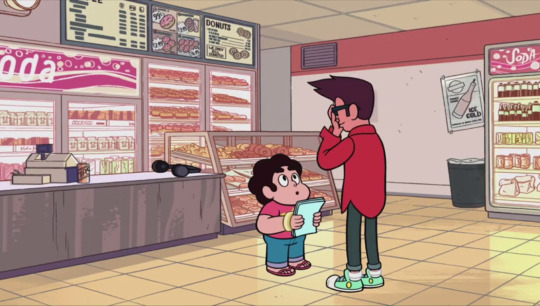
In Lars and the Cool Kids, Buck is the most enigmatic of the Cool Kids, as per his mirroring of Garnet. As he repeatedly pulls the rug out from under Lars with a straight face, it’s hard to tell how much he’s intentionally messing with the guy. The same goes for his ordering salad at the Big Donut after examining its salad-free displays. He plays it so cool in both situations (and in general) that some of it has to be an act, and he’s perceptive enough that he has to notice Lars’s barefaced need to please, but he’s such a closed book that we can’t get a read on what’s in his head.
We see more of him in Shirt Club than ever before, and while he’s always been friendly to Steven, we really don’t know him all that well. His father’s an obvious sore spot, and seems to be the only thing that can make him completely crack, whether from embarrassment or being genuinely touched (or feeling remorse or feeling more embarrassed, a tear from this guy could mean anything). It makes for a fascinating “villain” when compared to our emotionally open hero, and he’s really the only kind of antagonist an episode like Shirt Club can have.

Regardless, the fact that Buck is still somewhat out of character (he’s utterly kind to Steven everywhere else in the series) is worth noting, because this is one of the last collaborations between storyboarders Lamar Abrams and Hellen Jo before the latter left Steven Universe. While this team is responsible for some terrific episodes and my all-time favorite scene of the series (the ending of Winter Forecast), they’re also behind House Guest and Fusion Cuisine, which are essentially about evil twins pretending to be Greg and Connie.
For whatever reason, the Abrams/Jo team seems to enjoy bringing out the worst in beloved characters (or inventing negative traits out of nowhere) in ways that wildly diverge from their typical depictions. It allows for drama within a contained story, but in a way that clashes with the consistency of the series; with the exception of Island Adventure and its lesson that emotional and physical abuse is okay sometimes, these kinds of character-nuke episodes are my least favorite. Shirt Club is the best of these divergences by far, in that I can actually deduce Buck’s rationale and because he’s a mysterious character by design, but it’s still an unfortunate trend that happily gets ironed out as the show continues.
(Bear in mind that beyond letting us watch the snow fall, Abrams co-boarded The Answer and Chille Tid and When It Rains, and while it may be a coincidence that each contains a breathtaking scene of a character coming to grips with a scary new environment, I tend to think that he’s really good at framing them. He’s also the only boarder to work on every Onion episode; even if Onion Gang is a dud, Onion as a character certainly isn’t, and I get the feeling we mostly have Abrams to thank for that. I want to give no impressions that this isn’t a brilliant animator.)
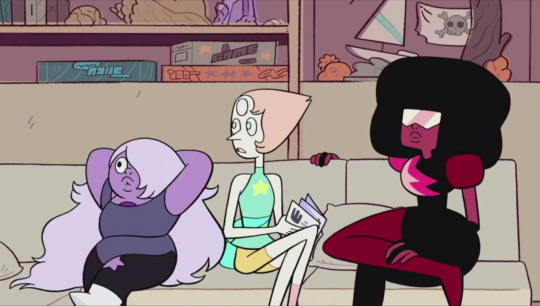
Mayor Dewey and the Crystal Gems are here for comic relief, and oh boy do they deliver. Jo and Abrams are brilliant at giving the Gems incongruous background tasks: in Watermelon Steven it’s reading the paper, and here it seems to be assembling IKEA furniture. Their criticisms of Steven’s art and unwillingness to help his strange problem highlight Shirt Club’s casual tone, and they get little moments of self-parody without dipping too deep into meta humor: Garnet’s twinkling shades during a pregnant pause certainly counts, but Amethyst and Pearl’s escalating concerns about Steven’s shirt problem takes the cake.
Mayor Dewey is incredibly, but not unbelievably, lame. Between his outdated slang and his blatant desire to connect with youths (without putting in any actual effort) it’s easy to see Buck’s disdain. Bill’s speech about losing his speech is overshadowed by Steven setting up his sniping position, but is worth paying attention to for Joel Hodgson’s masterful meandering.
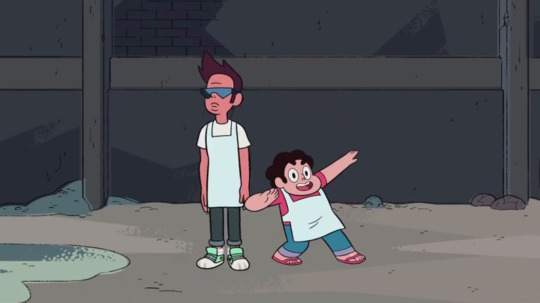
And despite his selfish and thoughtless intentions, actually seeing Buck and Steven making shirts is a bunch of fun. It evokes Steven and Greg’s adventures in rocket science from Space Race, but with the wrinkle of Buck demonstrating actual knowledge of the craft to contrast with Steven’s silliness. While the distribution and interpretation of art once it’s complete makes up the episode’s conflict, the creation process itself is joyful and pure, as it should be for a kid making art.
Buck comes around at the end, of course, apologizing to Steven and offering to take guitar lessons. But honestly, the nicer he is to Steven, the weirder his behavior here seems, whether or not he’s a mysterious guy. The best thing I can say about Abrams/Jo character-nuke episodes is that there’s only three of them, and finishing Shirt Club, from that lens, is a huge sigh of relief.
Future Vision!
The Good Lars not only shows Buck wearing the Guitar Dad shirt, but showing off what he’s learned! And he’ll continue to play guitar as one of Sadie Killer’s Suspects, a band that will eventually be managed by Greg himself.
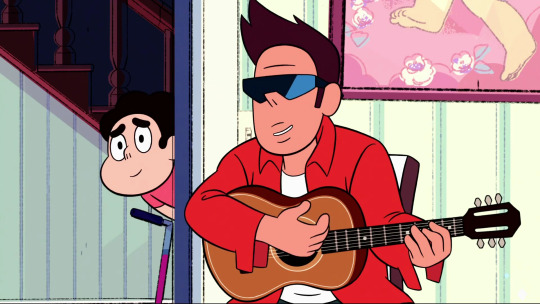
I guess you could read it that way…
On the one hand, watching this after Joy Ride makes Buck’s cruelty even stranger. But on the other, getting to know him better there, and Bill better in Political Power, makes an examination of their relationship a nice coda.
Tonally, Shirt Club simply doesn’t fit where it’s intended to go. Open Book and Story for Steven at least have their dramatic moments that fit the simmering tension of post-Marble Madness Season 1, but Shirt Club’s lightness thoroughly deflates the momentum. The Gems casually building furniture makes no sense in this time period, and Pearl and Amethyst’s list of fears don’t even hint at them worrying about Homeworld.
Still, the reordering leaves us with pre-Jailbreak Garnet, which is a little confusing without context. (I certainly prioritize this minor continuity error lower than harming dramatic tension.)
Regardless of your opinions about the order shift, I’m happy to say that Shirt Club is the last of it! No more asterisks!
We’re the one, we’re the ONE! TWO! THREE! FOUR!
Buck’s strange meanness doesn’t tank Shirt Club down to the bottom, but it does make me less inclined to rewatch what’s an otherwise wonderful episode about art. It’s a shame, but there’s still a lot to love when you get shirt!
Top Fifteen
Steven and the Stevens
Mirror Gem
Lion 3: Straight to Video
Alone Together
The Return
Jailbreak
Rose’s Scabbard
Coach Steven
Giant Woman
Winter Forecast
On the Run
Warp Tour
Maximum Capacity
The Test
Ocean Gem
Love ‘em
Laser Light Cannon
Bubble Buddies
Tiger Millionaire
Lion 2: The Movie
Rose’s Room
An Indirect Kiss
Space Race
Garnet’s Universe
Future Vision
Marble Madness
Political Power
Full Disclosure
Joy Ride
Like ‘em
Gem Glow
Frybo
Arcade Mania
So Many Birthdays
Lars and the Cool Kids
Onion Trade
Steven the Sword Fighter
Beach Party
Monster Buddies
Keep Beach City Weird
Watermelon Steven
The Message
Open Book
Story for Steven
Shirt Club
Enh
Cheeseburger Backpack
Together Breakfast
Cat Fingers
Serious Steven
Steven’s Lion
Joking Victim
Secret Team
Say Uncle
No Thanks!
4. Horror Club 3. Fusion Cuisine 2. House Guest 1. Island Adventure
24 notes
·
View notes